EAST RUTHERFORD, N.J. – Dabs' Digest, Giants.com's weekly conversation with head coach Brian Daboll:
Q: You are about to begin your 24th season in the NFL and 28th year in a row as a coach. Does opening day still get you juiced up? Is it a special time for you?
Daboll: "Absolutely. You work extremely hard all offseason to try to build your team. You go through a lot of practices, a lot of meetings, and everything is for the regular season. Opening games are always, always pretty cool to be part of. There's a lot of energy. There's the unknown. You really have to fall back on all the things that you've worked on in OTAs, training camp, the fundamentals, the techniques, because you really don't know exactly what the other team is going to do. And I'd say, it's probably similar for the first few weeks of the season until teams start declaring and you've got to fall back on your rules. But I think everybody's excited to start."
Q: As a coach, do you have a sense of how your team is going to play, or is it a mystery entering the first game?
Daboll: "I'd say that's the early part of the season. Some of my mentors, they always said that it takes, I'd say, the first month of the season to really figure out exactly what you are and what other teams are. There are constant adjustments, but you have to play the right way in terms of effort and toughness, and you have to rely on your fundamentals, and you have to communicate well, and you have to solve problems, whether it be the first quarter, the third quarter, to make sure that everybody's on the same page and you give yourself the best chance."
Q: Another element to that is this is a pretty young team with only six players 30 and over. In terms of establishing team identity, will that take time because it's such a young team?
Daboll: "Well, you talk about team identity all the time in meetings, so there's a certain way and standard that we want to play with in terms of our effort and our discipline to execute on a consistent basis. But when you're dealing with young players, or I would say even older players, there's a lot of ups and downs to an NFL season. Could be Week 1, it could be Week 4. You'd like to have no downs in an NFL season. But the fact of the matter is the teams that have made the playoffs that weren't division winners have lost an average of seven and a half games a season. So, there's adversity and we did (make the playoffs with a 9-7-1- record) our first year here. There's adversity throughout the entire season. And the way you deal with that and how you handle that is critical. And that's with everybody. You rely on the leaders of your football team."
Q: Your entire six-man draft class will likely have a chance to contribute on Sunday. What can you say about them as a group regarding their work ethic and how they've approached their jobs?
Daboll: "They've done everything we've asked them to do. Now, they'll determine their roles. I mean, again, that's the early part of the season. They go out there and they play, then they're going to have mistakes just like everybody is. And you correct them, and you see how they respond to them. And they're going to continue to need to prove that they can do it down in and down out. But their mindset, their preparation, their work ethic, their commitment, the way they interact with their teammates, I've been pleased with all the rookies."
Q: Do you say to them before the first game, "You've played football your whole life. This is still football?"
Daboll: "We talked about that before the first preseason game. I think we're past that stage. They understand it's football. And the biggest thing for them is to understand what they need to do each down, to know their responsibility, communicate well and be able to move on to the next play, regardless of what the play before was, good or bad."
View photos from practice at the Quest Diagnostics Training Center as the Giants embark on their 100th season.
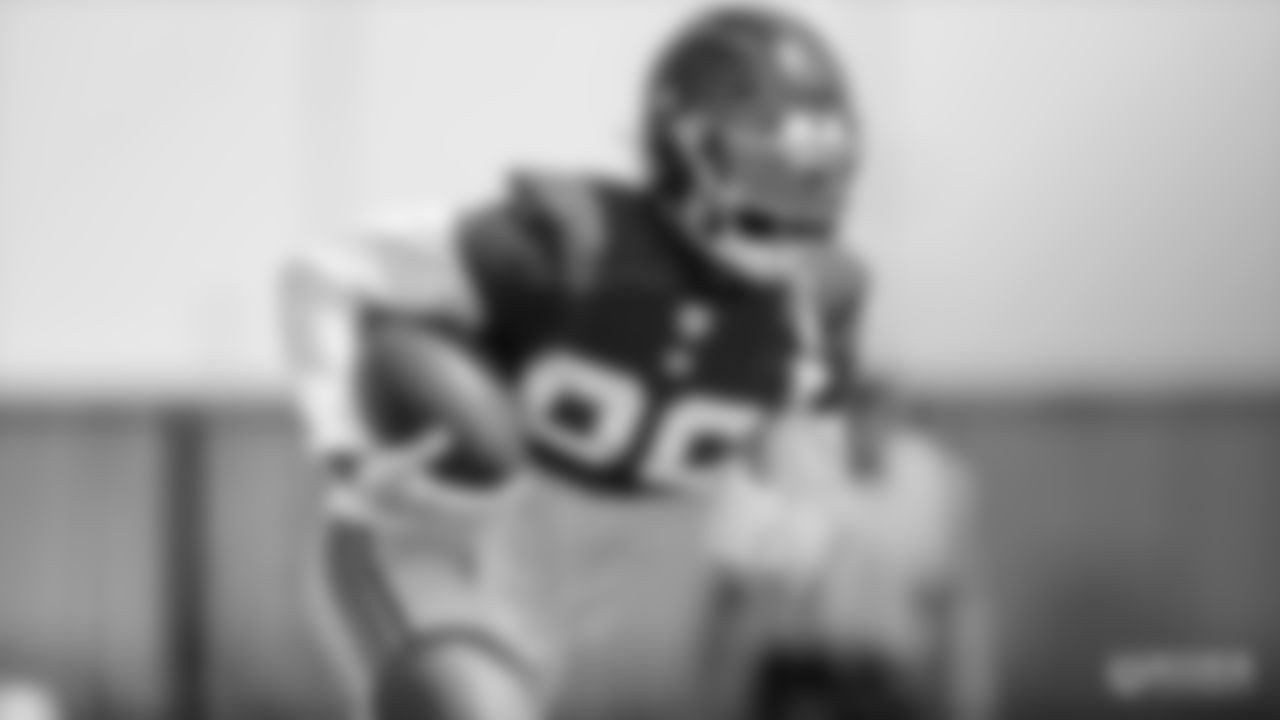

WR Malik Nabers (1)

CB Deonte Banks (3)

WR Wan'Dale Robinson (17)
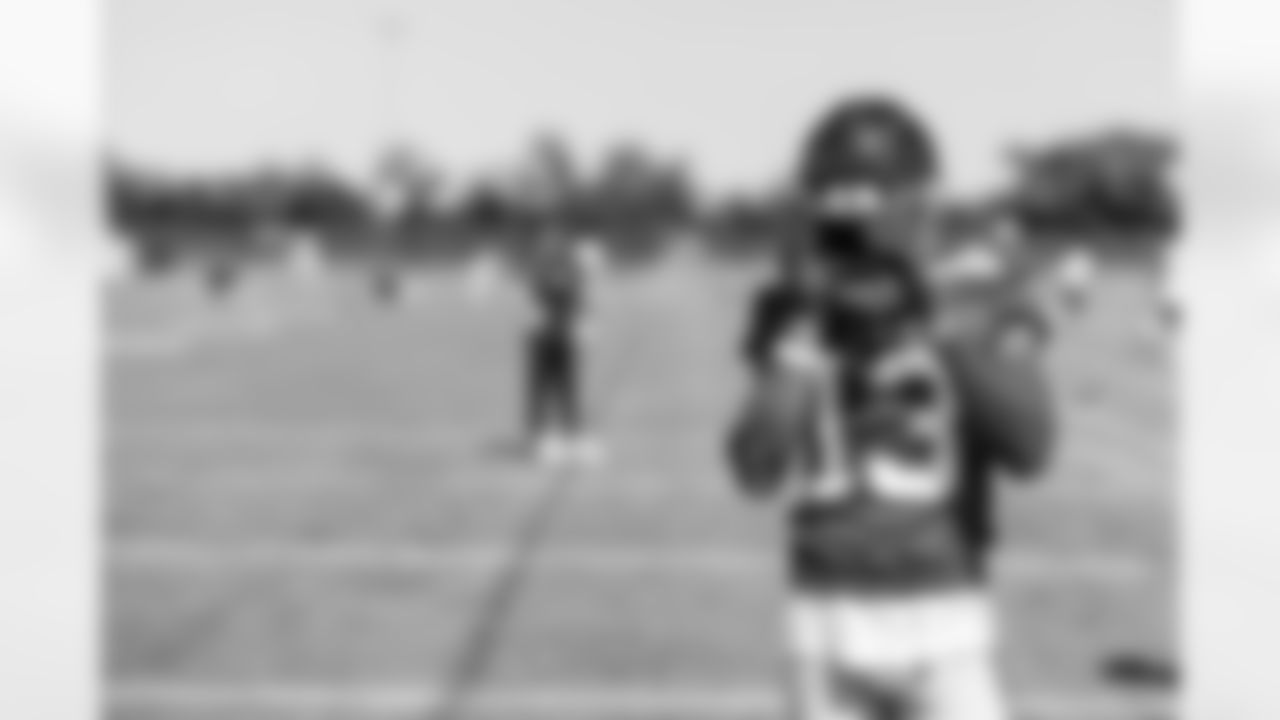
WR Jalin Hyatt (13)
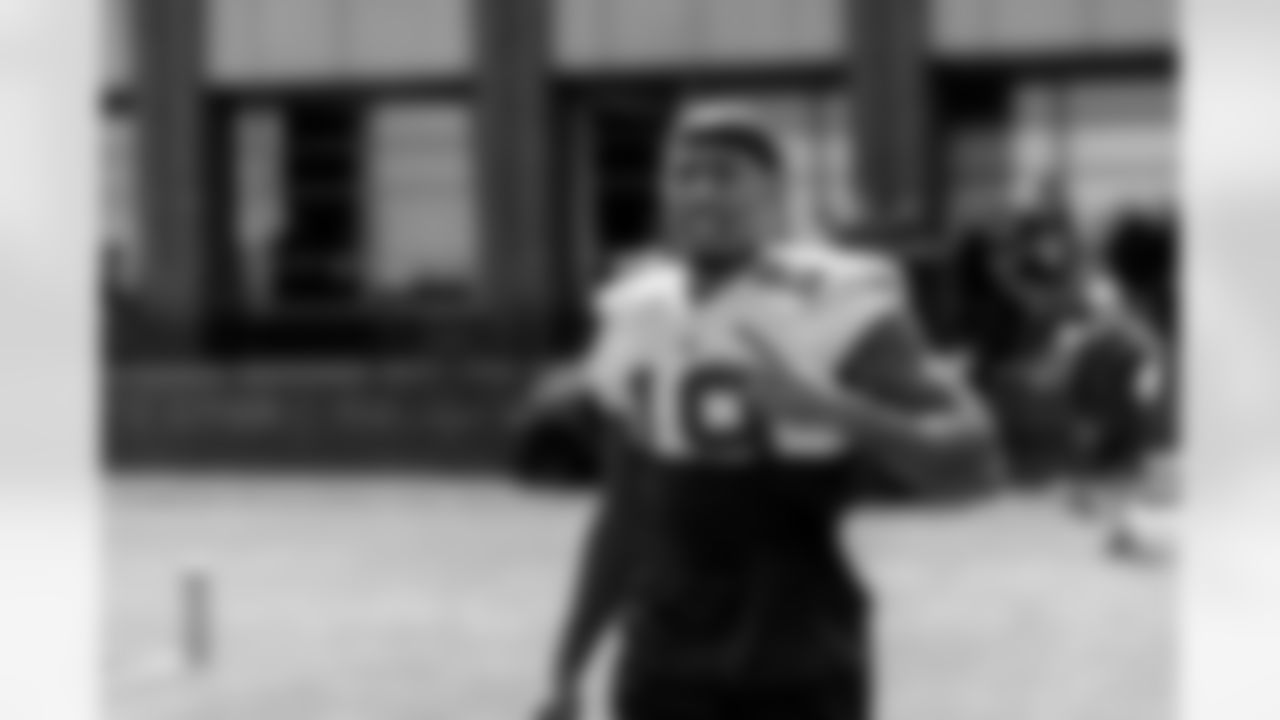
S/ILB Isaiah Simmons (19)

Mike Kafka Assistant Head Coach/Offensive Coordinator, RB Tyrone Tracy (29)

CB Deonte Banks (3)

RB Devin Singletary (26)

WR Malik Nabers (1)


S/ILB Isaiah Simmons (19)

RB Eric Gray (20)

CB Adoree' Jackson (21)

WR Jalin Hyatt (13)
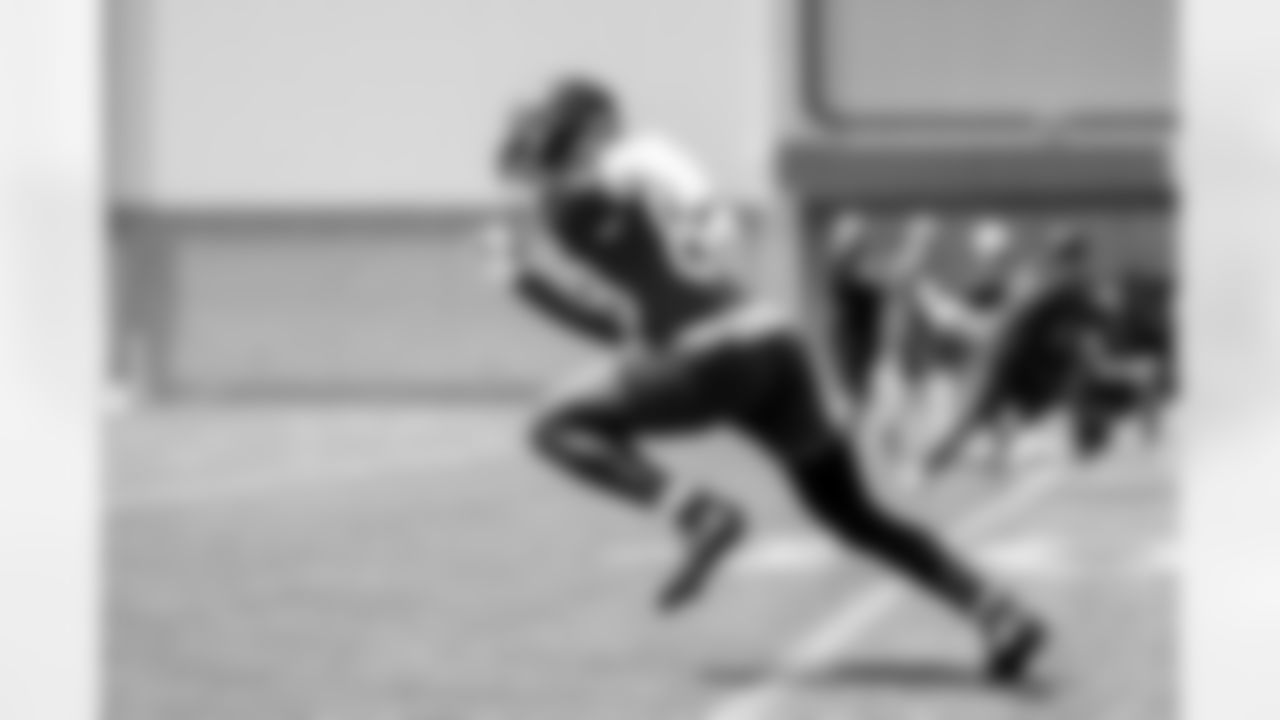
WR Bryce Ford-Wheaton (88)

CB Adoree' Jackson (21)

WR Wan'Dale Robinson (17)

CB Nick McCloud (44)

WR Bryce Ford-Wheaton (88)
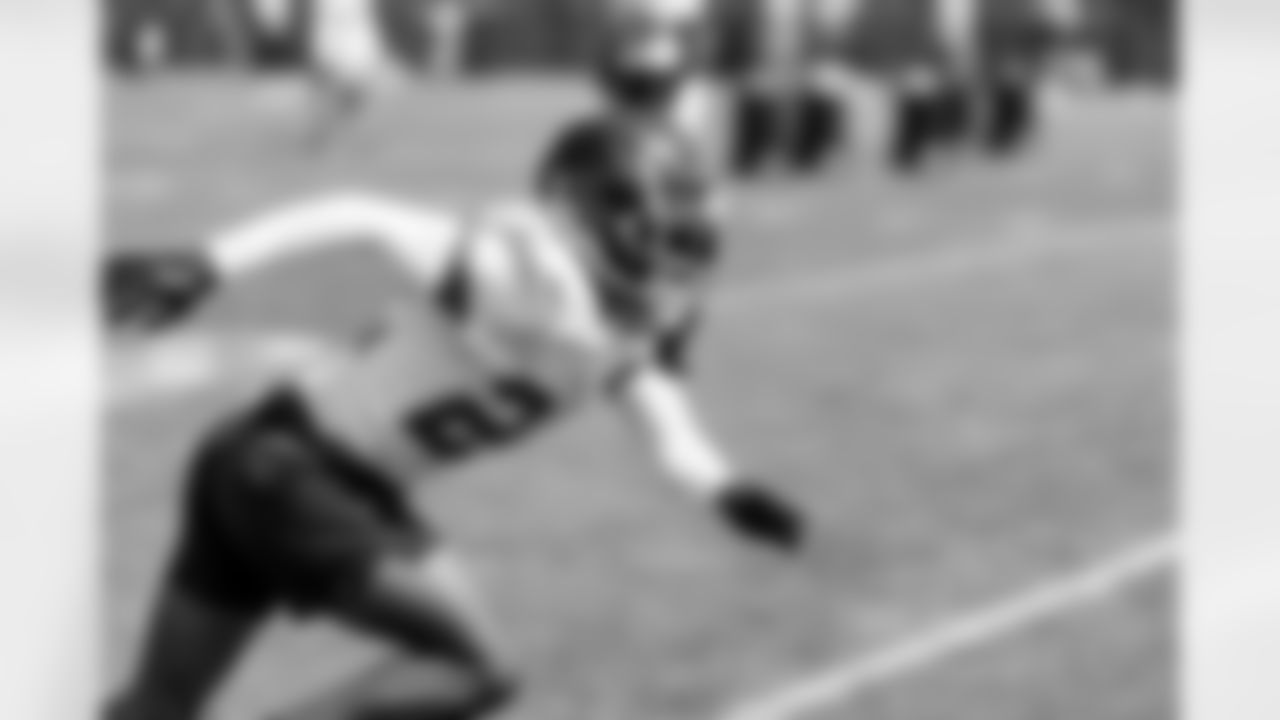
CB Dru Phillips (22)

CB Deonte Banks (3)

WR Darius Slayton (86)

CB Tre Hawkins III (37)

CB Deonte Banks (3)

RB Tyrone Tracy (29)
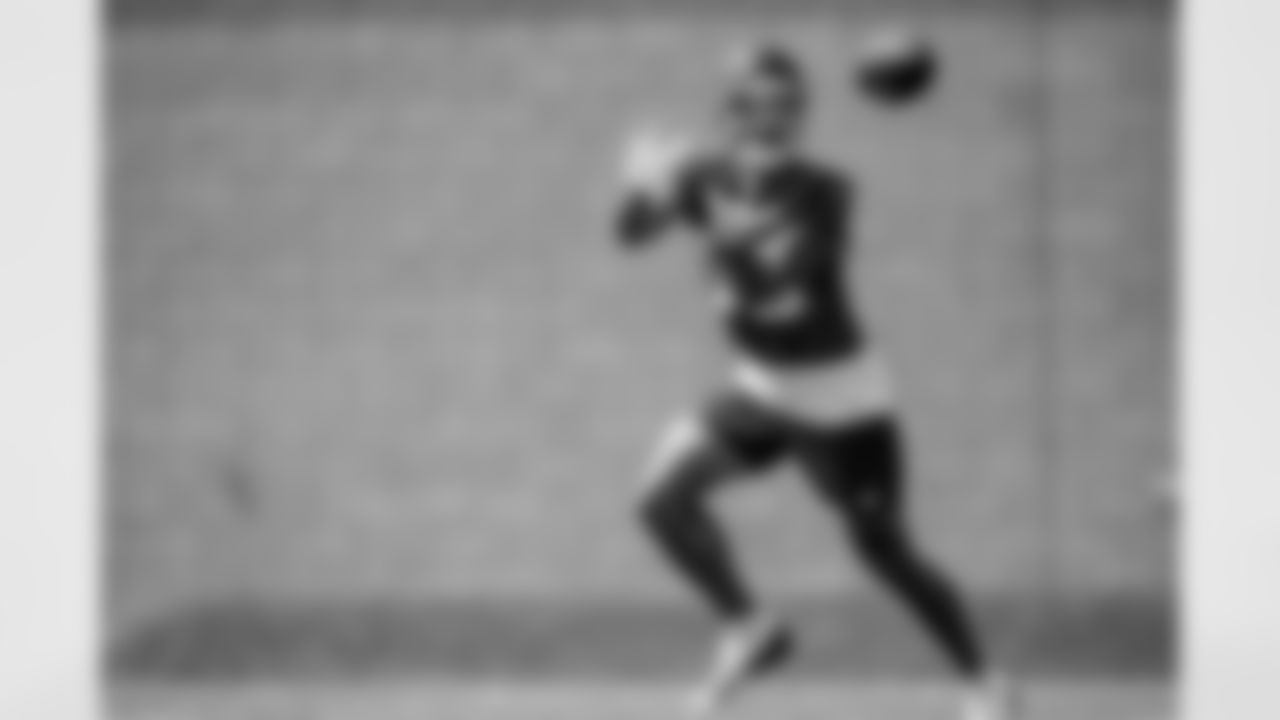
WR Isaiah Hodgins (18)

CB Deonte Banks (3)

CB Art Green (35)
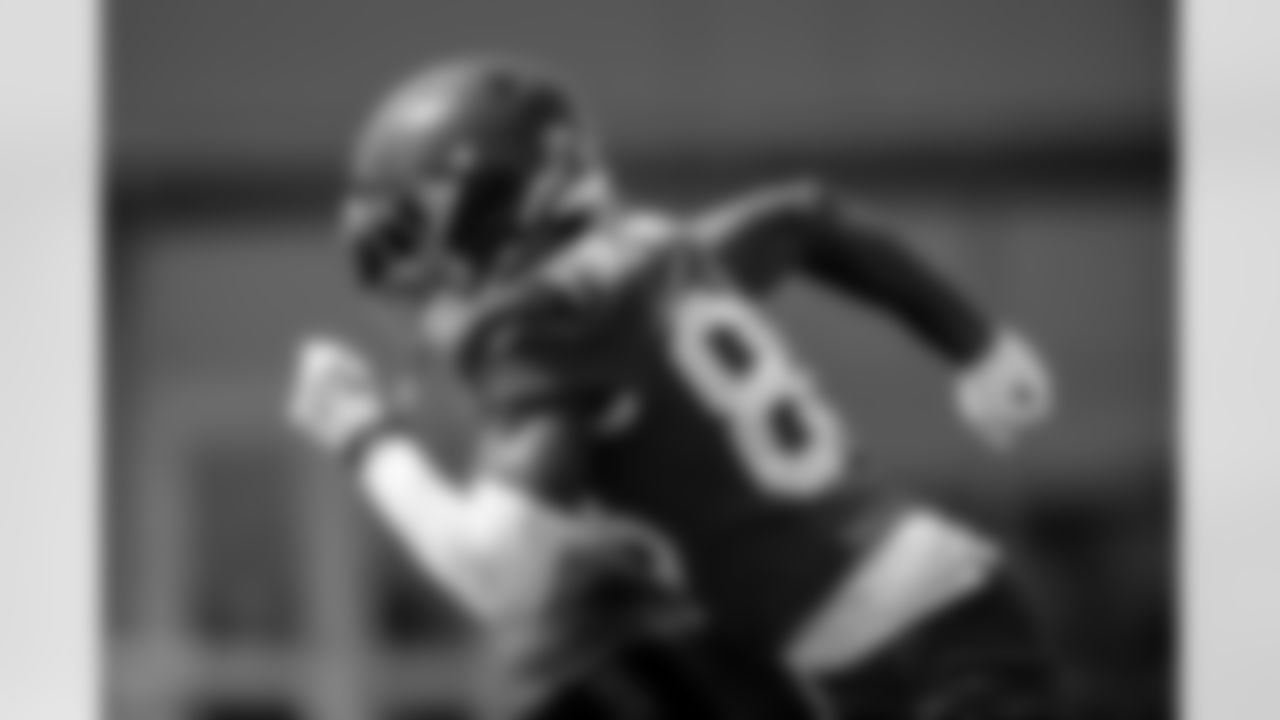
WR Bryce Ford-Wheaton (88)

CB Cor'Dale Flott (28)

WR Darius Slayton (86)
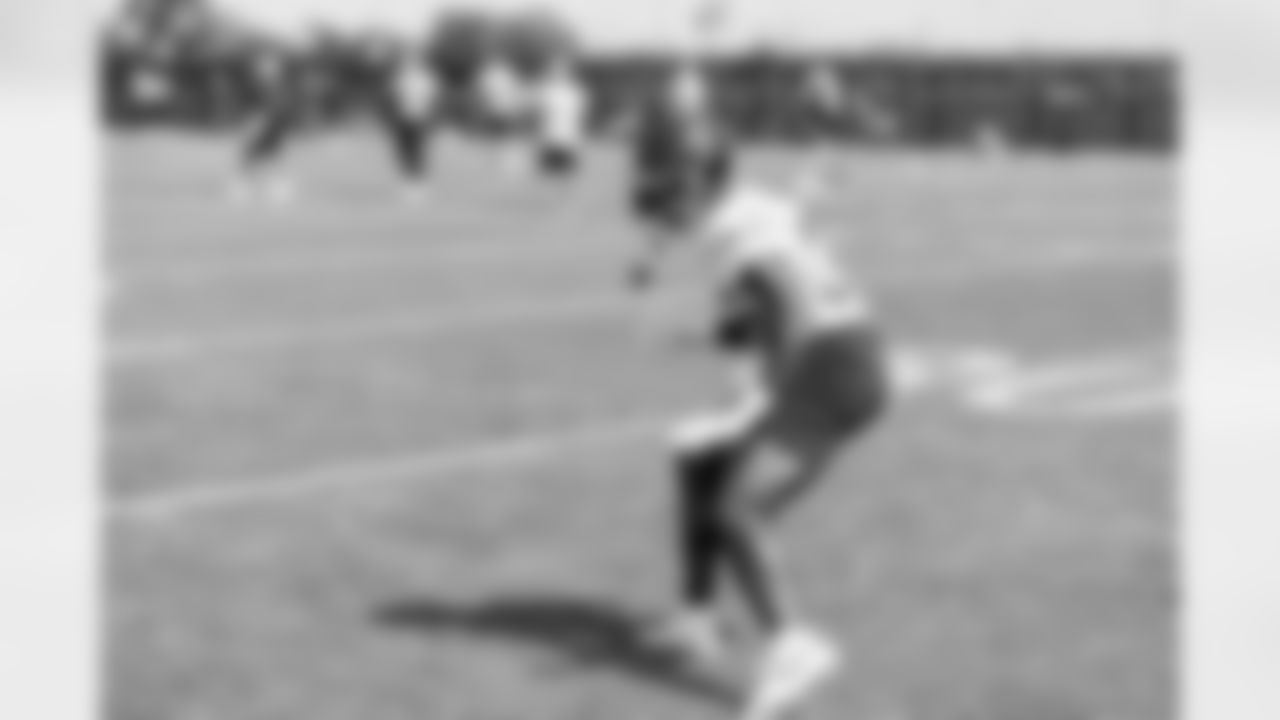
DB Art Green (35)

WR Wan'Dale Robinson (17)

WR Darius Slayton (86)

CB Deonte Banks (3)

WR Malik Nabers (1)


TE Theo Johnson (84)

OLB Kayvon Thibodeaux (5)

CB Nick McCloud (44)


RB Eric Gray (20)
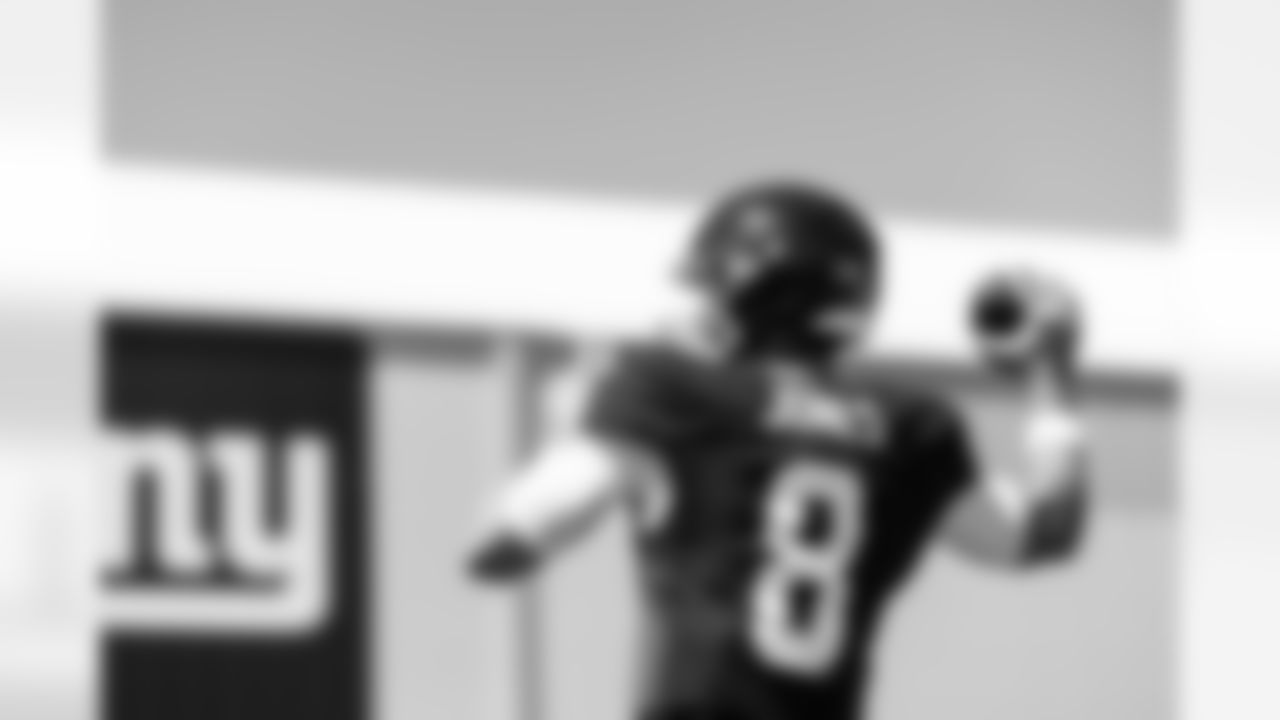
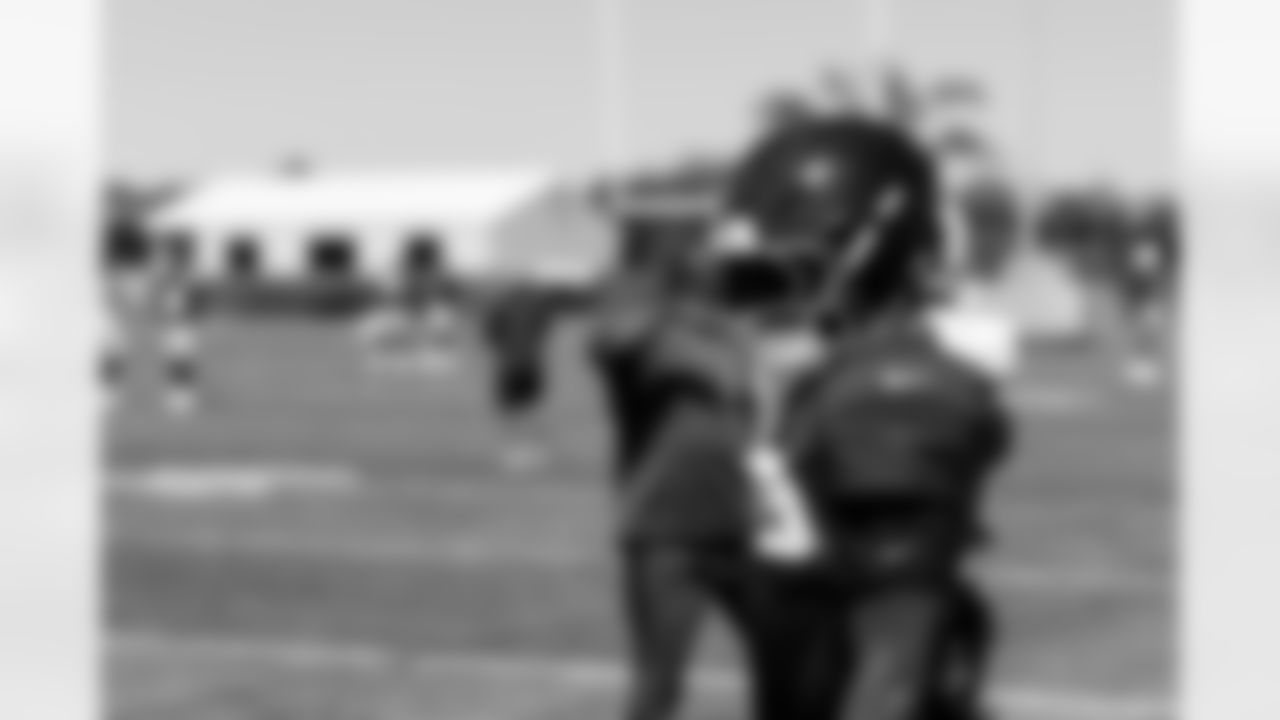
RB Eric Gray (20)

CB Nick McCloud (44)

TE Theo Johnson (84)
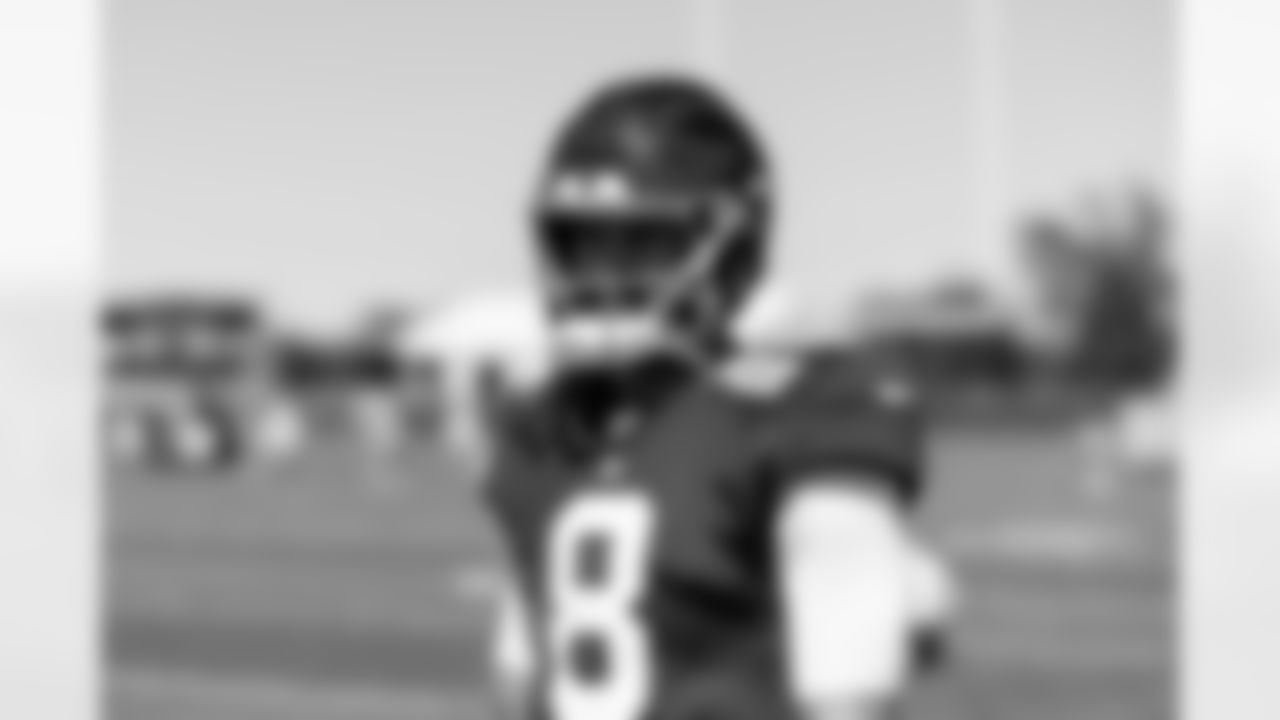
QB Daniel Jones (8)

OLB Azeez Ojulari (51)

QB Drew Lock (2)

CB Nick McCloud (44)
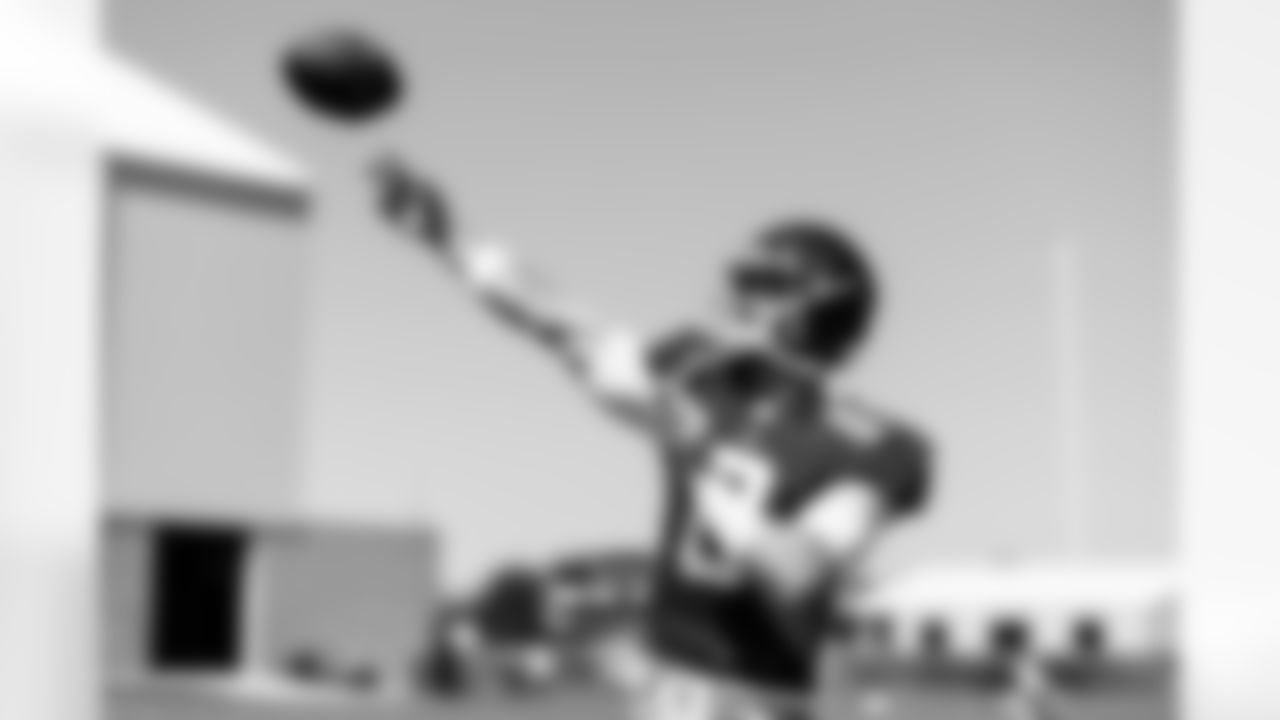
QB Daniel Jones (8)


TE Theo Johnson (84)

QB Daniel Jones (8)
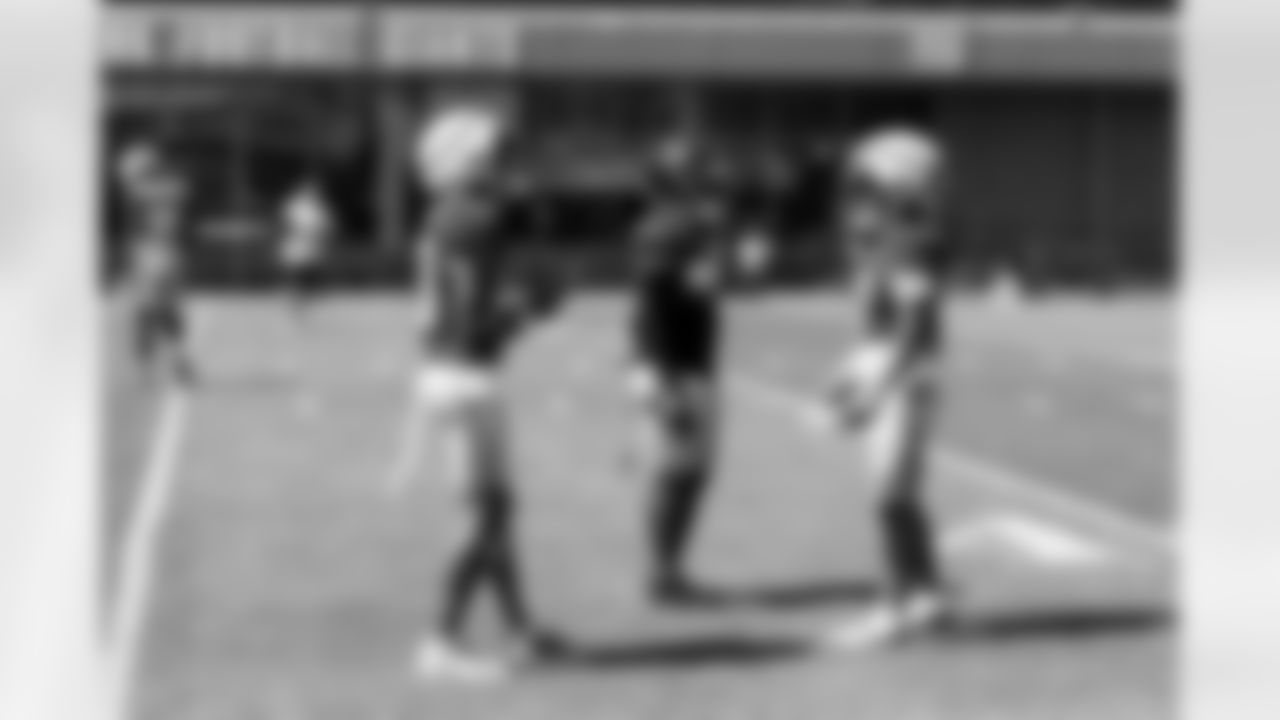
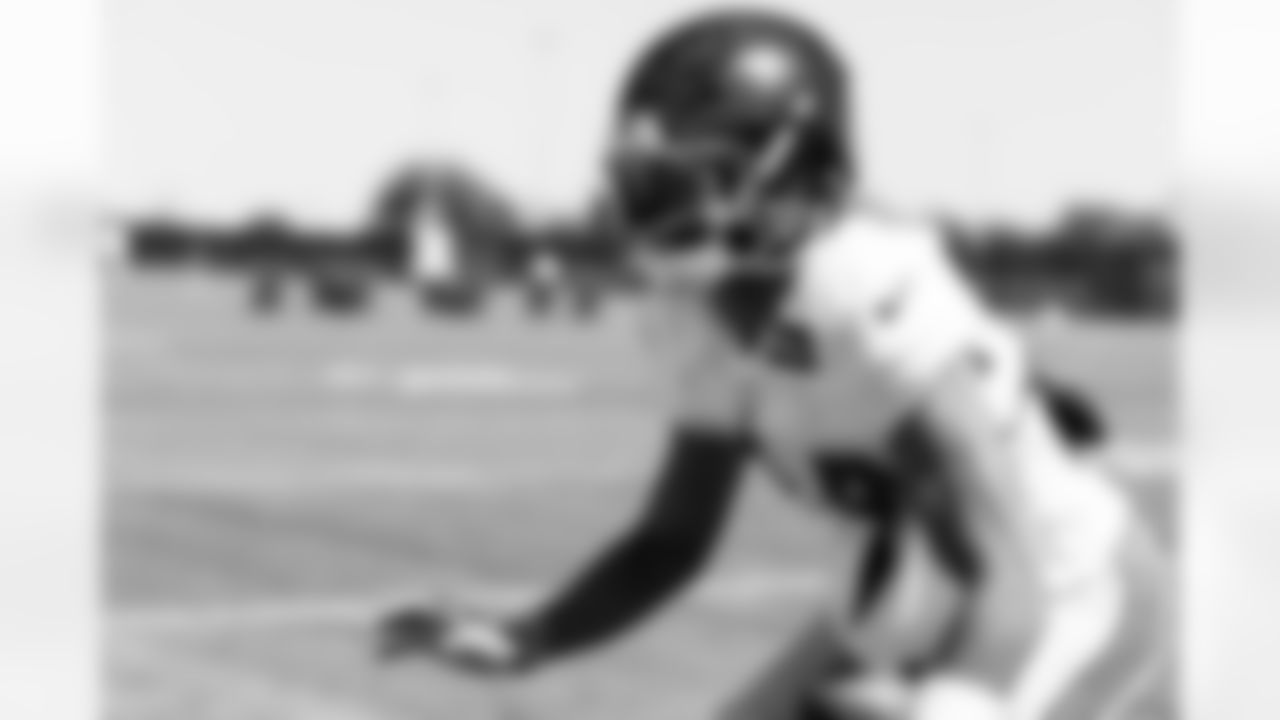
CB Nick McCloud (44)

QB Daniel Jones (8)

OLB Azeez Ojulari (51)


CB Nick McCloud (44)
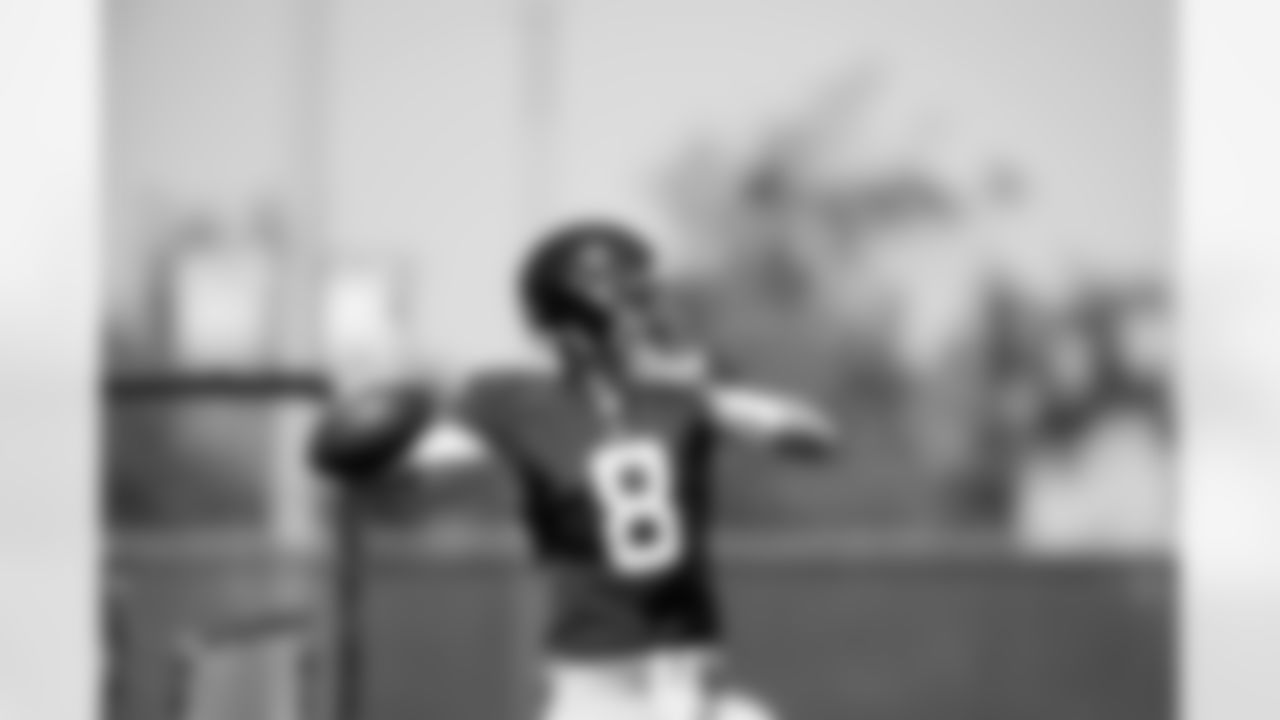
QB Daniel Jones (8)

QB Daniel Jones (8)

CB Nick McCloud (44)


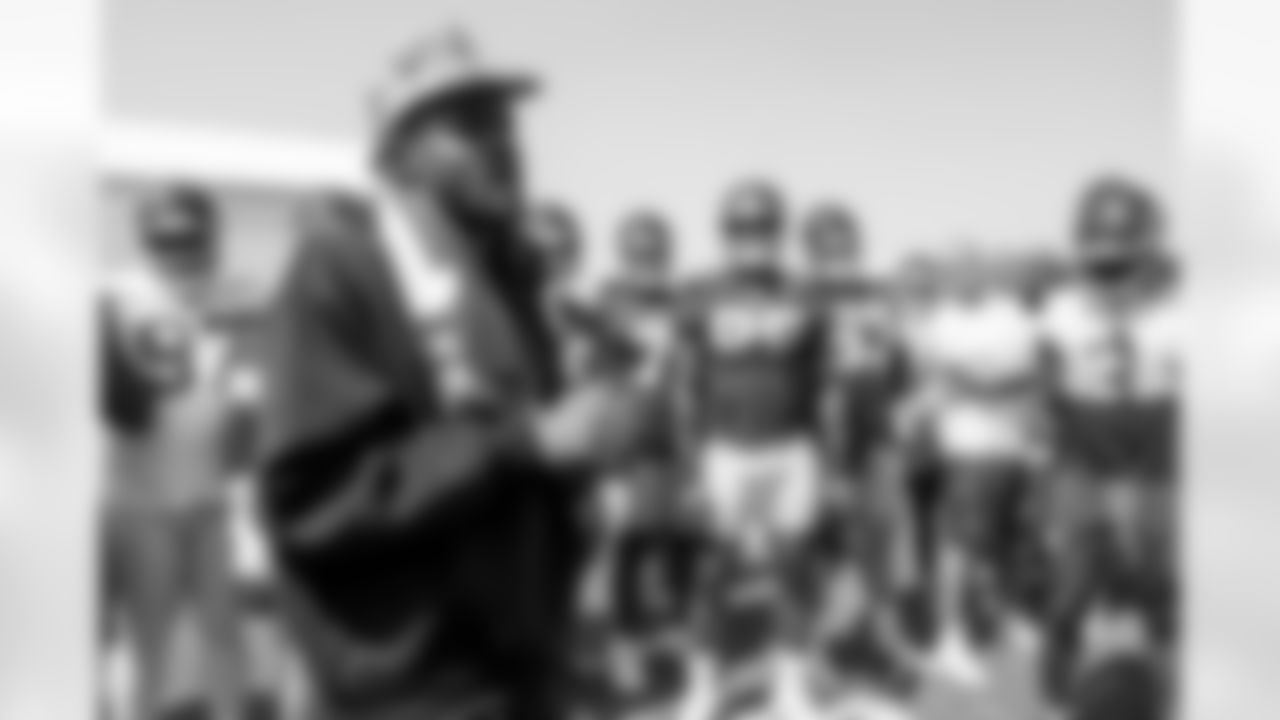

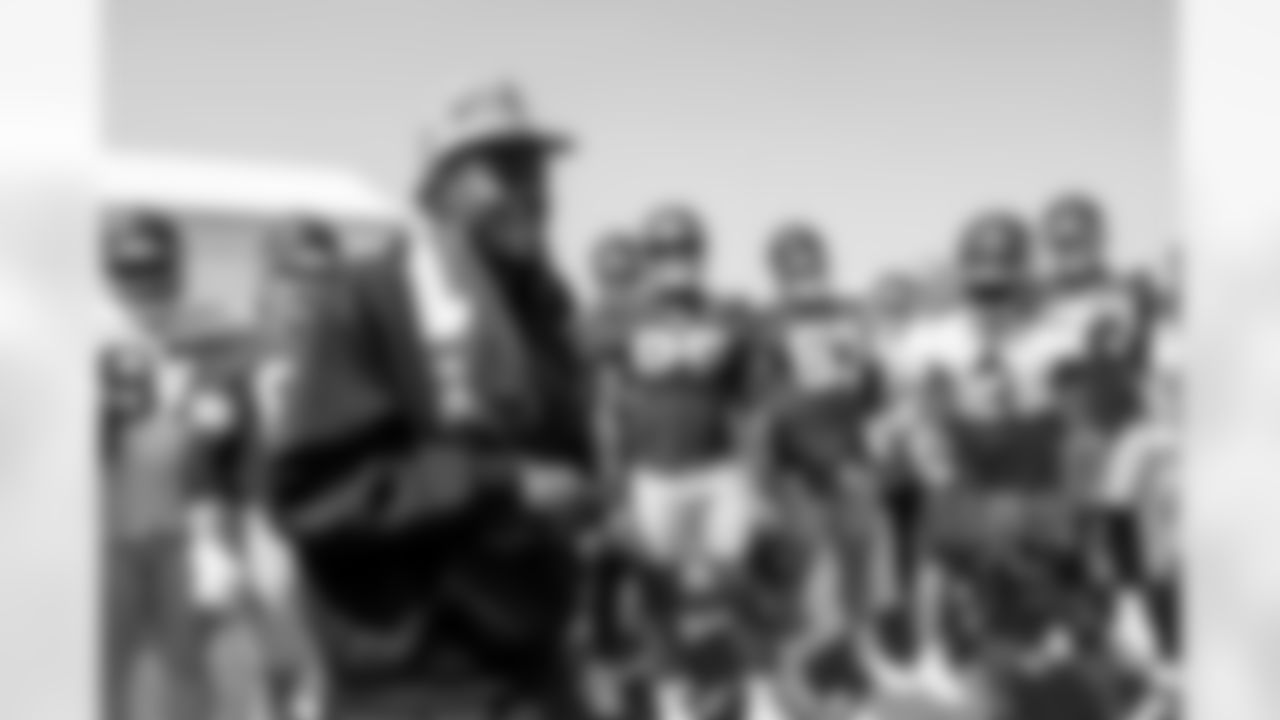










Q: During our first meeting two years ago, I asked you what you would say to the team the night before the game. You said the closer you get to the game, the less the coach needs to talk. Do you still adhere to that?
Daboll: "I do. I think you're constantly teaching, communicating, making adjustments throughout the week. When you get toward the end of the week, you trust your preparation and all the work that you've put in. And then you trust the players. That's what practice is for. Practice isn't just to go out there and run around, and it's (not) a punishment or any form of that. It's to make sure that you do things at a high level in practice. So, when you get to a game, you have a comfort level with trusting yourself to do those things. Again, the looks that you get in practice, I would say you have a 10-play period of offense or defensive plays. And the play that you practice against or the defense you practice against, that rarely comes up. You can study all the tendencies and statistics and all those things, but you might hit one or two in a game where, 'Boy, that's exactly how we practiced it.' Rarely do you hit it the exact same way, but it's for the timing and the rhythm of the quarterback in the passing game with the receivers, the trust with the running back and the timing of the offensive line blocks, the technique of the double teams, the press man coverage that you play, the communication that takes place versus whatever type of offensive set you get."
Q: How many plays are on your typical call sheet for a game? Is there a typical number?
Daboll: "No, it just depends week to week on what we're doing offensively, what they do defensively. There's been a wide variety of numbers. There's not one set number."
Q: And how many do you typically use in the game?
Daboll: "It depends on the game. Sometimes there are repeats, sometimes there aren't repeats. Sometimes you're playing it in one personnel group and they're causing issues in that personnel group, and you've got to switch to another personnel group. Those are the adjustments that you make. The plays that you practice, you have confidence in those plays. It's, 'What are they doing?' How you combat what they do relative to their personnel grouping and what they're putting in there versus what personnel group you're putting in there. You have your ideas on down and distances and things like that, what you want to call. But the things that happen or, 'Hey, I prepared for a big zone team, and it was all man to man' or 'We prepared for a big pressure team, and they really dropped a bunch of guys. Or they move this guy over here, so now we want to double team this guy relative to this guy. Those are the conversations that take place during the game."
Q: As a play caller, there's a time pressure to make the play call. You have that clock running and the communication goes off at 15 seconds (on the play clock). So, is practice also for you as far as getting those plays in quickly?
Daboll: "The periods that you script the night before, you want to make sure you're getting certain looks against what you are calling on offense. There's other periods that we do, that's really in training camp where you're going against the defense and they're unscripted periods, and you're calling it quickly, getting it to the quarterback as quick as you can.
"But that's the goal all the time is to make sure you're always thinking as a play caller. You call the play, and you have a vision of how that play is going to go and where the ball potentially has a chance to go to. What are the odds of what the situation is going to be on the next play? And I'd say that you have a good idea. You call something on first-and-10. You're thinking, 'This is a quick possession pass, probably going to be somewhere around five to seven yards.' You got your second-and-three to five call ready to go. Oh, there's a false start. It goes back. Now you have to switch your thinking real quick. Or there's a sack or it hits for 30, a catch and run. And now you're back to first-and-10. So, it's the situations that come up in a game that are different than the probable outcome of the play that you've got to be on top of and get out quickly. Again, you hit a 35-yard play. You're in a different field position in a different area of the field. There's a holding penalty. Now you're backed up 10 more yards. You're backed up at the -18 (yard line) instead of being at the 40-yard line. Those are all things that happen quickly, and you've got to make quick decisions."
Q: You've been asked so much about (quarterback) Daniel (Jones') comeback from an ACL. (Wide receiver) Bryce Ford-Wheaton returned from the same injury. He seemed to be in the building every day in the offseason. It's fair to say he was an underdog coming into camp, but he made the roster.
Daboll: "We have good guys that care about football, that it's important to get back out there and do everything they can do. And Bryce is one of them. He's much like Daniel. Basically, they lived here in the offseason to rehab and make sure that they put themselves in the best position. And Bryce plays a different position than quarterback, he's a receiver and a special teams player that has to run a lot and cut and do things. He's worked extremely hard to get back. And he earned his spot."
Q: You're playing Minnesota Sunday. Many of the Vikings - (wide receiver) Justin Jefferson, (safety) Harrison Smith, (running back) Aaron Jones, (outside linebackers) Jonathan Greenard and Andrew Van Ginkel - played no snaps in the preseason, which is becoming more and more common. How does that affect your preparation for the first game?
Daboll: "Those are things you do in the offseason when they acquire players. Again, you can look at the strengths and weaknesses of each individual player that you're playing, and you have to go back. And whether it's Houston tape or Miami tape, Green Bay tape and New York Jets, Carolina, San Francisco, you go back and look at that. There's a point in the opening part of the season where you can end up watching too much, where you're just, 'We've done a lot of work in the offseason. We've done a lot of work here the past week and a half,' and as it gets closer to the game, you kind of gear down to really what you have to do, whether it's on offense, defense and the kicking game. And again, that's going back to the communication process, trusting your fundamentals, everybody being on the same page, overcoming a bad play, staying even keel with a good play. Those are the things that are important, playing with the right relentless attitude and effort that you need play in and play out. That's most important. But, looking at (cornerback Stephon) Gilmore, looking at Greenard, looking at (outside linebacker) Dallas Turner at Alabama, and he played some of the preseason. But those are things you do during the offseason and get your tapes ready so you can go through it with the players."
Q: Does the fact that most starters play little or not at all in the preseason make Week 1 more unpredictable?
Daboll: "I think Week 1 is always unpredictable. All the years that I've done it, there's always been some – we've come out Week 1 and thrown it something like 20 times in a row, empty (backfield). I don't think the other team thought you were going to do that, or other teams come out and you think they're going to drop people and they blitz a lot. Or some people come out in a different personnel group that you haven't seen. That's why OTAs and training camp are so important. That's why you move people around so they can get a wide variety of looks because in the early part of the season, not just Week 1, but I'd say Week 2 and Week 3, when teams are still kind of figuring things out. It comes down to taking care of the ball, not giving the ball up, playing good field position, playing good situational football, trying to get off to a fast start, tackling well, blocking well, catching well, throwing well, run after catch. The things that really matter and they matter every game. But I'd say they're significant in the early part of the season. Guys that haven't been hit 15, 20 times a game, taking care of the ball, maneuvering in the pocket. That's why we did so much team work (in training camp). That's the early part of the season. It's the first game."
Q: If you or I were throwing to him, Justin Jefferson would probably be a great receiver. When you watch him on film, what jumps out about him to you?
Daboll: "Everything. He's a complete receiver. You can line him up in any position you want to. He can run any route. You can have him doubled and he's still getting the ball. He's exceptional at what he does. Smart, instinctive, excellent hands. You can run him on any route, throw to him in double coverage if you need to. I mean, everybody talks about the tight ends being the security blanket for a quarterback. Good receivers or good tight end receivers, those are security blankets for quarterbacks. When you can throw it to a guy and it doesn't matter if he's covered or not, you have a confidence that he's going to come down with the ball."
Q: Defensively, they've re-done all their edge rushers.
Daboll: "They've re-done everything defensively since the last time we saw them (two years ago). They're a completely different defense. They do a great job of taking the ball away, particularly getting it off the runners. They line up in multiple fronts. They're a pressure team. Flo (defensive coordinator Brian Flores) has done a really good job there. I've known Flo for a long time. He's a very good football mind. And they've got some veteran players that know how to play a scheme. They're in another year of it, so that helps. But playing a team like this defensively in the early part of the season – there's unknowns when you play them in the eighth week of the season based on how they game plan. I don't want to speak for them. The way Flo's grown up in the business, we've worked together for a long time and they're a game plan team. So, you're playing them in Week 8, you really don't know what you're going to get. So, Week 1 you just have all this tape to look at from last season, the 17 games and the three preseason games. There's 20 games right there. And again, we've competed against one another when he's called games. He's been a head coach at Miami. We have a lot of tape to look at. You get to a point where you've watched so much of it you say, 'Okay, let's focus on us.'"
Q: Is there anything you can do when you face a rookie kicker (Will Reichard, a sixth-round draft choice from Alabama) in his first game to get in his head? Or does he have too much big game experience?
Daboll: "Look where he went to school. Alabama. Doesn't get much bigger than that. And he was very productive there. Historically productive. We have to focus on what we do well. And then for a young kicker, it's his first game out, but it's not like he hasn't played in many big games or in big venues or big crowds. He's a good player."
View photos from the early years of the New York Giants during the Polo Grounds era.
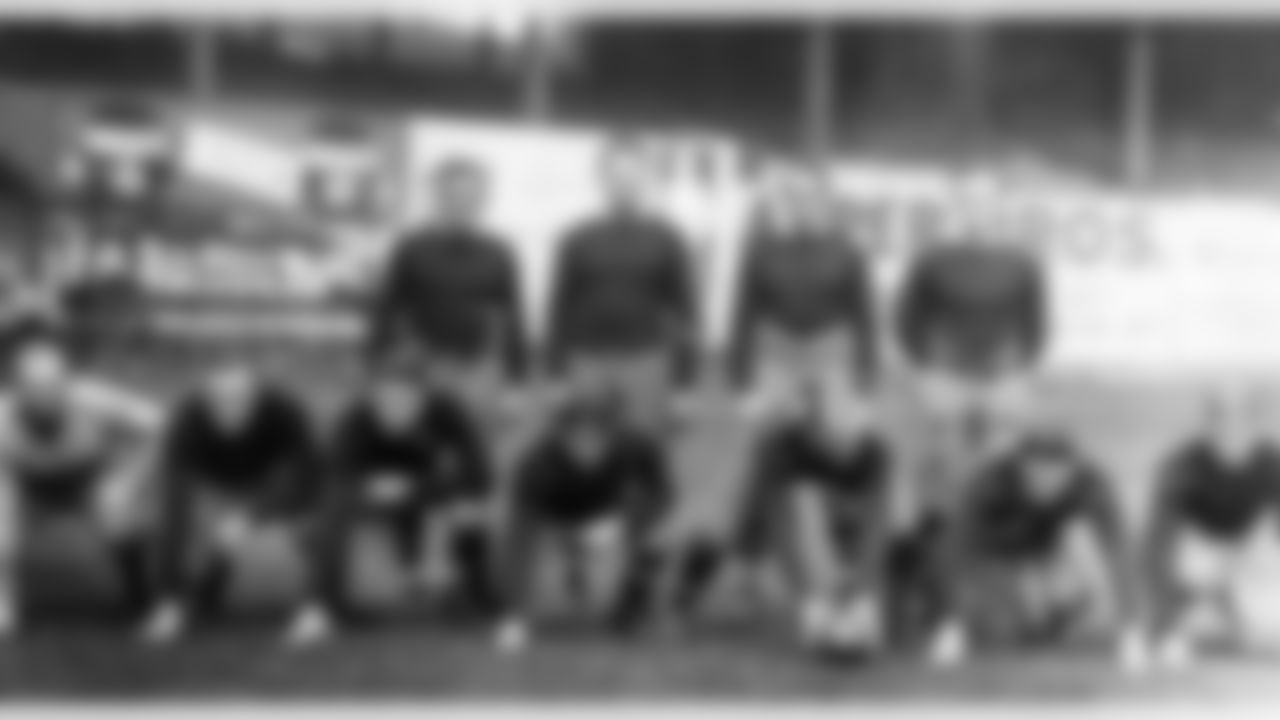
Some members of the 1925 New York Giants pose for a photo at the Polo Grounds in New York City. The Giants finished with a 8-4 record. Hall of Fame running back Jim Thorpe (back row, second from left) played the Giants in 1925. (AP Photo/Pro Football Hall of Fame)

The Polo Grounds in New York were filled with 65,000 fans and 125 reporters to see the New York Giants take on the Chicago Bears, Dec. 6, 1925. (AP Photo/Pro Football Hall of Fame)

American football player Red Grange of the Chicago Bears is shown during a game against the New York Giants in New York in 1925. The running back is known as the "Galloping Ghost." (AP Photo)

Program cover for the 1926 New York Giants (NFL) vs. Philadelphia Quakers (AFL) game with Giants fullback Jack McBride on the cover. The game was played at the Polo Grounds. (AP Photo/Pro Football Hall of Fame)
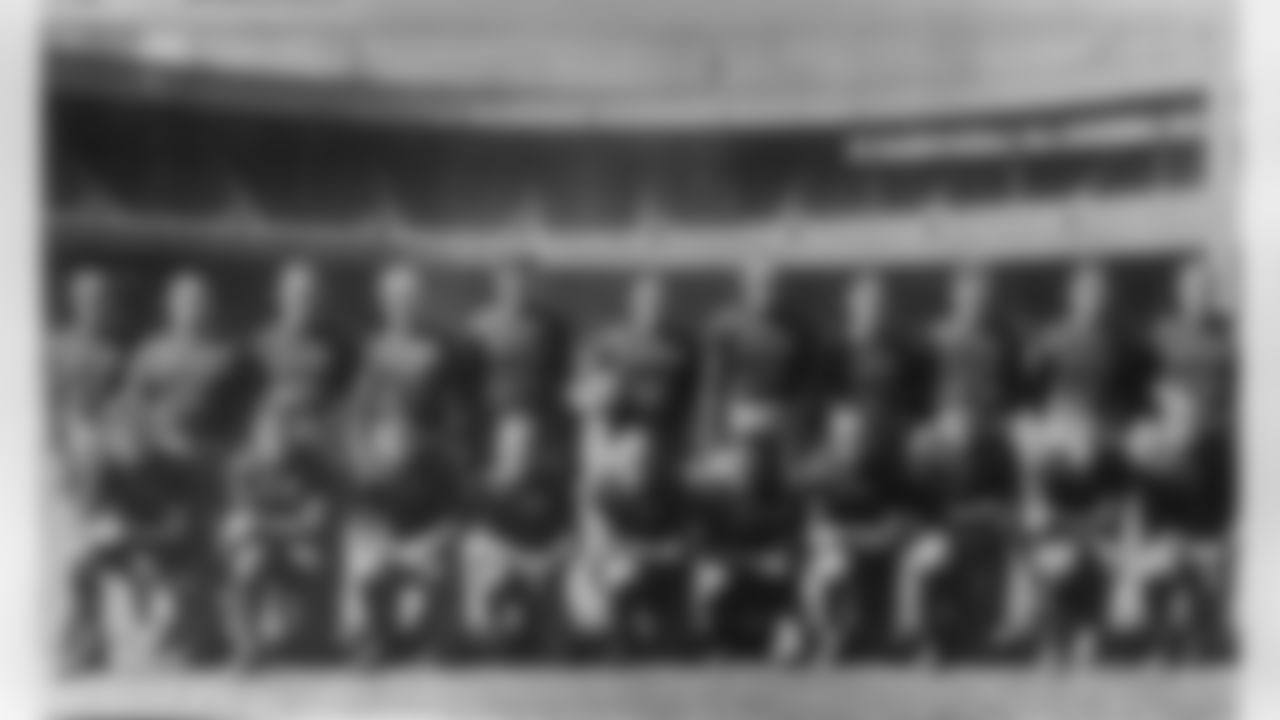
The 1927 New York Giants pose for a team photo in New York. The Giants finished 11-1-1 in the 12-team NFL and were crowned NFL champions in a time before playoff systems were used. The Giants shut out 10 opponents that year. They allowed just three touchdowns all season and wound up outscoring the opposition 197-20. (AP Photo/Pro Football Hall of Fame)
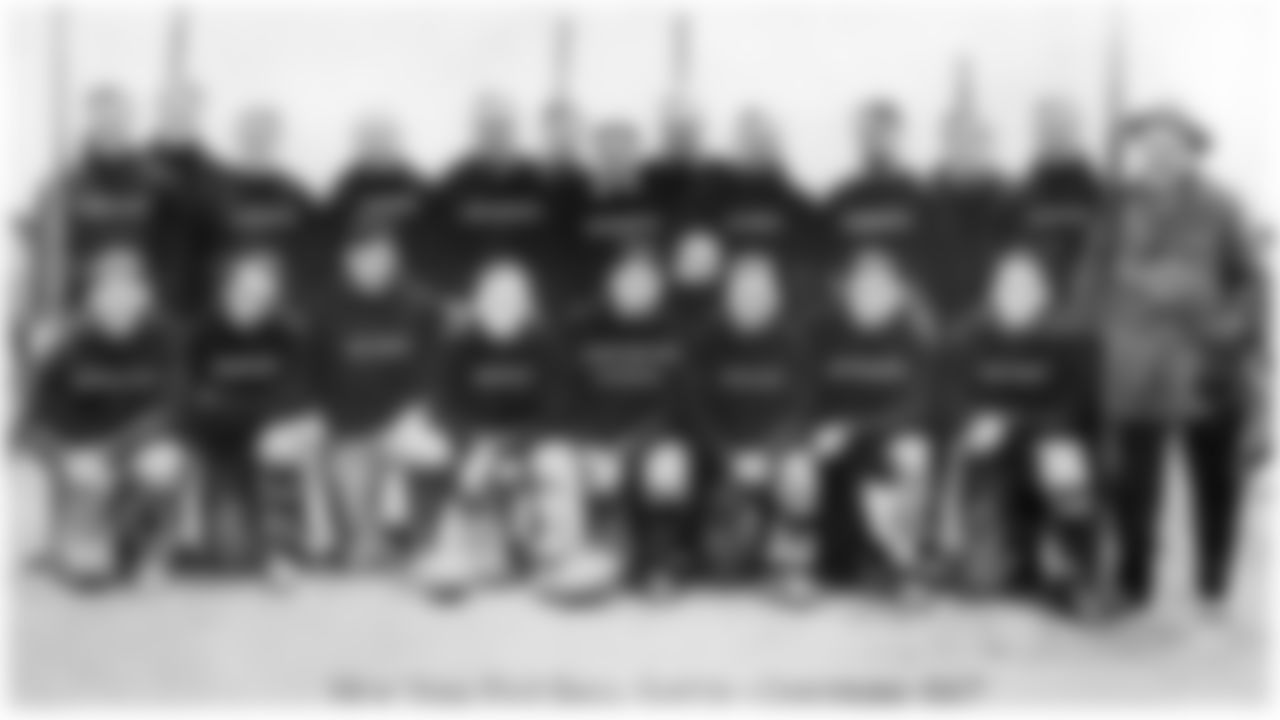
1927 New York Giants team photo, undated. (Pro Football Hall of Fame via AP Images)
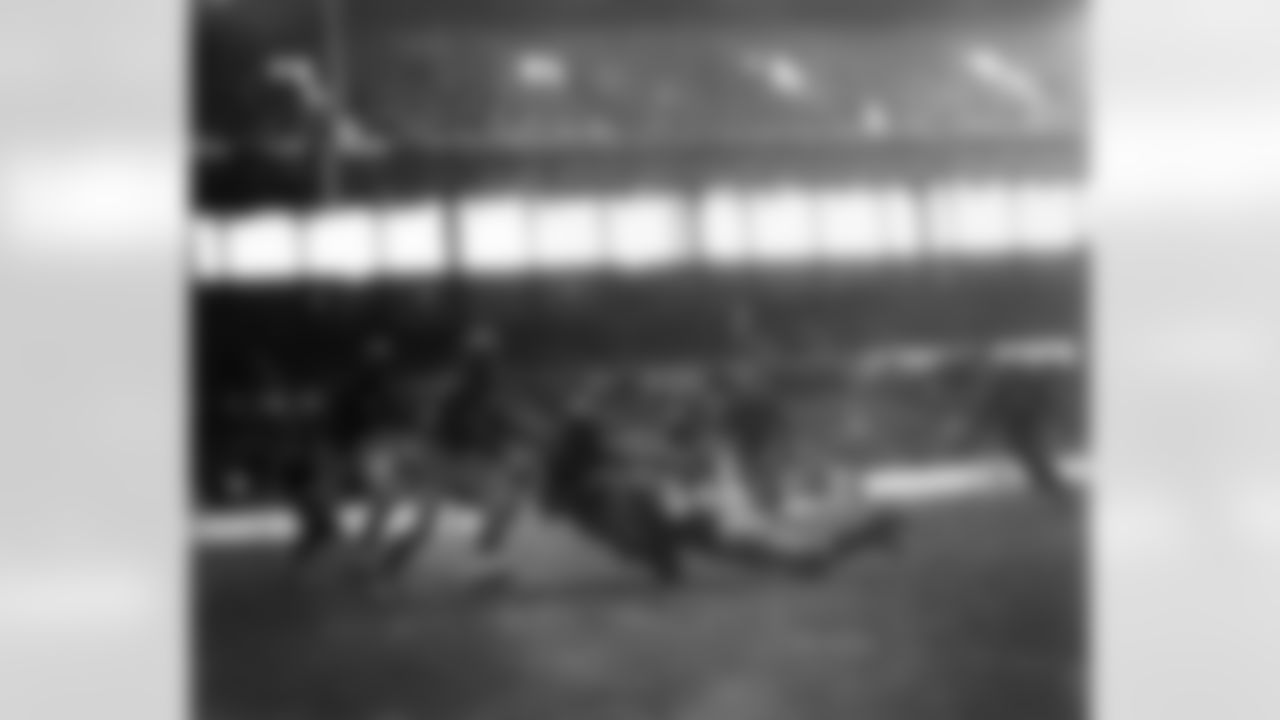
Photo shows Johnsos of Chicago being tackled by Moran of the giants, shown on Nov. 17, 1929 after receiving a forward pass for a 20 yard gain. (AP Photo)

Benjamin Friedman of the New York Giants being stopped after making a ten yard gain against the Green Bay Packers Nov. 24, 1929 at the Polo Grounds in New York City. (AP Photo)

The 1930 New York Giants pose for a team photo. The Giants finished 13-4 record. (AP Photo/Pro Football Hall of Fame)

New York Giants quarterback Benny Friedman (1) is set upon by the Notre Dame All-Stars at the Polo Grounds in New York, Dec. 14, 1930 during a post-season exhibition game. (AP Photo)
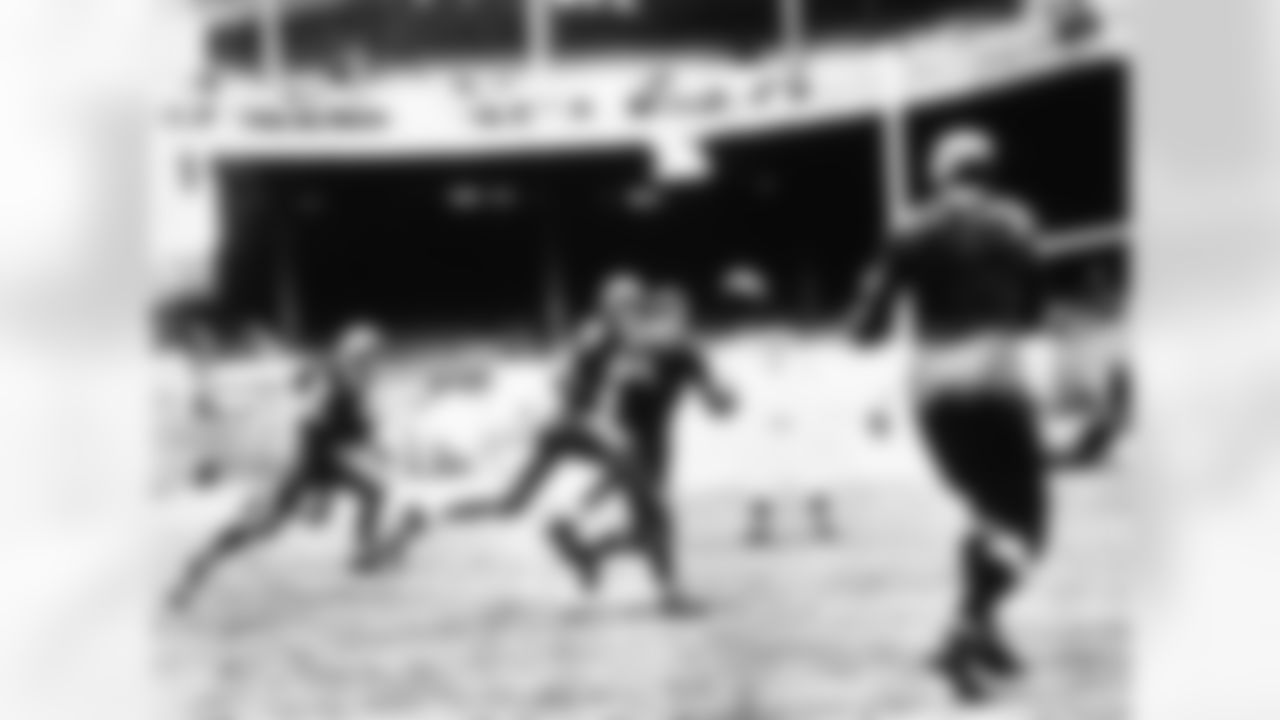
New York Giants and Chicago Bears in action during the National Football League Championship game on Dec. 17, 1933 at Wrigley Field in Chicago. (Pro Football Hall of Fame via AP)
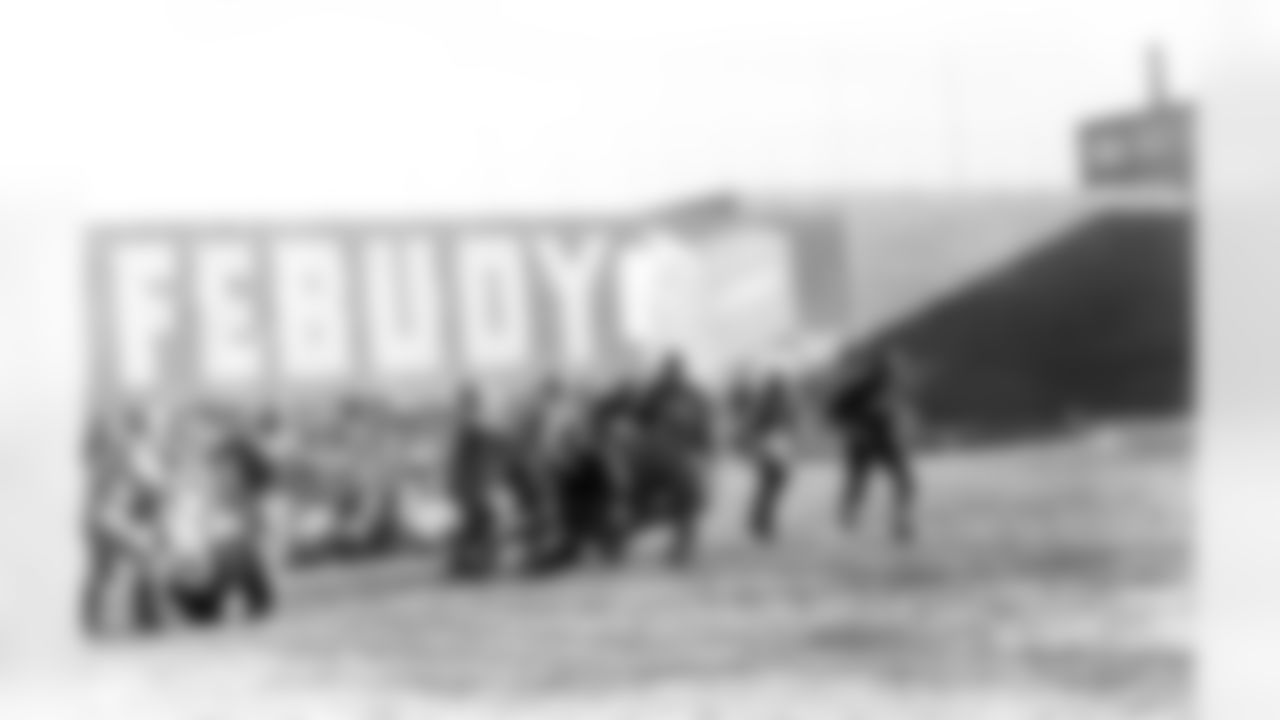
New York Giants against the Philadelphia Eagles, Dec. 10, 1933. Ken Strong of the Giants going round end for a four-yard gain. (AP Photo)

An unidentified New York Giants player changes from cleats to athletic shoes during a 30 to 13 New York Giants victory over the Bears in the NFL Championship game played at the Polo Grounds on Dec. 9, 1934 in New York.(Pro Football Hall of Fame via AP Images)
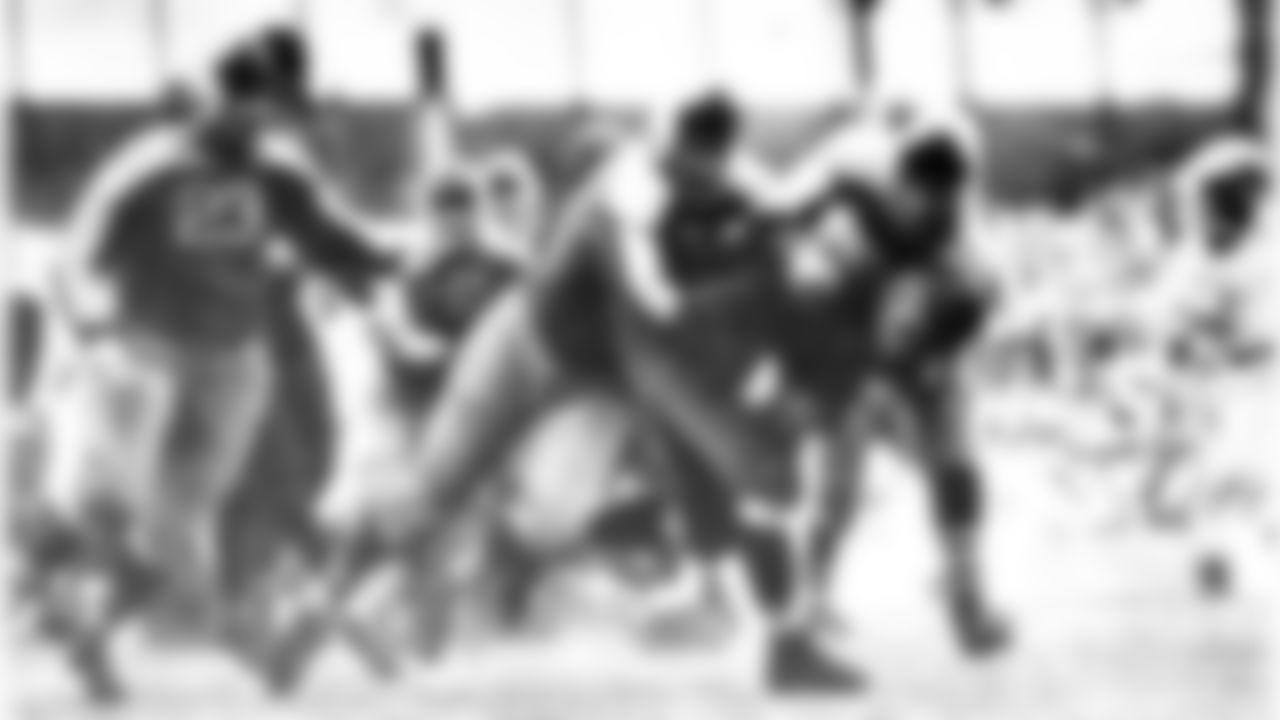
Pro Football Hall of Fame Chicago Bears fullback Bronko Nagurski is tackled by fellow hall of famer Mel Hein of the Giants during a 30 to 13 New York Giants victory over the Bears in the NFL Championship game played at the Polo Grounds on Dec. 9, 1934 in New York. (Pro Football Hall of Fame via AP Images)

New York Giants quarterback Harry Newman (12) is pictured in New York in 1934. Newman finished his rookie season (1933) as the NFL's leading passer with 11 touchdown throws for 973 yards and was also the Giants' leading rusher, gaining 437 yards. (AP Photo/Pro Football Hall of Fame)

New York Giants halfback Ed Danowski (22) is pictured in New York, 1934. (AP Photo/Pro Football Hall of Fame)
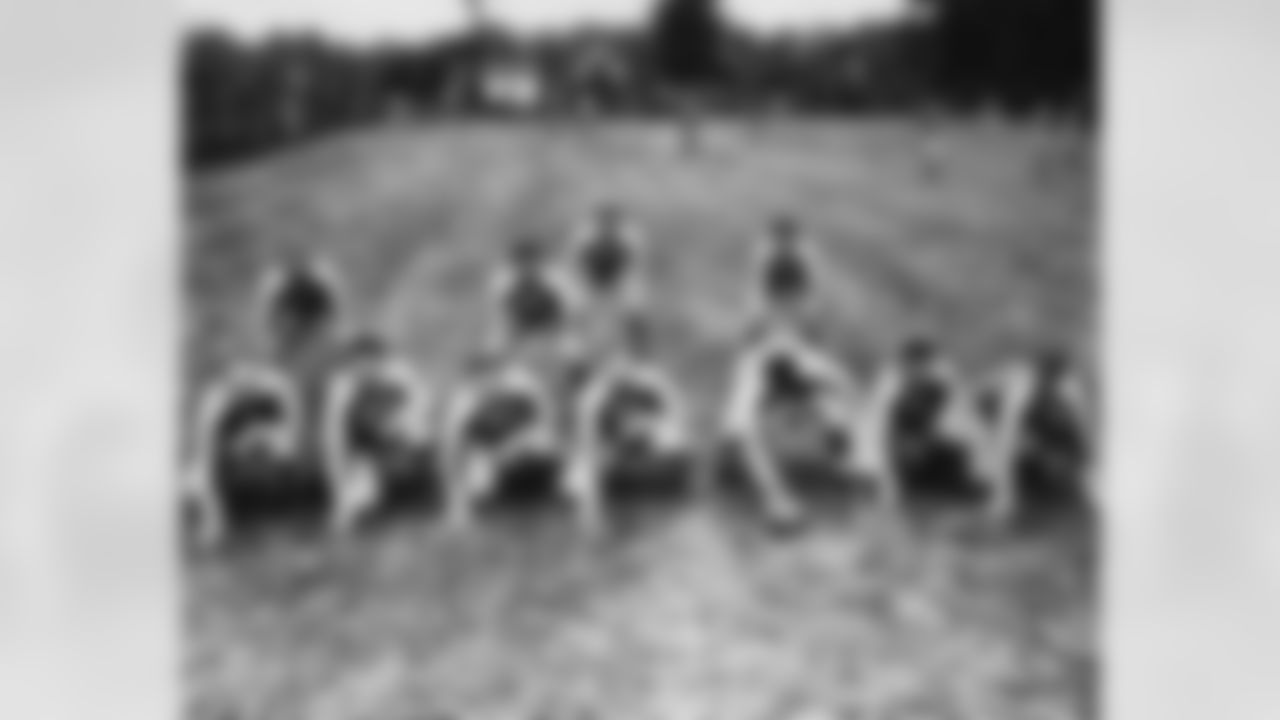
The 1934 New York Giants offense pose for a photo in New York. The Giants finished with a 8-5 record and defeated the Chicago Bears 30-13 in the Championship Game, also known as the "Sneakers Game." (AP Photo/Pro Football Hall of Fame)
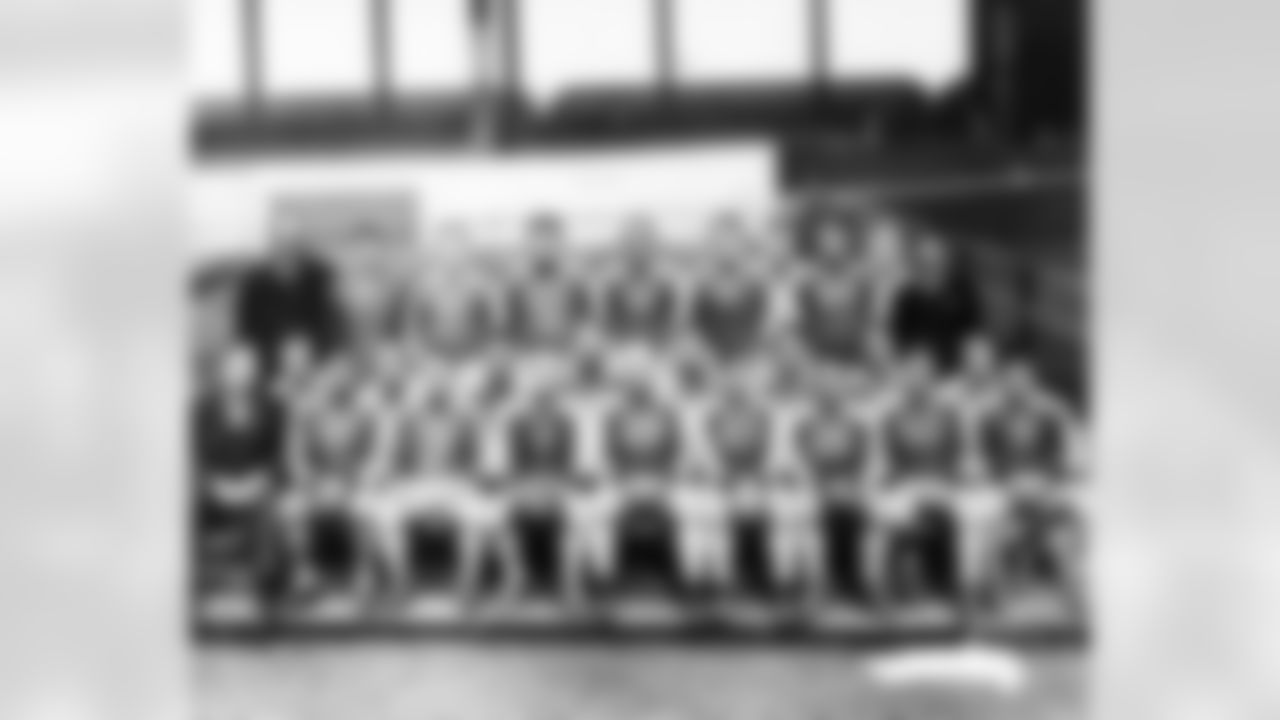
The 1934 N.Y. Giants pose for a team photo. The Giants won the 1934 NFL Championship Game over the Chicago Bears in what's known as "The Sneakers Game" after their players switched from cleats to sneakers to help with their footing in their upset win. (AP Photo/Pro Football Hall of Fame)

Chicago Bears back Carl Brumbaugh pitches the football out to Pro Football Hall of Fame fullback Bronko Nagurski during a 30 to 13 New York Giants victory over the Bears in the NFL Championship game played at the Polo Grounds on Dec. 9, 1934 in New York. (Pro Football Hall of Fame via AP Images)

The Ed Thorp Memorial trophy is presented to the New York Giants football team, winners of the championship Dec. 10, 1934 in New York City . Shown here at the ceremony, from left to right in the front row, are Carl Storck (head showing); George Halas; Joe F. Carr, president of the league, and John V. Mara, president of the Giants. In the second row are Larry Doyle (behind car) and T.J. Mara (behind trophy). In rear, left to right, are Bert Bell, George Marshall, Lud Wray and Dennis Shea. (AP Photo)

Ed Danowski, star quarterback of the New York Giants, goes through a punting drill at the Polo Grounds, Oct. 9, 1935. (AP Photo)

Ken Strong, star halfback of the New York Giants, punting at the Polo Grounds, October 9, 1935. (AP Photo)
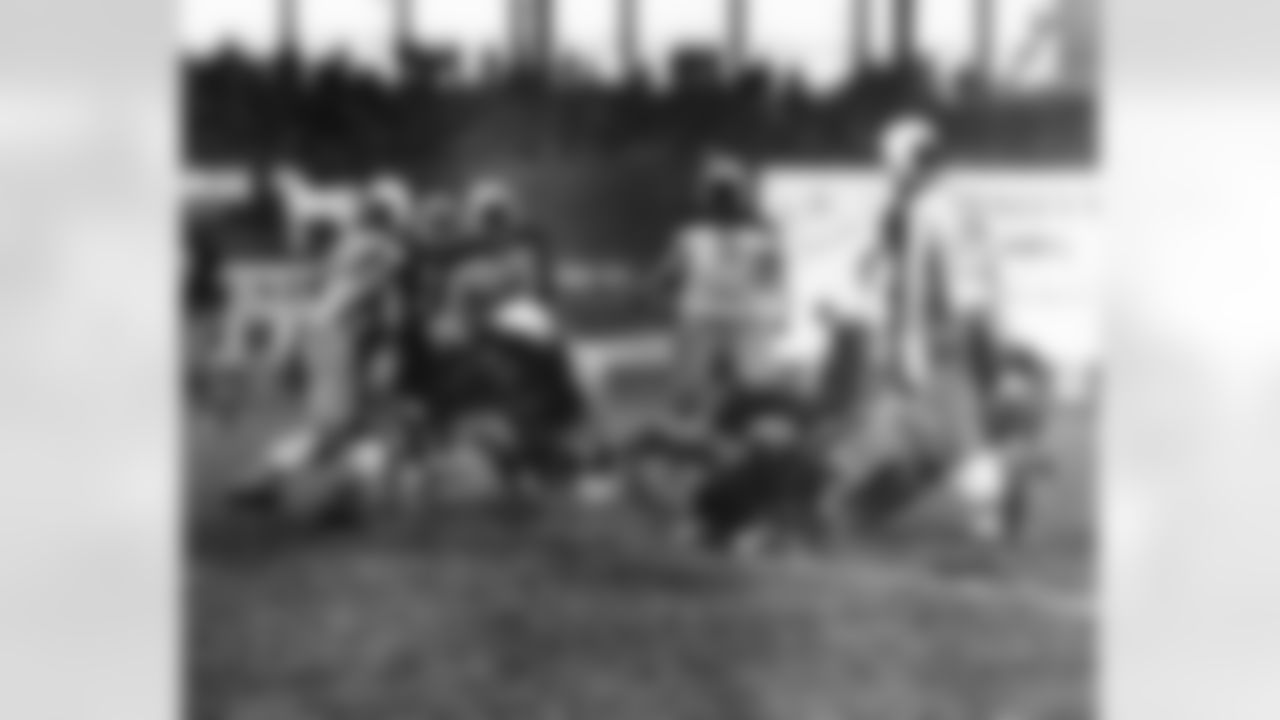
Ike Peterson, a back with the Chicago Cardinals who formerly played for Gonzaga, is shown carrying the ball through the line of the N.Y. Giants for a three-yard gain. The Chicago Pro team won, 14-13 on Oct. 27, 1935 in New York. When Ken Strong missed his first try-for-point in two years. On the above play, Peterson was stopped by Bernie Kaplan (55), formerly of Western Maryland, and Bill Owen (36), formerly of Oklahoma A & M. (AP Photo)
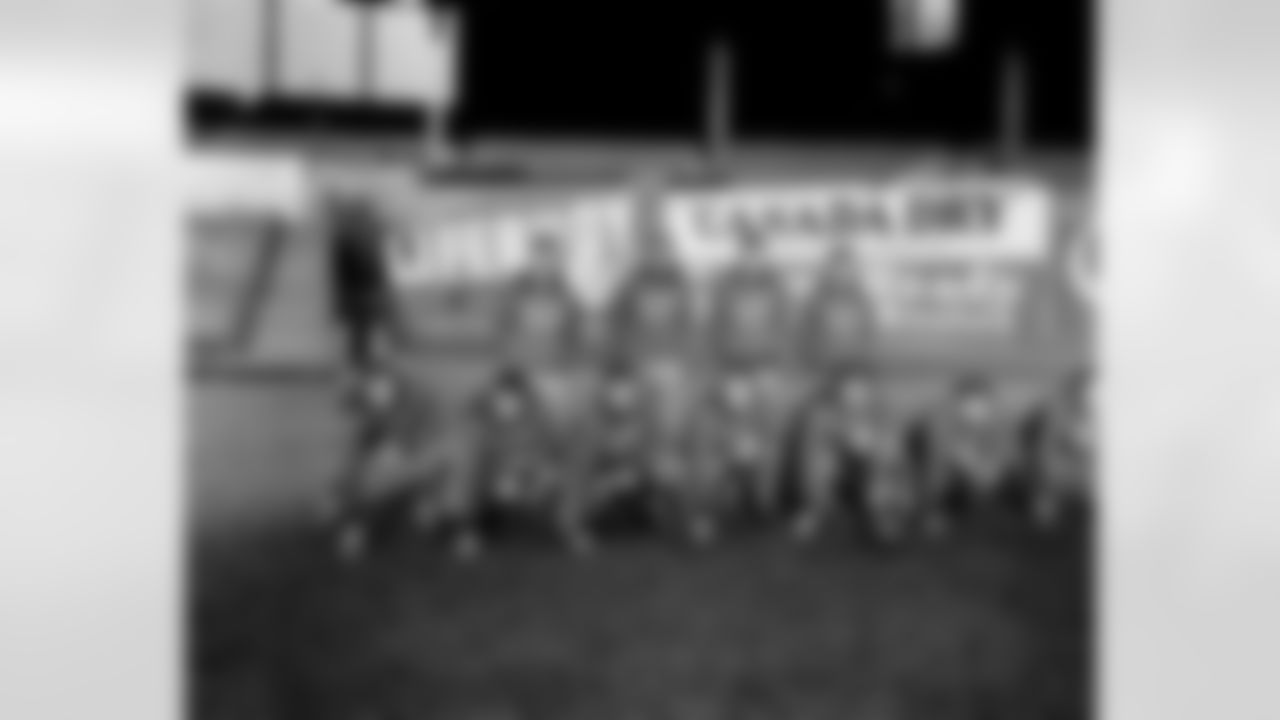
Members of the starting lineup of the New York Giants pose for a photograph in New York, Nov. 19, 1936. The Giants are preparing for their game against the Green Bay Packers on Nov. 22. From left to right, front row are: Tod Goodwin; Len Grant; Gaines Davis; Johnny Dell Isola; Mel Hein; Bill Morgan and Buster Mitchell. Stading are: Tilly Manton; Dale Burnett; Ed Danowski and Tuffy Leemans. (AP Photo)
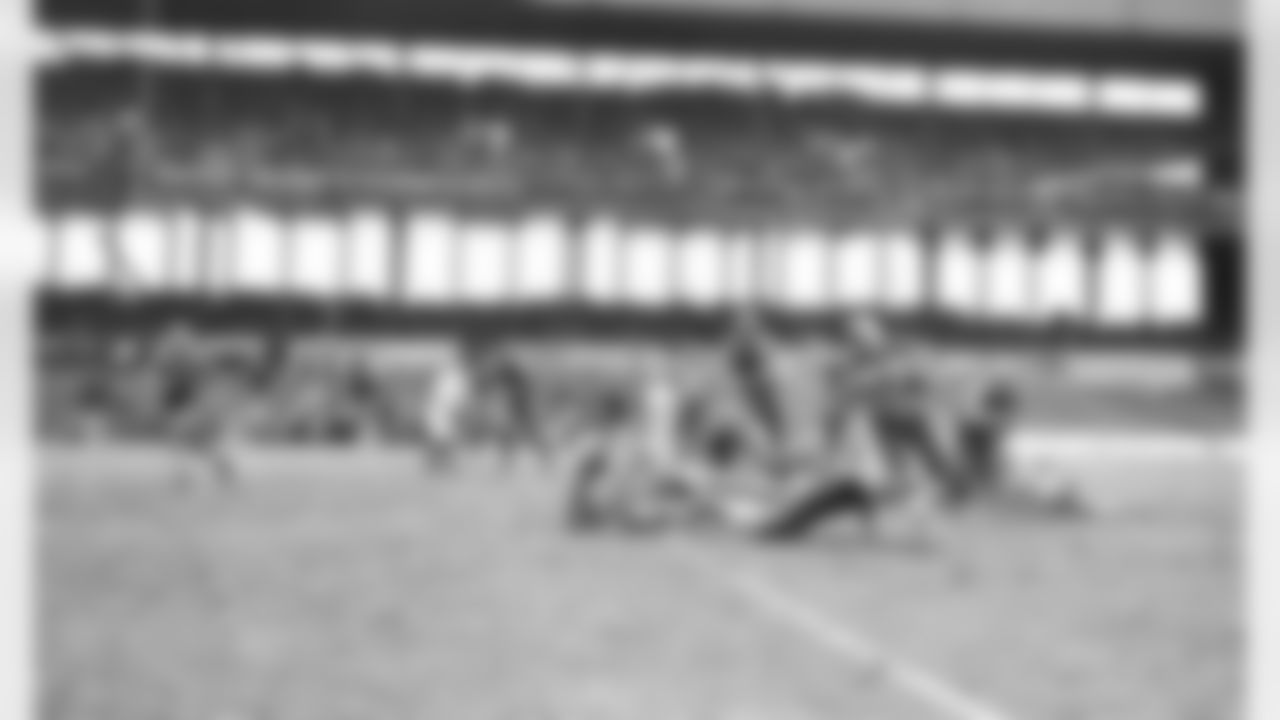
Alphonse "Tuffy" Leemans (4) of the New York Giants makes a four-yard gain before being tossed out of bounds by the Green Bay Packers at the Polo Groungs in New York, Nov. 22, 1936. The Packers won, 25-14. (AP Photo)

Alphonse "Tuffy" Leemans, New York Giants backfield ace, warms up during practice in New York, Oct. 27, 1937. The Giants will face the Chicago Bears Oct 31, in New York. (AP Photo)

Alphonse "Tuffy" Leemans, New York Giants backfield ace, warms up his arm during practice in New York, Oct. 27, 1937. The Giants will face the Chicago Bears Oct 31, in New York. (AP Photo)
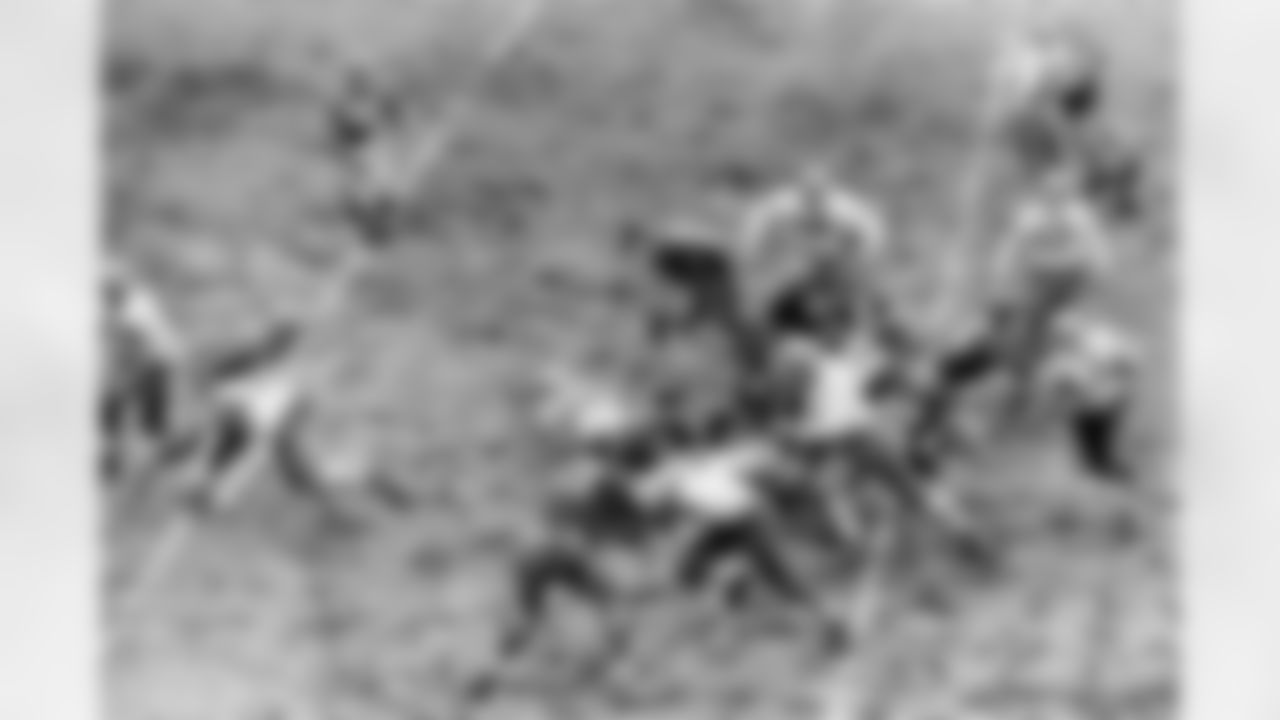
FILE - In this Nov. 20, 1938, file photo, Green Bay Packers Ed Jankowski (7), far right, runs after taking the handoff from Cecil Isbell (17) on a reverse as New York Giants Ken Lunday (5) reaches out on an attempted tackle, at the Polo Grounds in New York. The Giants defeated the Packers 15-3. (AP Photo/File)

FILE - In this Nov. 20, 1938, file photo, Green Bay Packers halfback Cecil Isbell (17) gains 10-yards against the New York Giants during the first quarter of a professional football game at the Polo Grounds in New York. (AP Photo)

Ed Danowski, champion passer of the NFL and member of the New York Giants, is pictured at the Polo Grounds where the Giants are preparing for their World's Championship game with the Green Bay Packers, Dec. 7, 1938. (AP Photo/Carl Nesensohn)
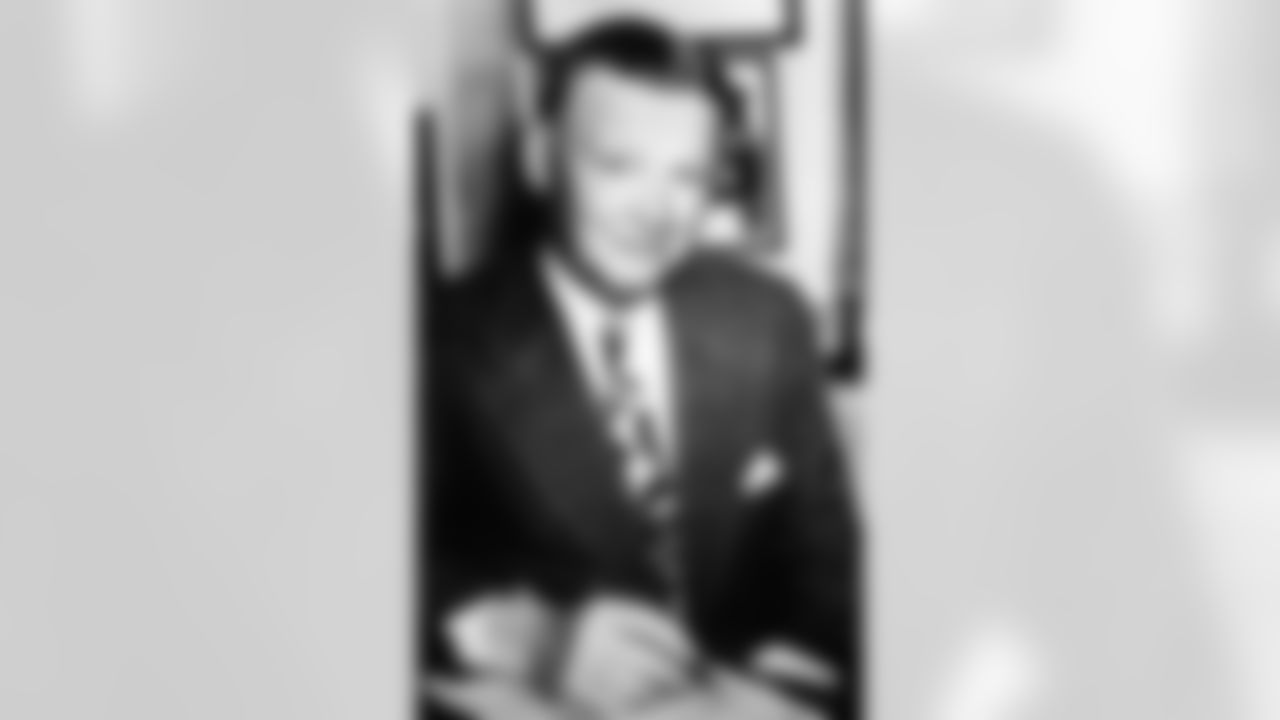
Tim Mara, founder and administrator of the New York Giants of the NFL is shown in 1941. (AP Photo/Pro Football Hall of Fame)

New York Giants Alphonse "Tuffy" Leemans (4) gets a forward pass off during practice in New York, Nov. 11, 1942. (AP Photo/John Lindsay)

This photo shows the official program from the Chicago Bears NFL game against New York Giants played on Nov. 14, 1943, at the Polo Grounds in New York. (Hall of Fame via AP)
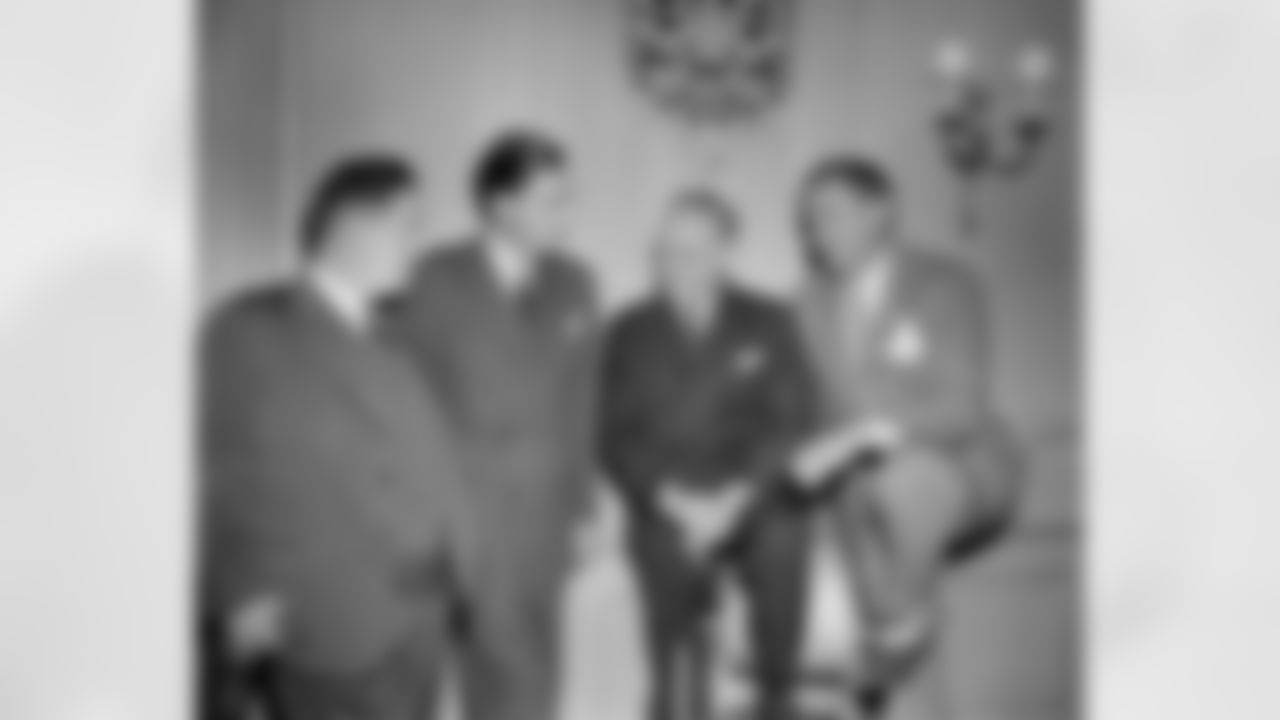
Officials stand in a huddle as they attend the spring meeting of the National Football League in Chicago, Ill., April 6, 1943. They were there to discuss wartime problems of professional football. From left to right are: Art Rooney, vice president of the Pittsburgh Steelers; John V. Mara, president of the New York Giants; and Arthur "Dutch" Bergman and George P. Marshall, coach and president, respectively, of the Washington Redskins. (AP Photo/Paul Cannon)

Jack Lummus of the New York Giants, shown July 2, 1944. (AP Photo)

Wounded World War II soldiers watch the Detroit Lions at New York Giants NFL game from a special section in the stands at the Polo Grounds in New York, Nov. 18, 1945. The Giants defeated the Lions 35-14. (AP Photo/Pro Football Hall of Fame)

Wounded World War II soldiers watch the Detroit Lions at New York Giants NFL game from a special section on the sidelines at the Polo Grounds in New York, Nov. 18, 1945. The Giants defeated the Lions 35-14. (AP Photo/Pro Football Hall of Fame)

Surrounded by New York football Giants, members of the family of the late Al Blozis, former Giant and Georgetown football and shot put star killed in the war, look at memorial plaques after its unveiling at New York's Polo Grounds prior to the Giant's Philadelphia Eagles game, Dec. 2, 1945. In the center are Mr. and Mrs. Anthony Blozis, Al's parents and his brother, Joseph, right.(AP Photo/Harry Harris)
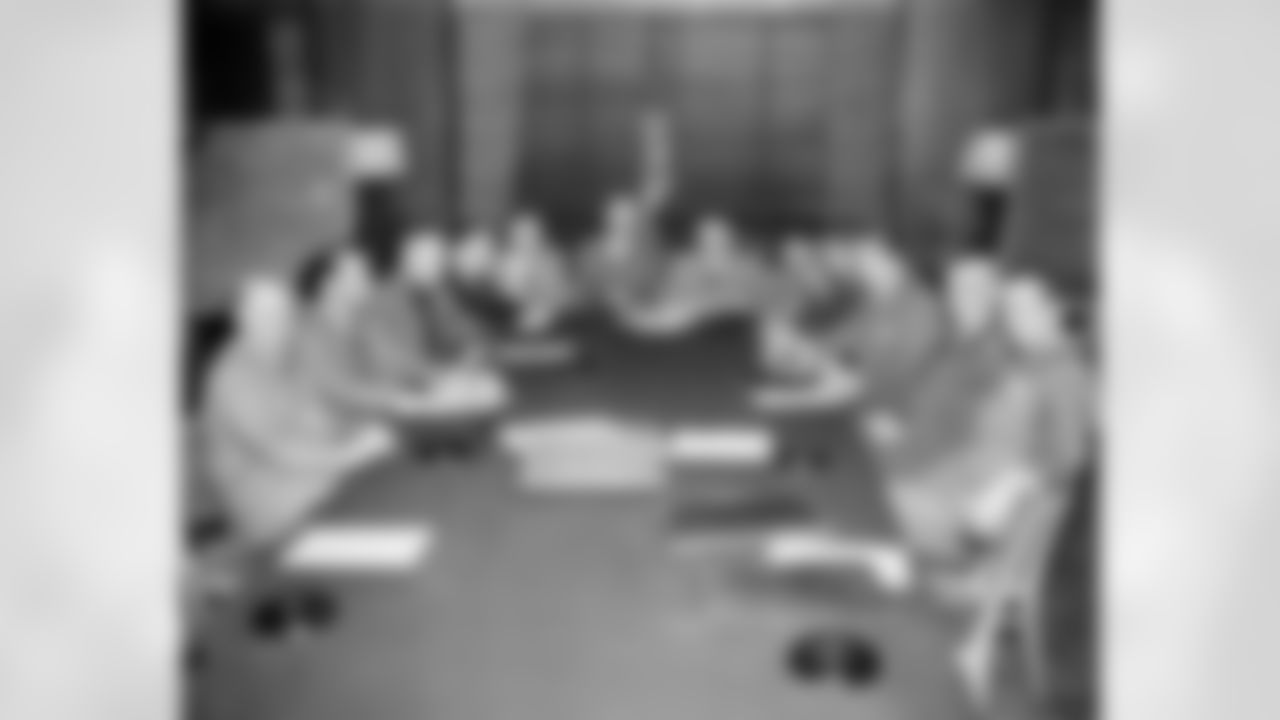
Representatives of teams in the NFL meet in New York, April 28, 1946, to arrange a schedule for the coming season. From left: Arthur Sampson and William A. Shea (Boston Yankees); Charles Bidwill (Chicago Cardinals); Arthur J. Rooney (Pittsburgh Steelers); Curly Lambeau (Green Bay Packers); George Halas (Chicago Bears); Bert Bell, league commissioner; George Marshall (Washington Redskins); John V. Mara (New York Giants); Charles Walsh (L.A. Rams); Gus Dorias (Detroit Lions) and Harry Thayer (Philadelphia Eagles). (AP Photo/Harry Harris)
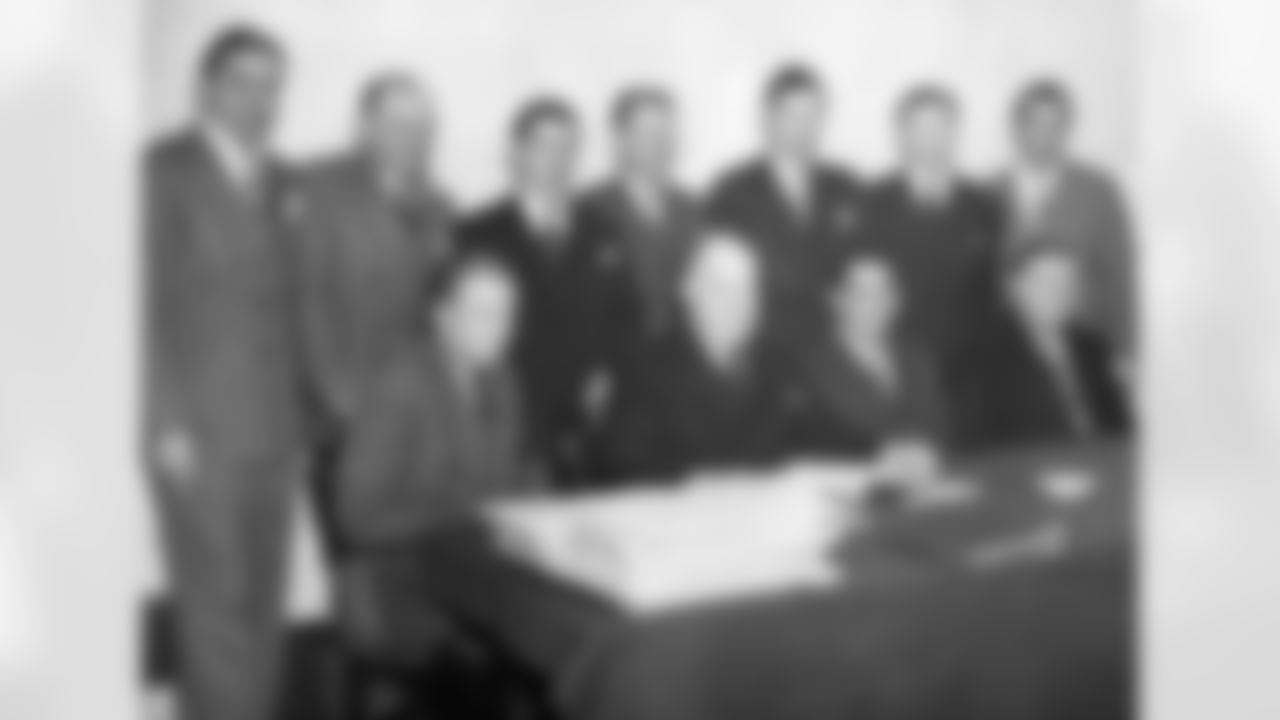
Delegates attend the annual meeting of the National Professional Football League in New York, April 12, 1940. From left, front row: Charles W. Bidwell, owner of Chicago Cardinals; Carl Storck, league president; Fred Mandel Jr., owner of the Detroit Lions; Bert Bell, owner of the Philadelphia Eagles. Standing, from left: George P. Marshall, owner of the Washington Redskins; George S. Halas, owner of the Chicago Bears; Arthur J. Rooney, owner of the Pittsburgh Steelers; Edward P. Brugh, president of the Cleveland Rams; John V. Mara, president of the New York Giants; Curly Lambeau, coach of the Green Bay Packers, and Daniel Topping, owner of the Brooklyn Dodgers. (AP Photo/Lou G. Johrden)
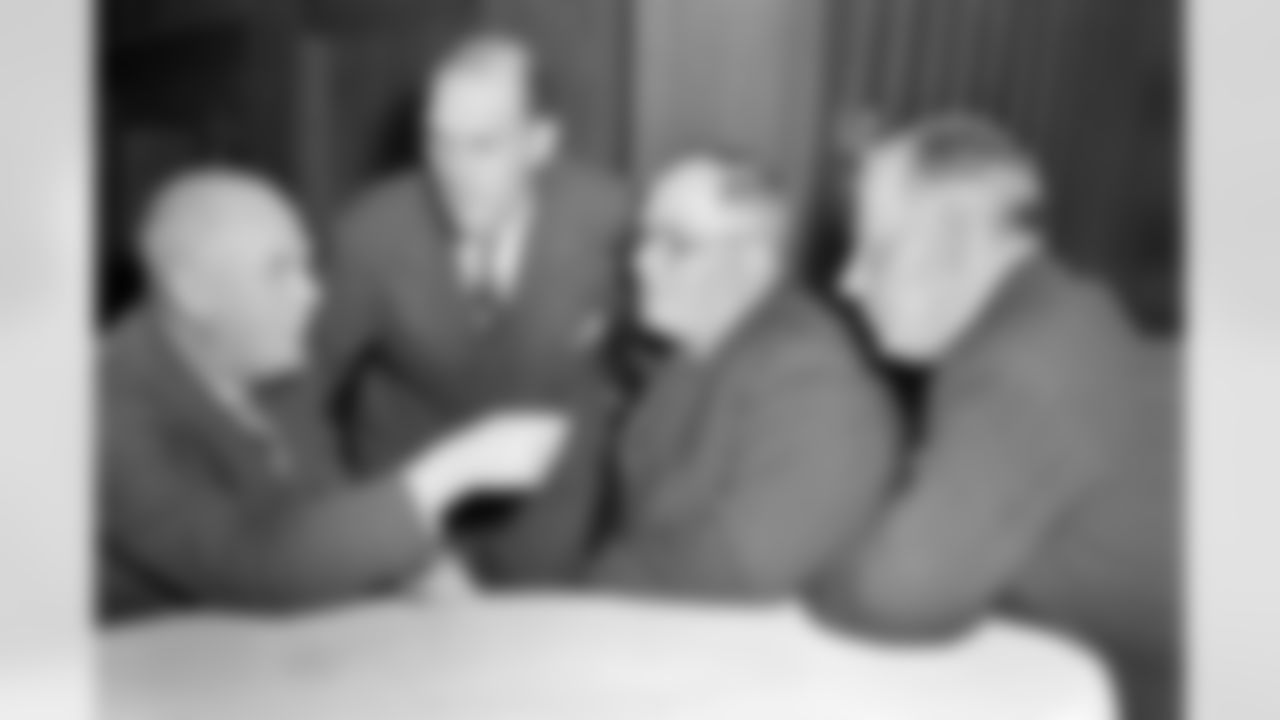
Grantland Rice, left, sports writer, discusses the big games with three coaches of the leading professional football teams in the Eastern division of the NFL, after he received the Touchdown Club annual award at the Football Writers meeting in New York, Dec. 4, 1944. From left: Rice, Dudley S. DeGroot of the Redskins; Steve Owen, New York Giants; and Earle "Greasy" Neale of the Philadelphia Eagles. (AP Photo/Walter McCardell)

Chicago Bears end, Ken Kavanaugh catches a pass from quarterback Sid Luckman in the second quarter of the NFL championship games against the New York Giants at the Polo Grounds in New York, Dec. 15, 1946. Giants players are back, Howie Livingston (10) and Hanks Soar (15). (AP Photo/Joe Caneva)

FILE - In this Nov. 14, 1948, file photo, Los Angeles Rams' Howard Hickey (53) catches a pass for a touchdown as New York Giants' Tony Minisi (38) defends at the Polo Grounds in New York. In its early days, the NFL often relied on baseball stadiums for its teams. Often, the football team took the name of the baseball team, looking to create the illusion there was a connection between the teams. But once pro football expanded and was shown for free on television, the sport was on its way. (AP Photo/HH, File)
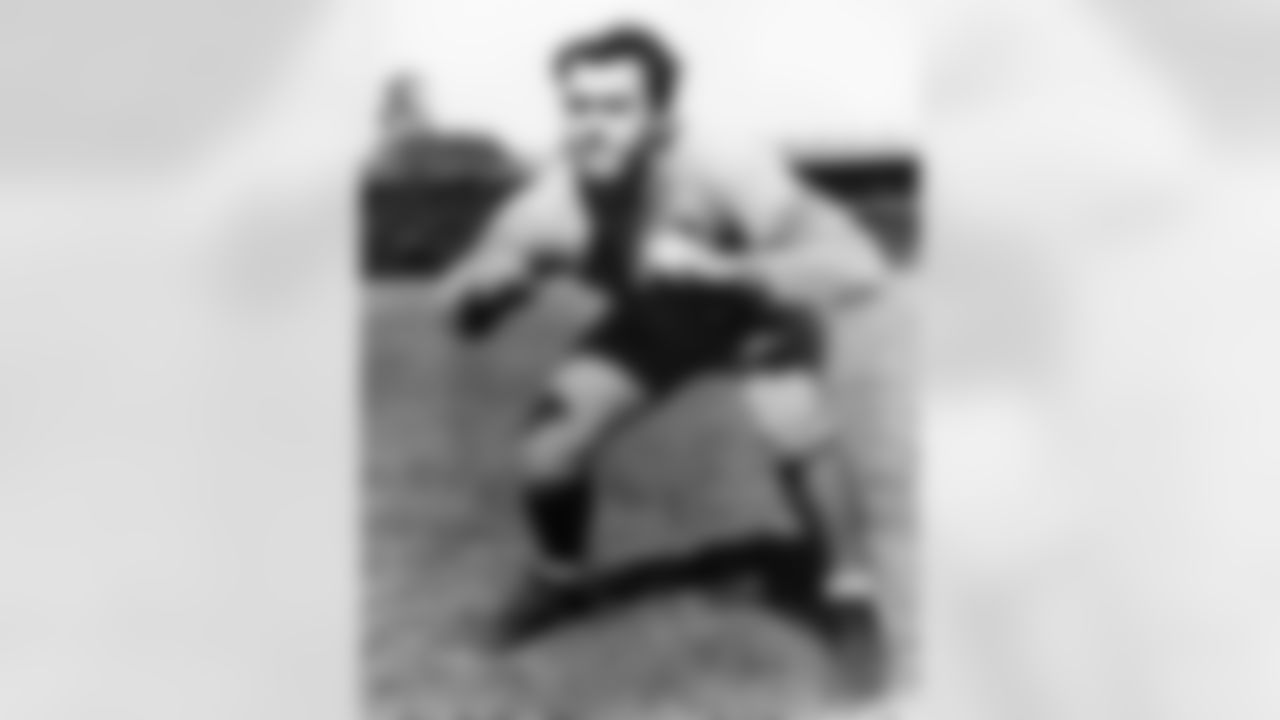
New York Giants Hall of Fame tackle Arnie Weinmeister (44) poses for a photo during his college days at the University of Washington at Seattle, 1947. (AP Photo/Pro Football Hall of Fame)
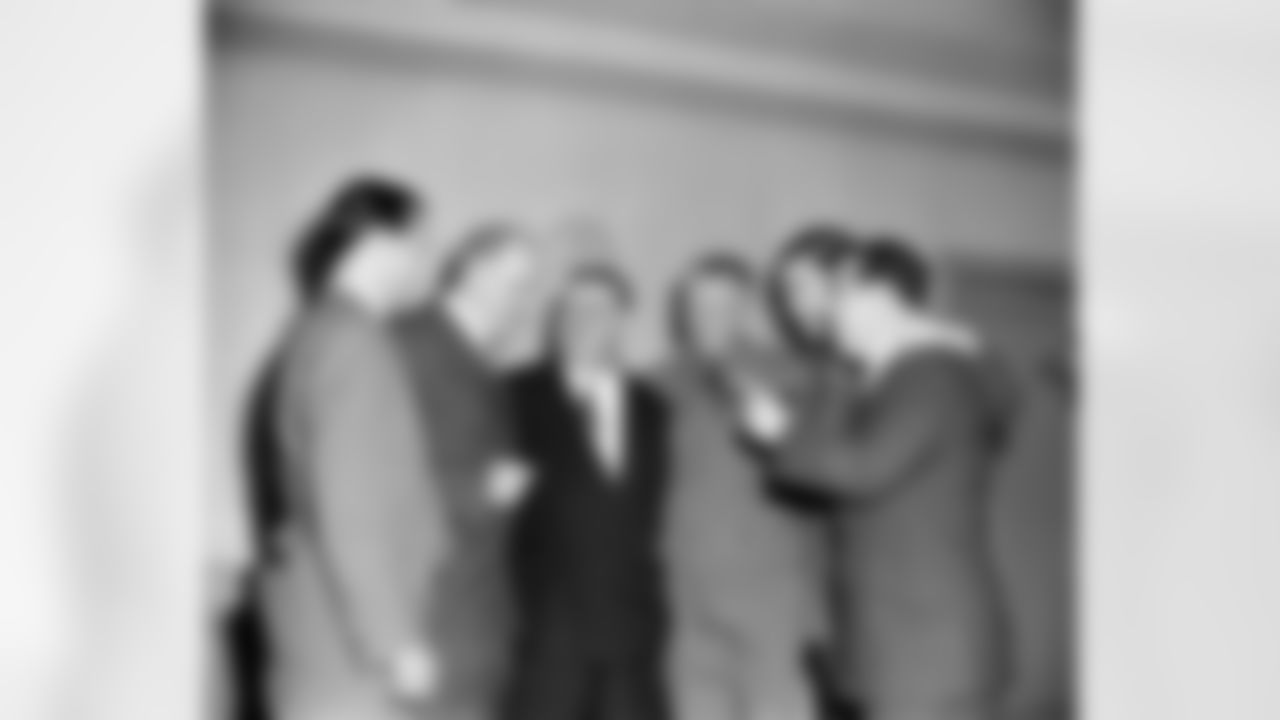
Fred Mandel, right, owner of the Detroit Lions, points up a story as the National Football League owners meet with the league commissioner, Bert Bell, center, in Chicago, Ill., Jan. 23, 1947. They are, left to right: Dan Reeves, Los Angeles Rams; George Halas, Chicago Bears; Bell; Charles Bidwell, Chicago Cardinals; John V. Mara, New York Giants and Mandel. (AP Photo/Ed Maloney)

Coach Steve Owen, second from left, of the New York Giants football team, huddles with some of his star players during a practice session at the Polo Grounds in New York, Oct. 10, 1950. Left to right are: James White, tackle and captain; coach Owen; Bill Swiacki, end; Joe Scott, back; Ellery Williams, end; and Charles Conerly, back. The Giants, the only unbeaten team in the NFL so far this year and out in front in their division with a 3-0 record, play the Pittsburgh Steelers in New York on Oct. 15. (AP Photo/Harry Harris)

New York Giants Rosey Brown(79) portrait from his 1953 with the New York Giants. Rosey Brown played for 13 season, all with the New York Giants, was a 9-time Pro Bowler and was inducted to the Pro Football Hall of Fame in 1975.(David Durochik via AP)
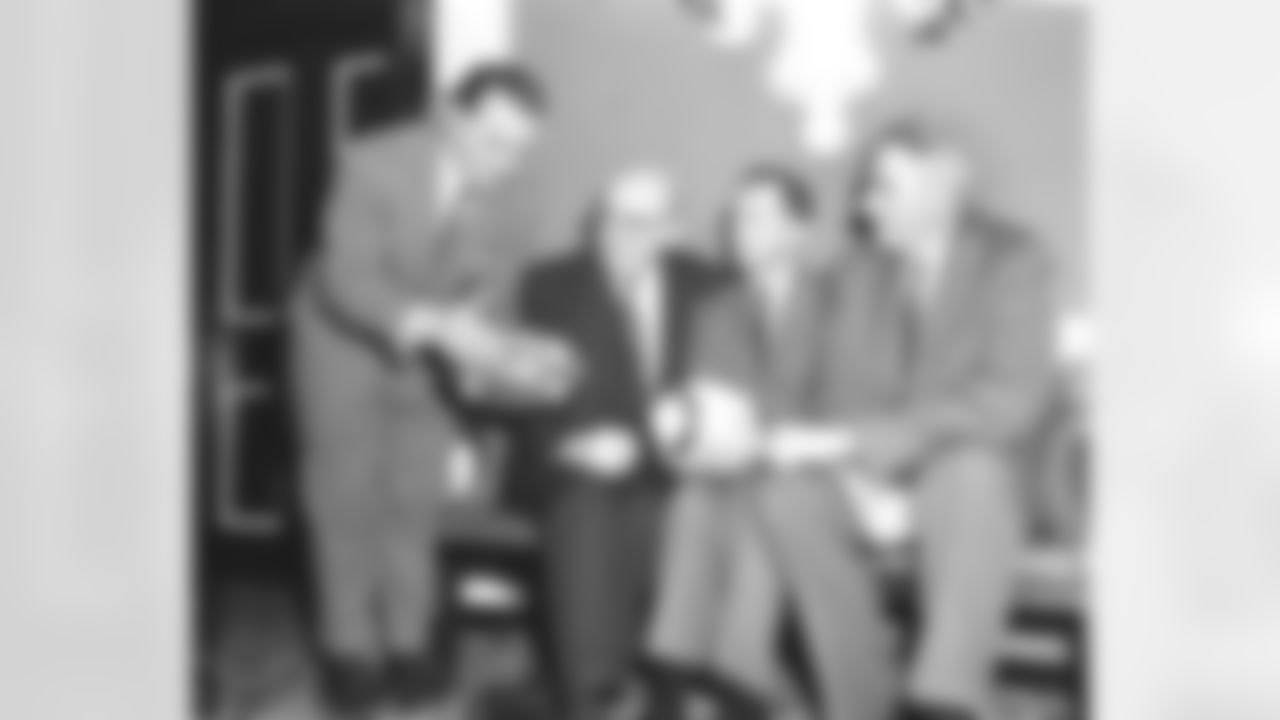
Sid Gillman, left, new coach of the Los Angeles Rams, gets the feel of a new football during brief recess in NFL draft meeting at the Hotel Warwick in New York City, Jan. 27, 1955. With the new mentor are, from left: George Halas, owner-coach of the Chicago Bears; Dan Reeves, owner of the Rams, and Jim Lee Howell, head coach of the New York Giants. NFL is holding annual meeting in New York until Jan. 30. (AP Photo/Anthony Camerano)

Ken Strong of the New York Giants with his son Ken Jr. acting as holder, gets ready to send the ball between the uprights in the empty Polo Grounds in New York, Jan. 3, 1947. (AP Photo/Carl Nesensohn)

Ed Danowski, champion passer of the NFL and member of the New York Giants, tosses the pigskin during workout at the Polo Grounds, Dec. 7, 1938. The Giants meet the Green Bay Packers for the title at the Coogans Bluff. (AP Photo/Carl Nesensohn)

Some of the top figures in the world of sports hold citations presented to them for "outstanding achievement" at the first annual American Baseball Academy Dinner of Champions at the Waldorf Astoria Hotel in New York, April 12, 1952. From left: Steven Owen, coach of the N.Y. Giants; Frank McGuire, basketball coach of St. John's; ex-heavyweight champ Joe Louis; Ed Sullivan, who acted as master of ceremonies at the dinner; ex-New York Yankee outfielder Tommy Henrich; Craig Wood, golfer; Ben Friedman, athletic director at Brandeis University, and Columbia University grid coach Lou Little. (AP Photo/John Lent)

Green Bay Packers halfback Al Carmichael (48) runs upfield during an NFL game against New York Giants at County Stadium in Green Bay, 1950s. (AP Photo/Vernon Biever)
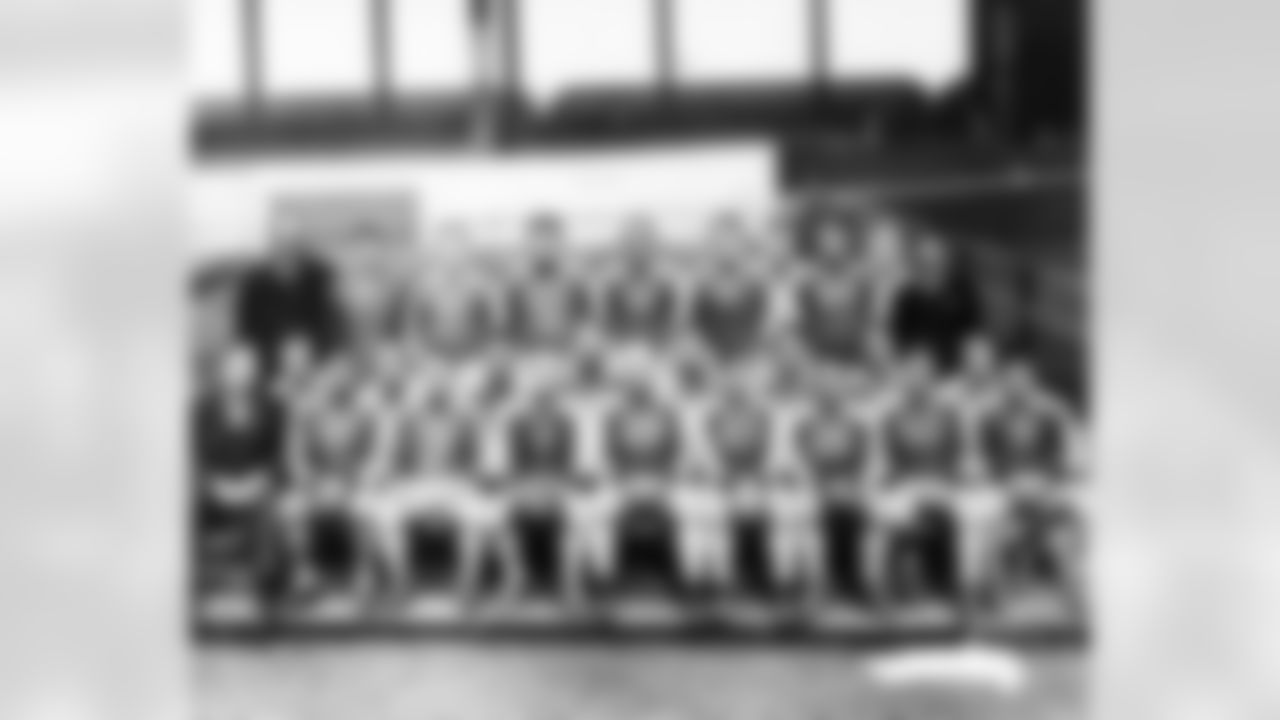
The 1934 N.Y. Giants pose for a team photo. The Giants won the 1934 NFL Championship Game over the Chicago Bears in what's known as "The Sneakers Game" after their players switched from cleats to sneakers to help with their footing in their upset win. (AP Photo/Pro Football Hall of Fame)
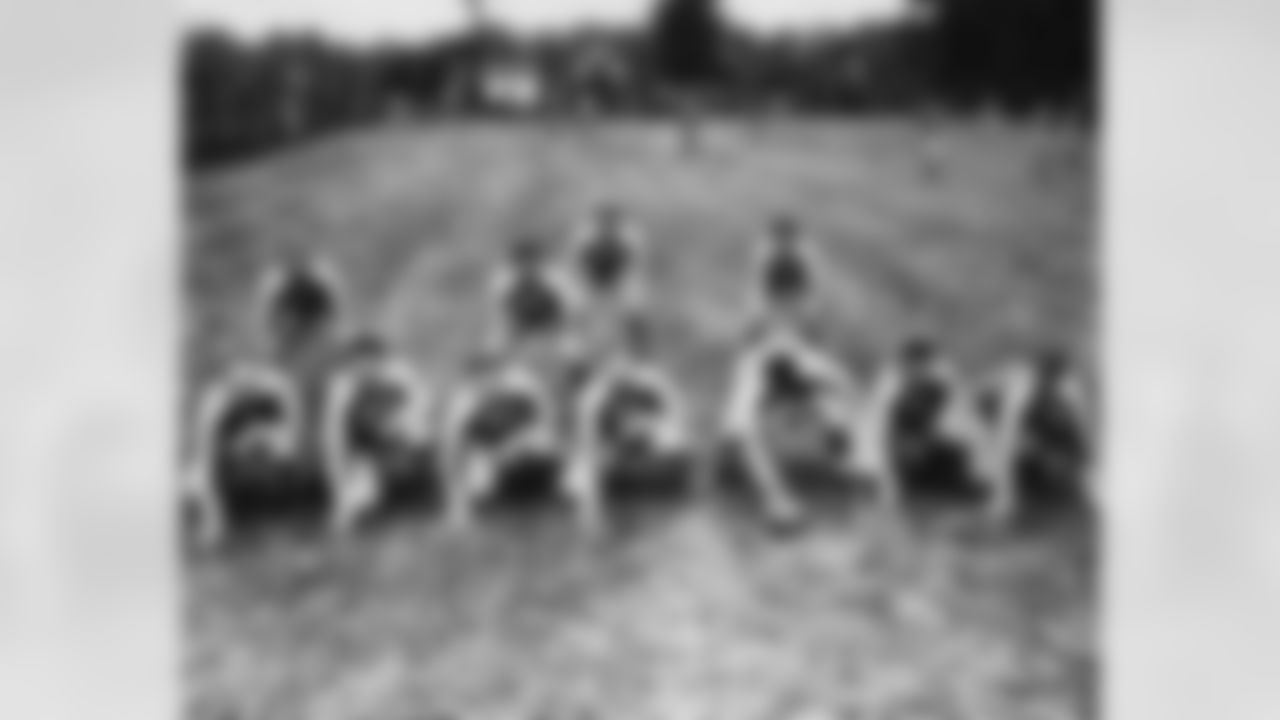
The 1934 New York Giants offense pose for a photo in New York. The Giants finished with a 8-5 record and defeated the Chicago Bears 30-13 in the Championship Game, also known as the "Sneakers Game." (AP Photo/Pro Football Hall of Fame)
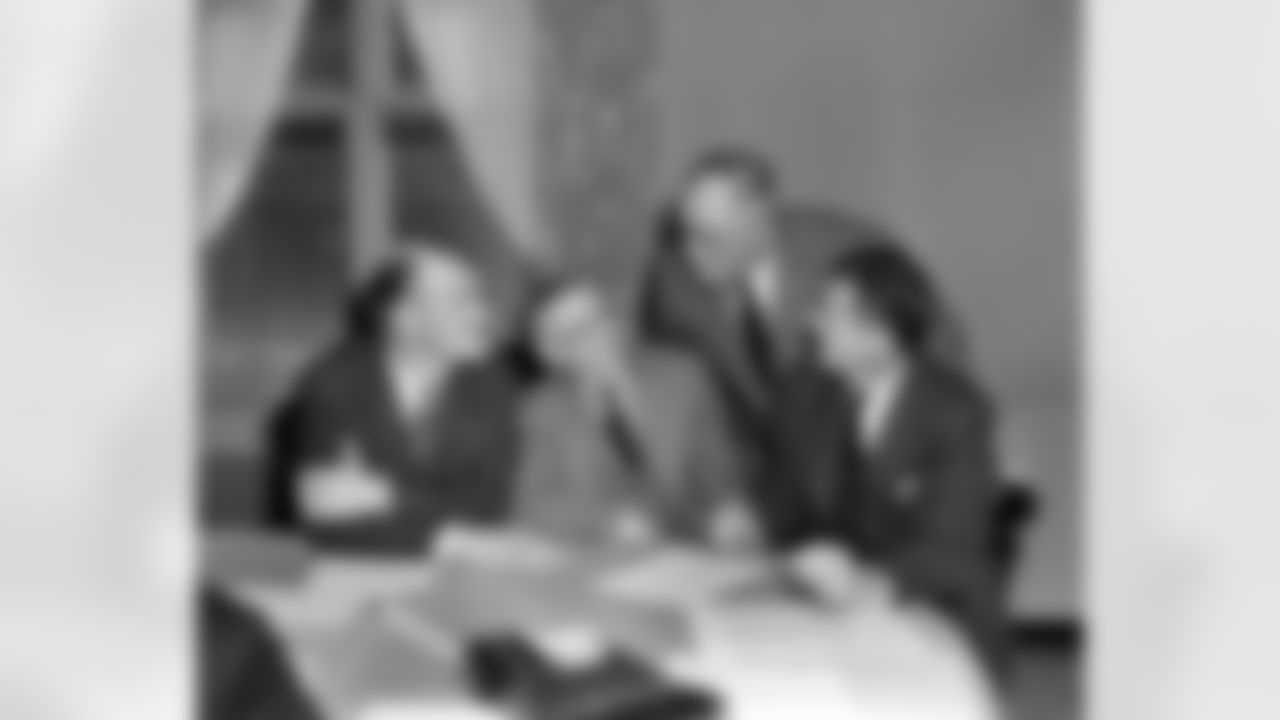
NFL commissioner Elmer Layden, right, confers with Washington Redskins' coach Dud De Groot, left, Detroit Lions coach Charles Dorais, second from left and New York Giants' coach Steve Owen, as the annual meeting of the Professional Football Rules Committee gets underway in New York City, Jan. 10, 1946. (AP Photo/John Rooney)
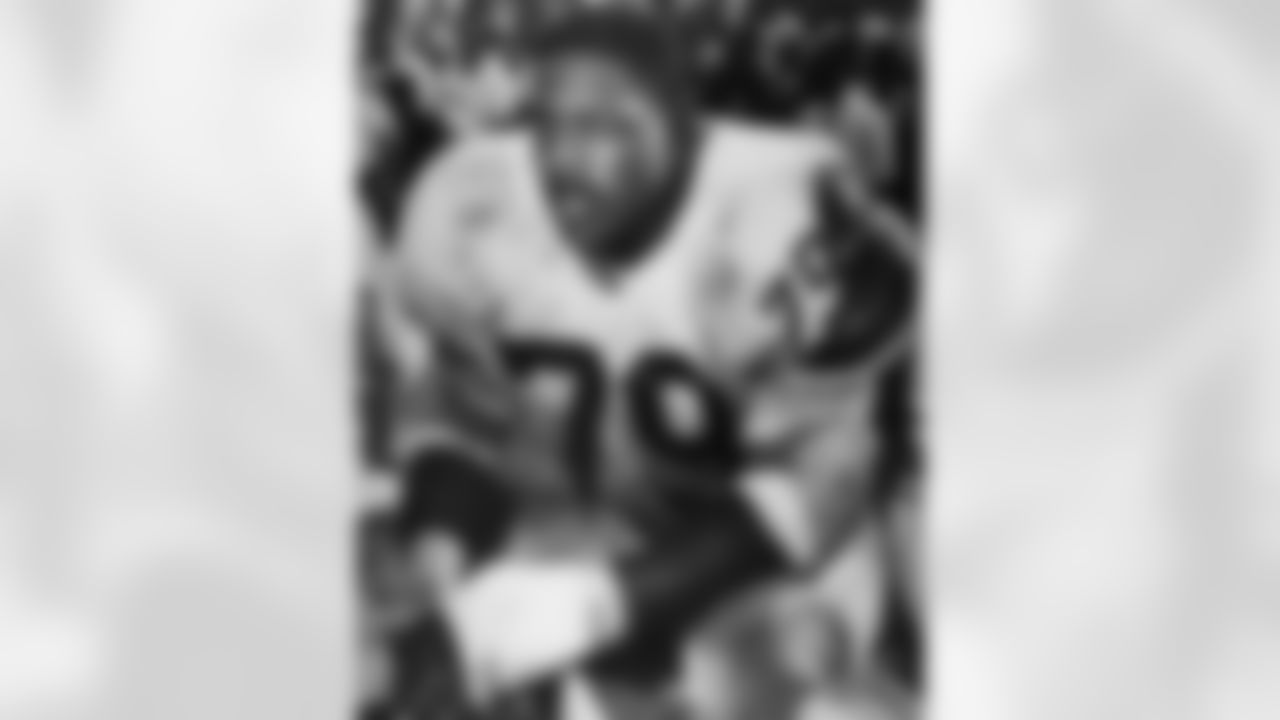
New York Giants offensive tackle Rosey Brown (79) looks on from the sideline in this undated photo. (Hall of Fame via AP)
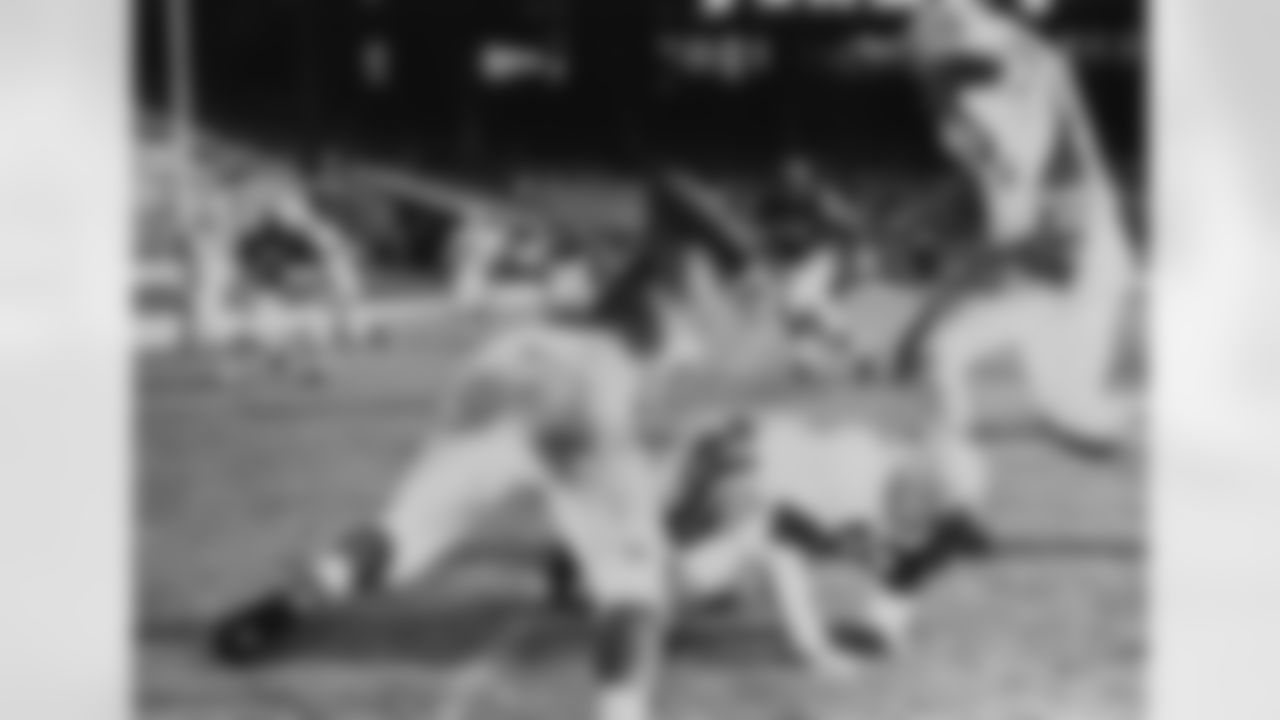
Cleveland Browns guard Chuck Noll (65) throws a rolling block to take down New York Giants defensive end Joe Sulaitis (21) during an NFL game in Cleveland, Dec. 6, 1953. (AP Photo/Pro Football Hall of Fame)
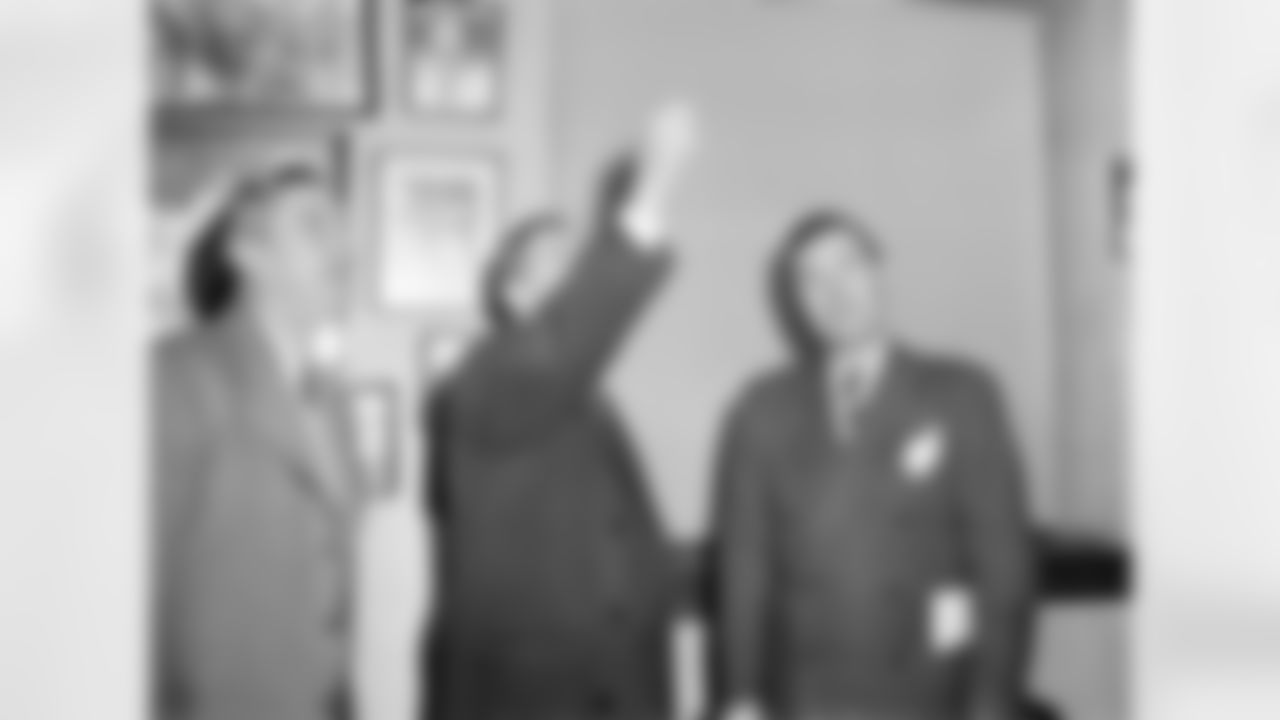
Pro football league commissioner Elmer Layden, center, flips a coin in Washington, D.C., Dec. 12, 1943, to decide the site of the play off game between the Washington Redskins and the New York Giants, as Redskins' owner George Marshall, left, and Giants' president John Mara, right, watch for coin to come down. New York got the nod as Mara called it right. (AP Photo/Herbert K. White)
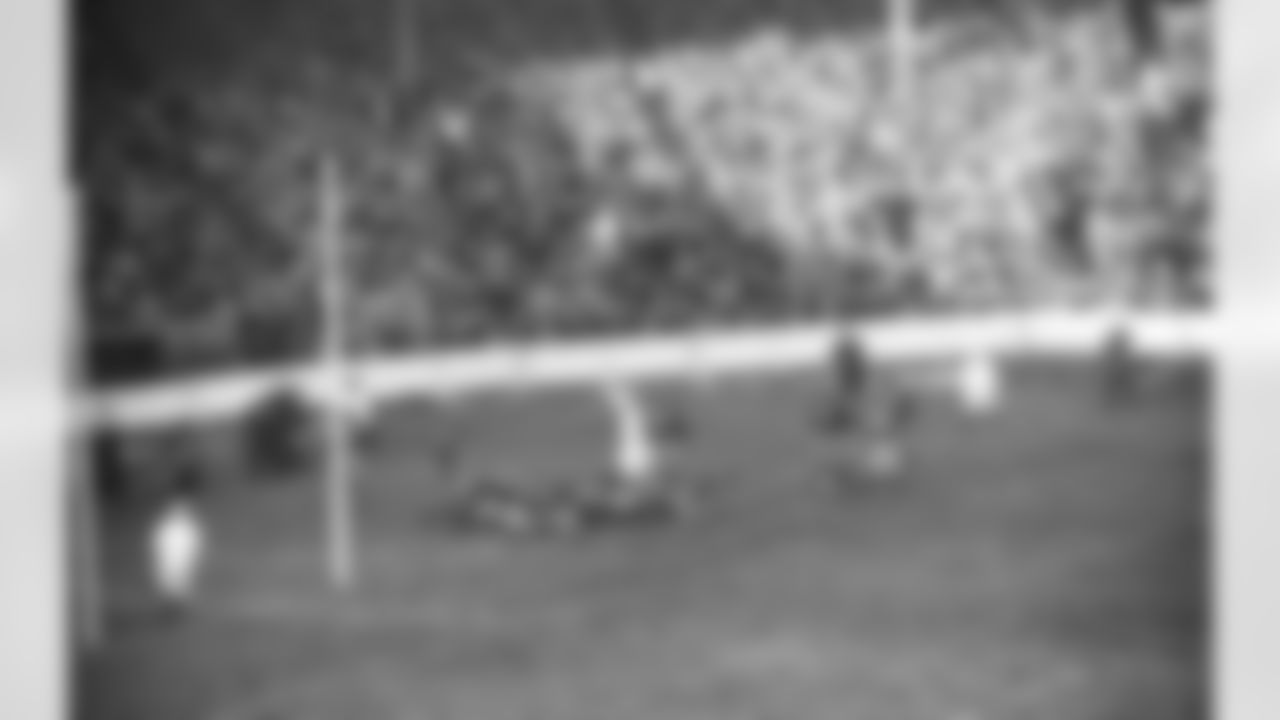
In this pile is John Karcis, Giant back, hugging the leather while an official flings up his arms to signal the Giants' first touchdown against the Washington Redskins at New York on Dec. 4, 1938. Giants went on to pile up a 36-0 score. (AP Photo)

New York Giants tackle Paul Stenn (68) is pictured in New York, 1942. (AP Photo/Pro Football Hall of Fame)
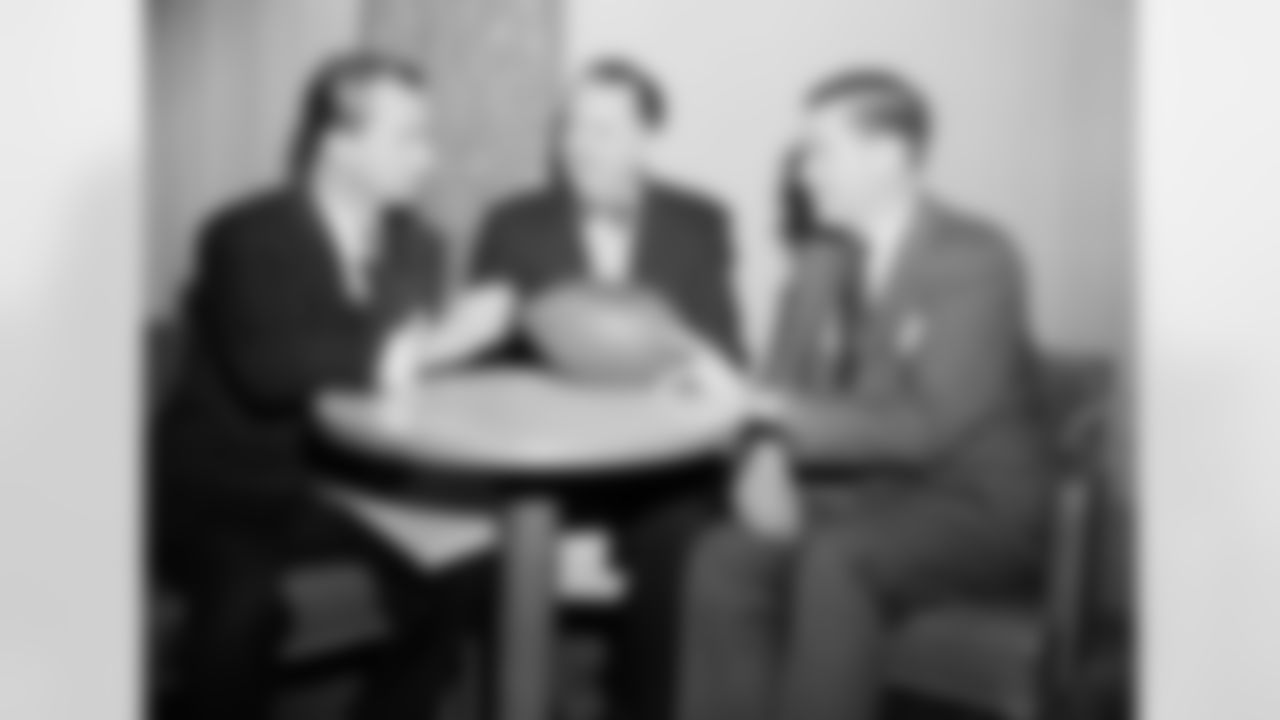
Three club owners at the National American Football League meeting talk over football problems at the league's opening session in Philadelphia, Jan. 19, 1950. From left: Dan Reeves of the Los Angeles Rams; Jim Clark of the Philadelphia Eagles, and Jack Mara of the New York Giants. (AP Photo/Sam Myers)

New York Giants quarterback Benny Friedman (1) is set upon by the Notre Dame All-Stars at the Polo Grounds in New York, Dec. 14, 1930 during a post-season exhibition game. (AP Photo)
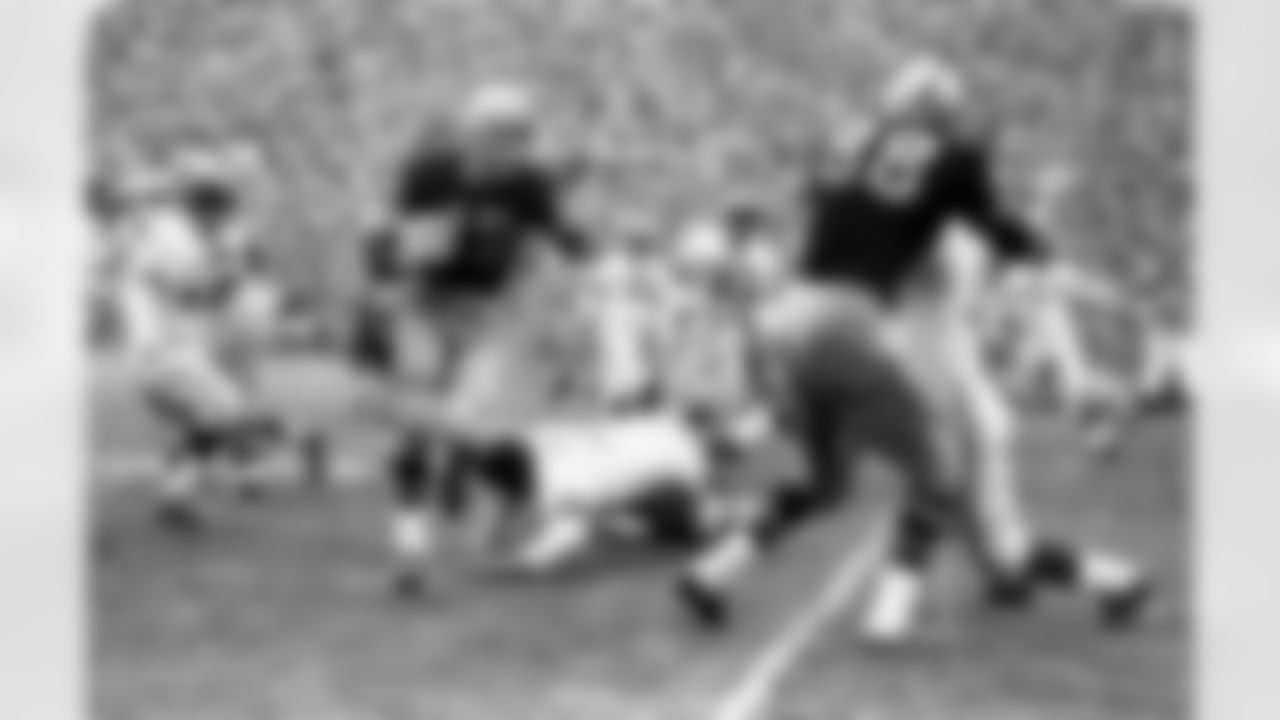
Green Bay Packers halfback Al Carmichael (42) runs upfield during an NFL game against the New York Giants at County Stadium, 1950s. (AP Photo/Vernon Biever)
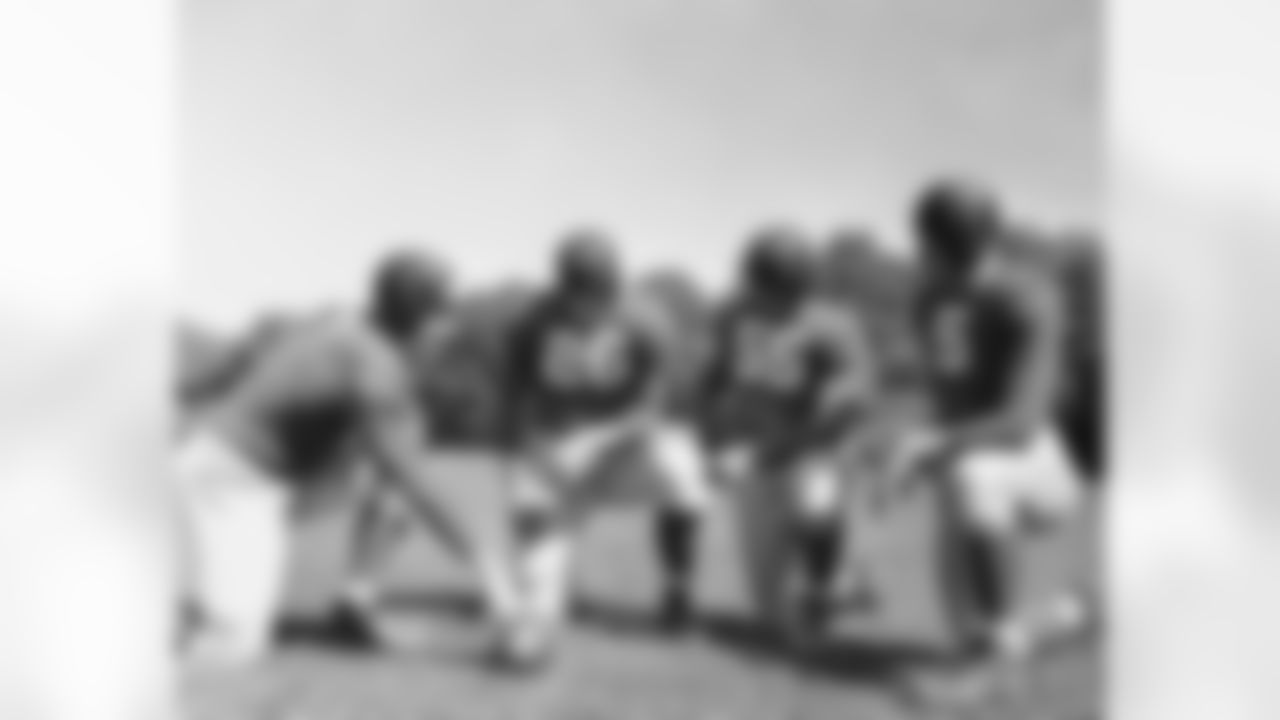
New York Giants Mel Hein, left and Kayo Lunday, right, of offer a bit of advice to Chester Gladchuk (26) All-American center of the Boston College team last, year, and Louis P. DeFilippo, (55) star pivot of the Fordham University Rams, who have donned Giants uniforms for the first time this season in New York, Sept. 25, 1941. (AP Photo)
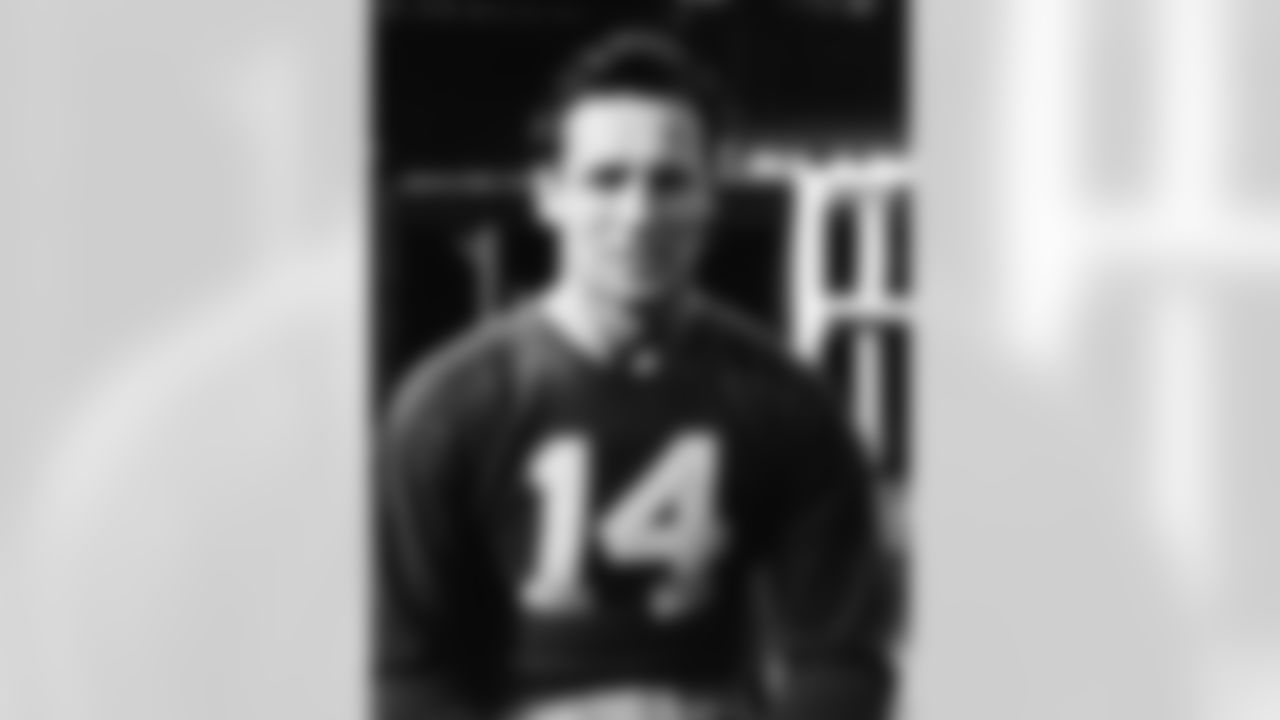
New York Giants football player Ward Cuff, 30 years old and 195 lbs. poses in 1945. Exact date and location unknown. (AP Photo)

Arnie Weinmeister, New York Giant tackle, during workout at the Polo Grounds in New York City in 1952. (AP Photo/Ray Howard)

New York Giants Mel Hein tackles veteran Tuffy Leemans, who was selected to carry the ball for this picture at the Polo Grounds in New York City Sept. 25, 1941, because he bounces better than anyone else on the team, remarked, after picking himself off the ground, that he had "never been hit harder." (AP Photo)

New York Giants' Mel Hein is seen in 1939. (AP Photo)
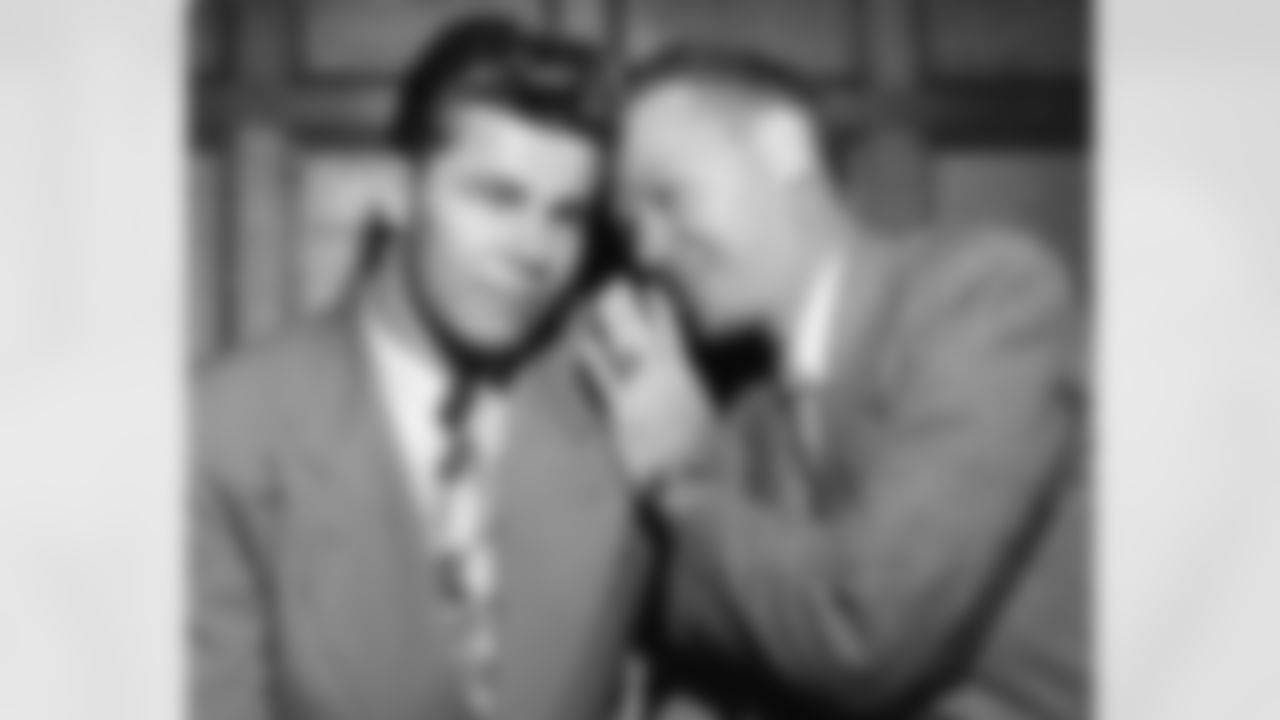
Southern Methodist football great Kyle Rote, left, is cornered by Wellington Mara, secretary of the New York Giants at the Quarterback Club Dinner in Detroit, Mich., Feb. 7, 1951. The Giants own the draft rights to Rote, even though he has not yet been signed to a professional grid contract. (AP Photo)

Arnie Weinmeister of the football New York Giants waters his front lawn at his home in Seattle, Wash., July 21, 1953. (AP Photo/Ed Johnson)
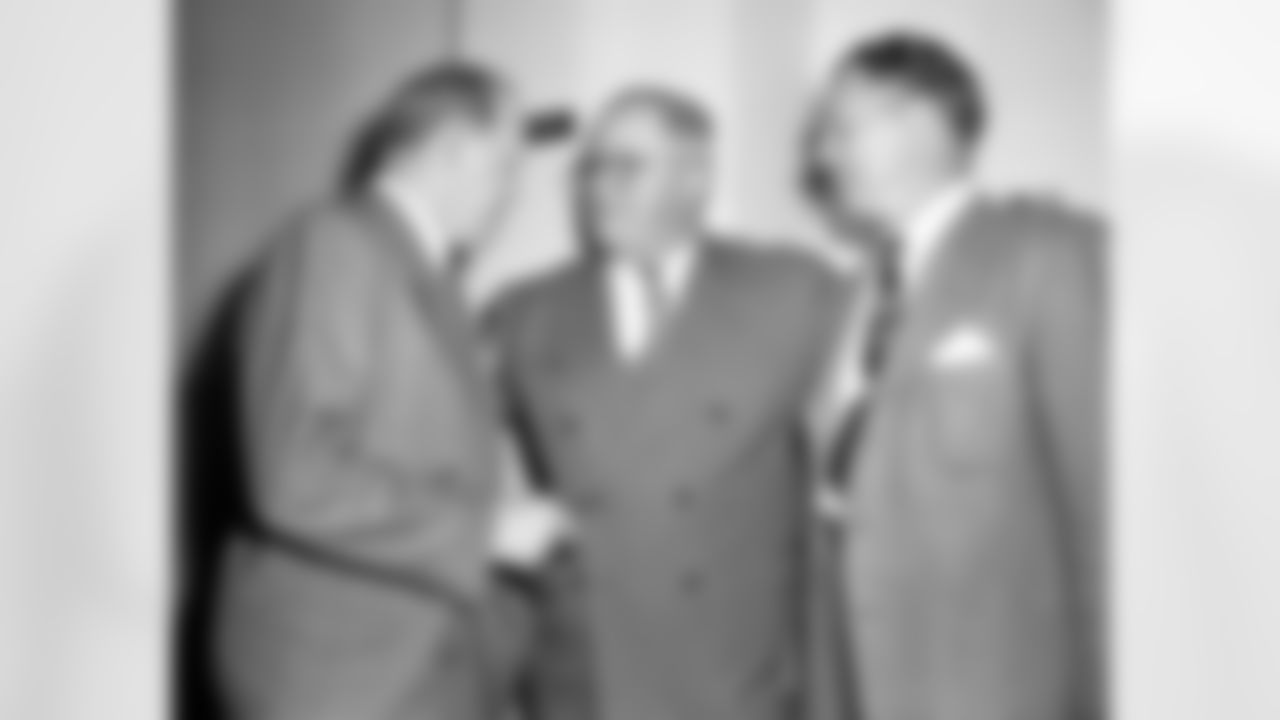
Talking things over at the NFL players draft in Pittsburgh, from left, are George Halas of Chicago, Steve Owen of the New York Giants and Curly Lambeau of the Green Bay Packers, Dec. 1947. (AP Photo/Walter Stein)

Giants Fans, jubilant over their teams 9-7 victory over the Washington Redskins to take the Eastern championship in the NFL, yanked the goal posts out of the ground after the game at New York's Polo Grounds, Dec. 3, 1939. (AP Photo)

Tim Mara, founder of the New York Giants of the National Football League, is shown in a 1952 photo, location unknown. (AP Photo)
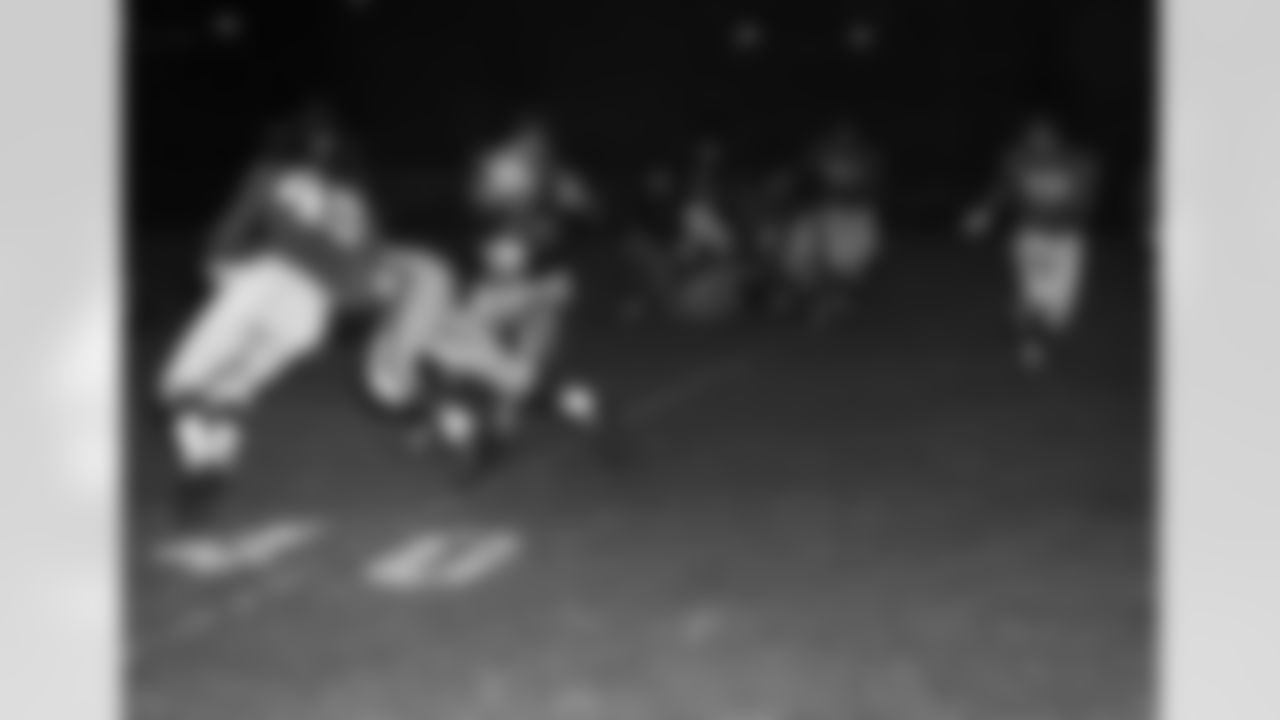
Halfback Joe Geri, of the Pittsburgh Steelers, despite the would-be tackler clinging on his back drives for eight yards through a hole in the New York Giants line in a National League opener in Pittsburgh at night on Oct. 1, 1951. Steelers blocker takes out Emlen Tunnell (45) the Giants and Steelers played to 13-13 toe. (AP Photo/Walter Stein)

This photo shows the official program from the Detroit Lions NFL game against New York Giants played on Nov. 7, 1943, in Detroit. (Hall of Fame via AP)
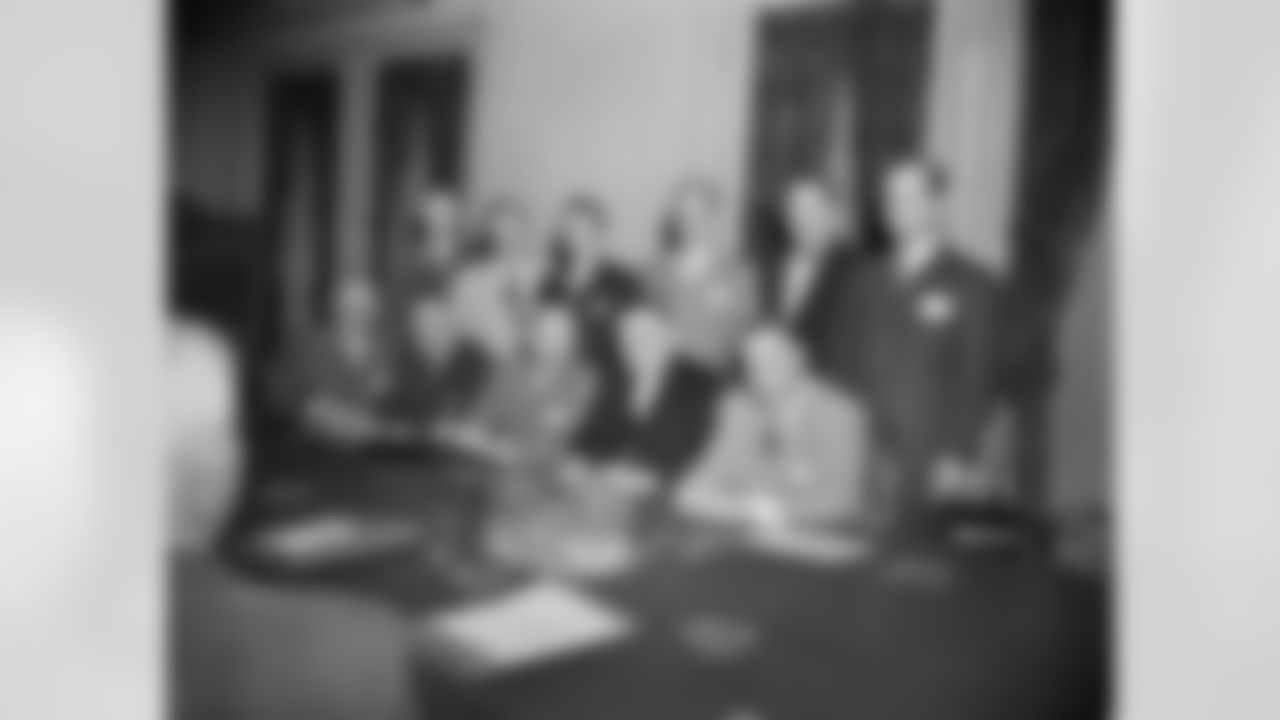
Club owners in the National American Football League meet in first session in Philadelphia on Jan. 19, 1950, to split into two divisions among other problems. Shown, seated, left to right are: George Halas, Chicago Bears; Emil Fishcer, Green Bay; Arthur McBride, Cleveland; league commissioner Bert Bell; Tony Morabito, San Francisco; standing, left to right are: Jack Mara, New York Giants; Ted Collins, New York Bulldogs; Daniel Reeves, Los Angeles; Edwin J. Anderson, Detroit; James Clark, Philadelphia; Walter Driskil, Baltimore. (AP Photo/Sam Myers)
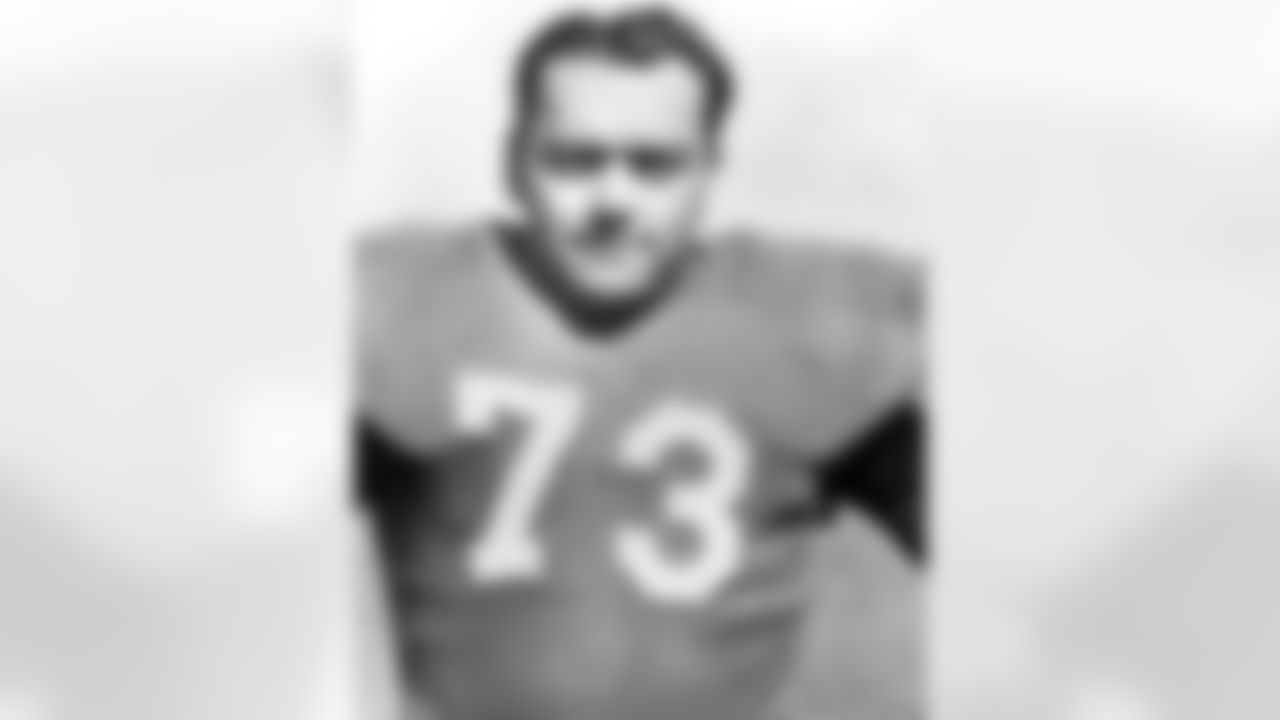
Tackle Arnie Weinmeister #73 of the New York Giants poses for a photo on Aug. 1, 1952 in New York. (Pro Football Hall of Fame via AP Images)

Commissioner Bert Bell, center, seated, holds hat while representative of eligible NFL teams, reach out in bonus draw in Chicago, Jan. 18, 1951. New York Giants, represented by John Mara (fourth from left, standing) won draw and chose Kyle Rote, Southern Methodist halfback. Standing (left to right): Dan Reeves, Los Angeles Rams; Emil Fisher, Green Bay Packers; John Michelsen, Pittsburgh Steelers; Mara; Victor Morabito, San Francisco 49ers, Norm Strader, New York Yanks. Seated (left to right): Ray Bennigson, Chicago Cardinals; Bell, and Paul Brown, Cleveland Browns. (AP Photo/Charles Knoblock)
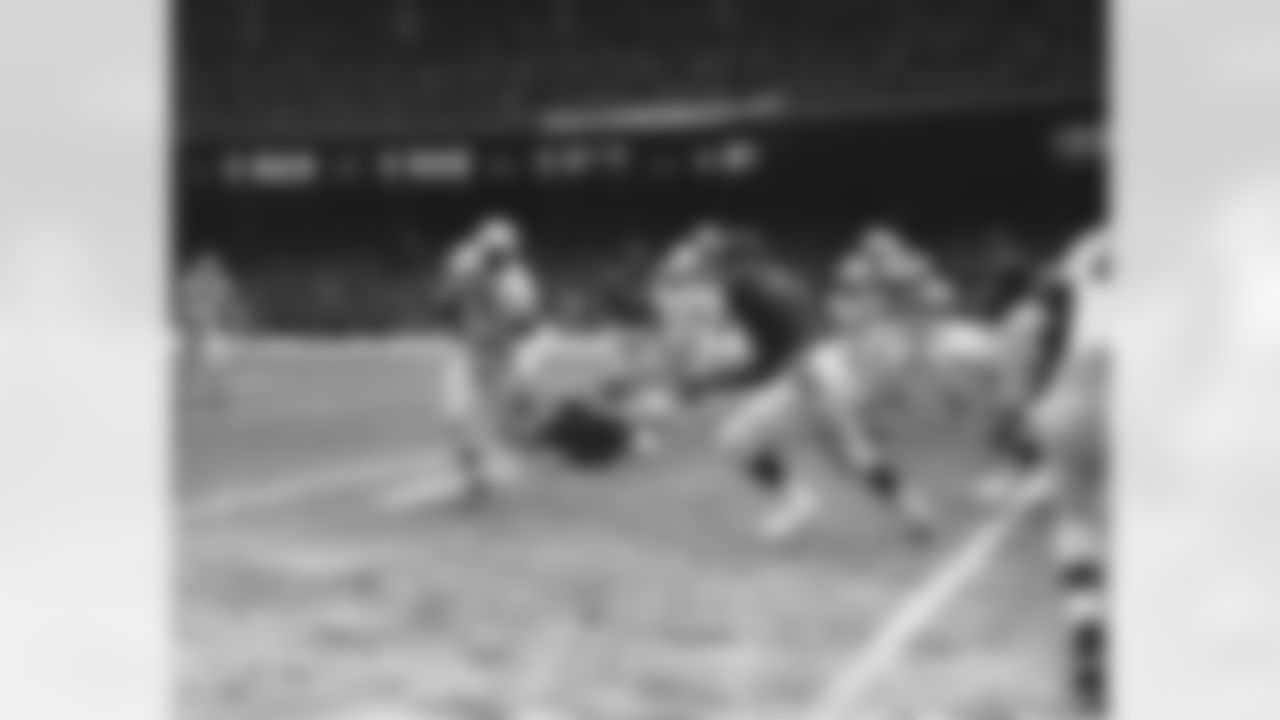
Fullback Marion Motley (76) gains one yard for the Cleveland Browns before he is pulled down by Jim Duncan, right, Giants' end in the first period of the play-off game at Cleveland, Ohio, between the Browns and the New York Giants in the American Conference on Dec. 17, 1950. Motley has just eluded Arnie Weinmeister (73), Giants tackle, lying on the ground in the center. (AP Photo/Harold Valentine)
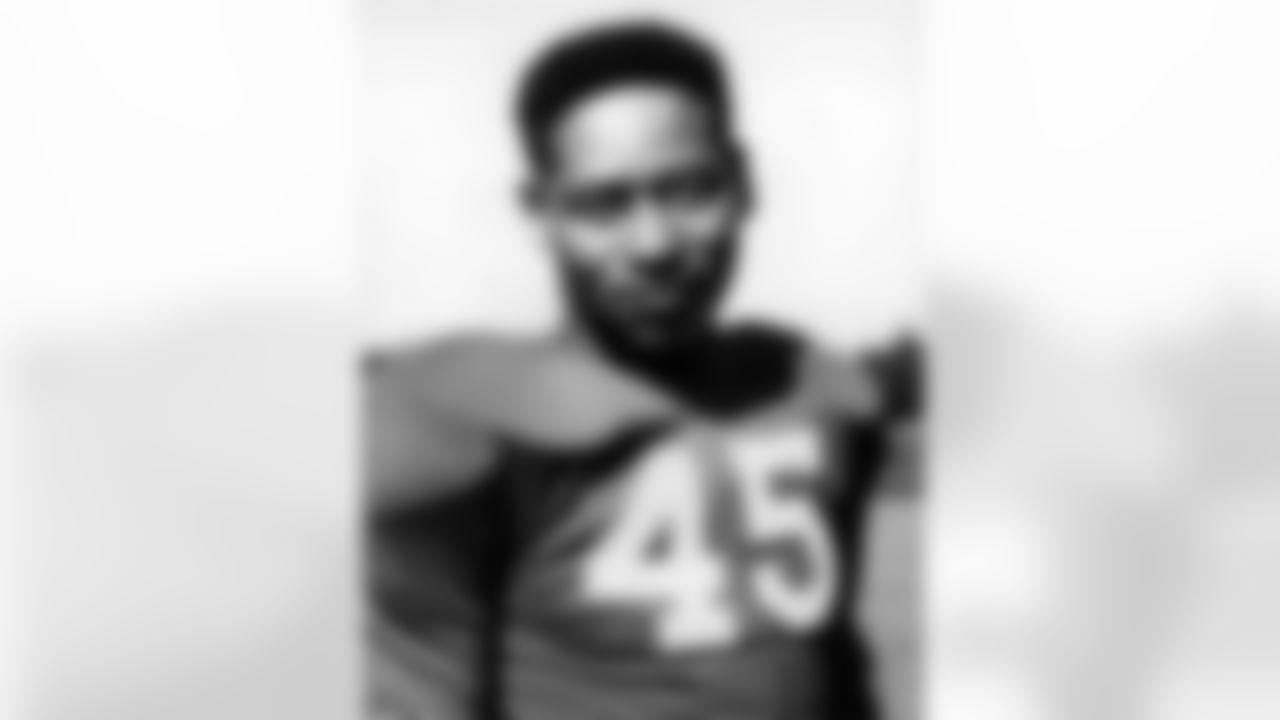
Emlen Tunnell, half back for the New York Giants, is shown in this 1951 photo. (AP Photo)
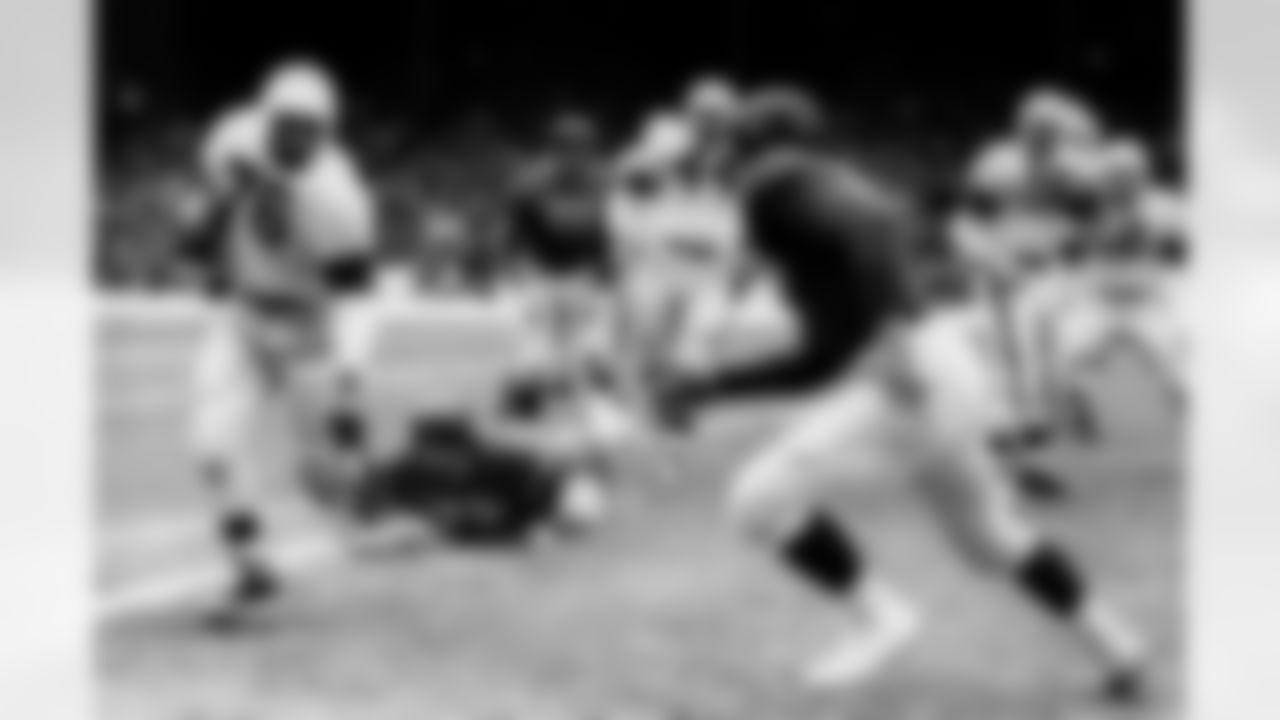
Cleveland Browns fullback Marion Motley (76) gains a yard before being pulled down by New York Giants' Jim Duncan, right, in 1950. AP Photo)
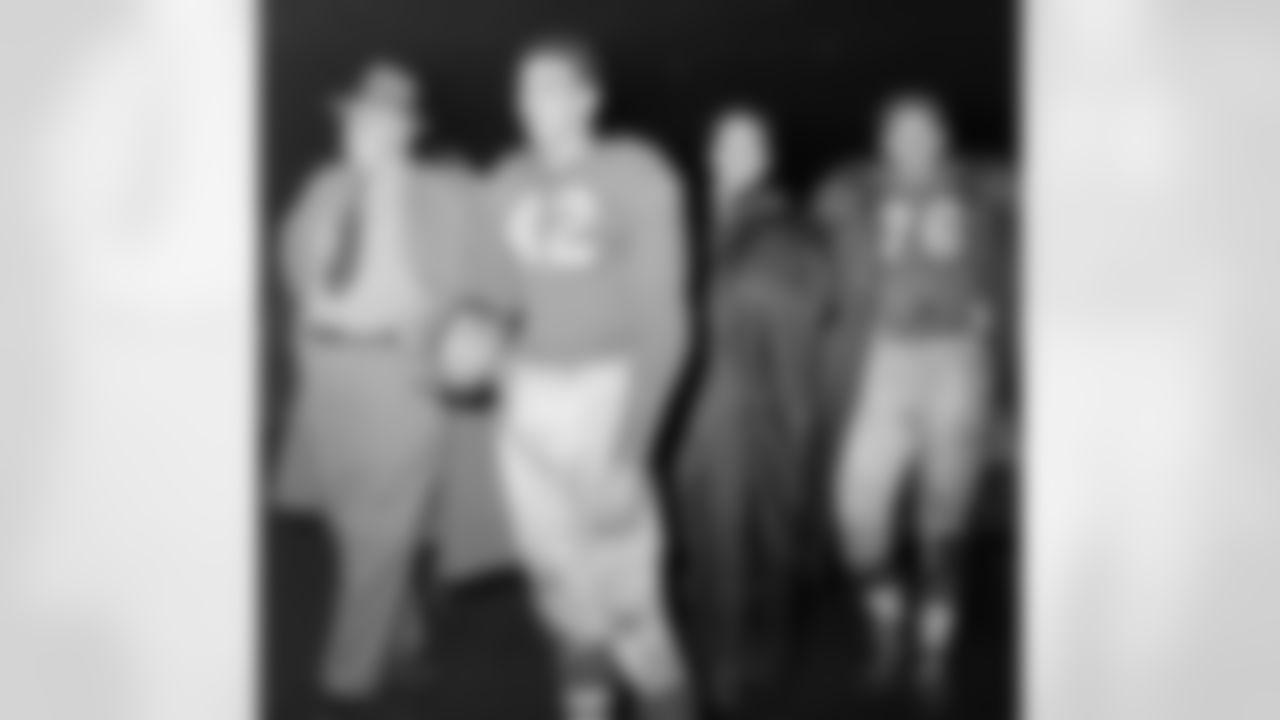
Chuck Conerly, New York Giant freshman back who set a new passing record in National football league, stands beside Giant coach Steve Owen during an anxious moment in Giant-Pittsburgh Steeler game on Dec. 5, 1948. Conerly completed 36 passes in 53 attempts but Steelers won 38-28. (AP Photo)

Ken Strong kicking and Ed Danawski holding the football on Sept. 13, 1939, location unknown. (AP Photo)
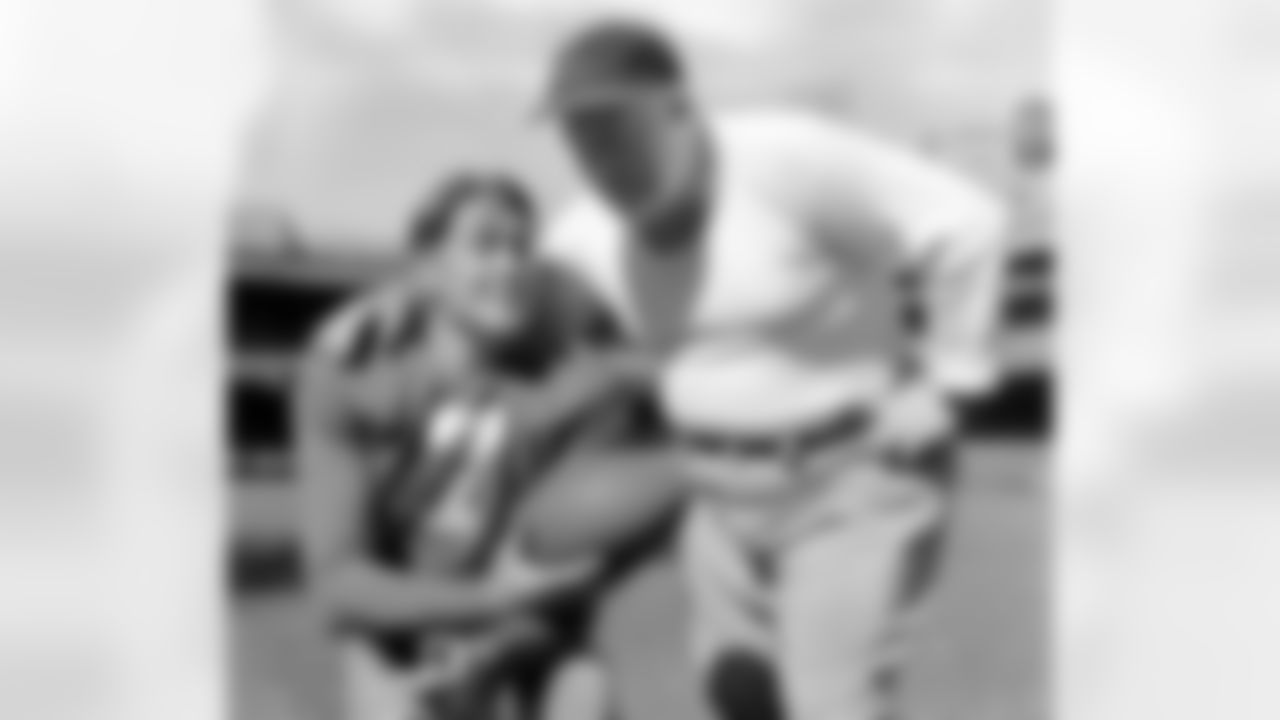
Capt. Mel Hein and Coach Steve Owen of the New York Giants football team in New York on Oct. 8, 1941. (AP Photo/Robert Kradin)
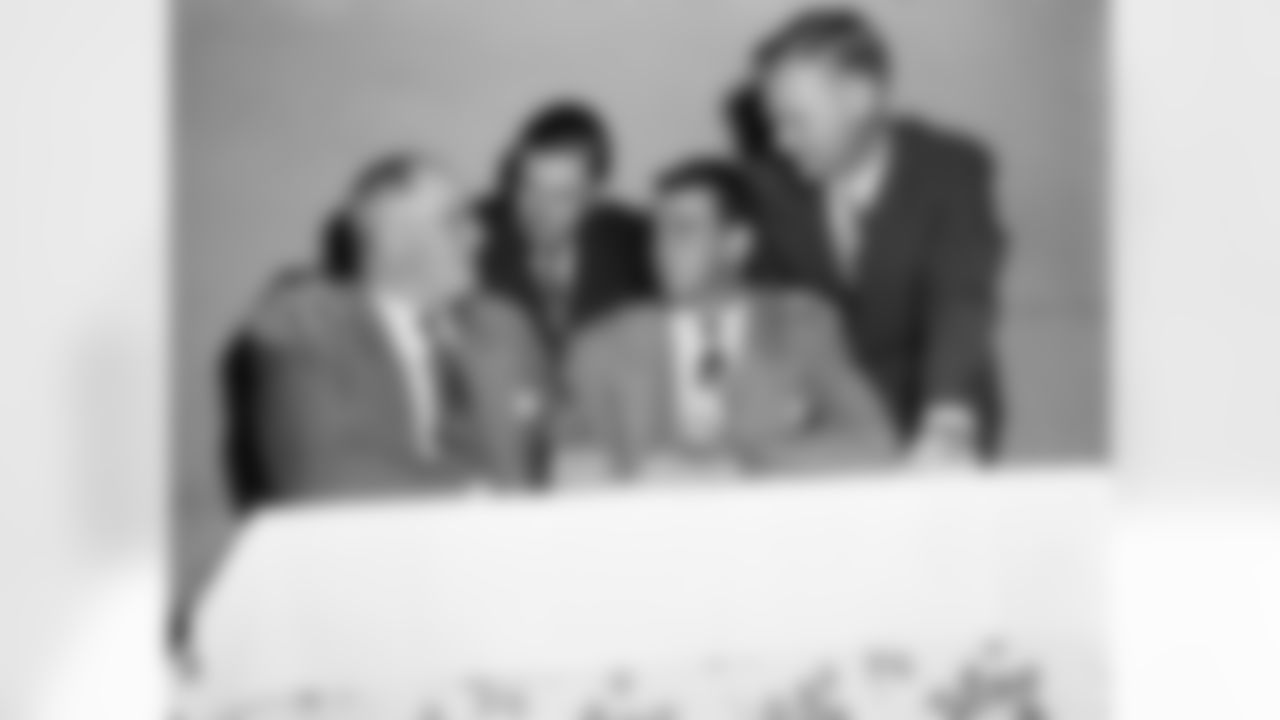
Charley Conerly, star passer of the University of Mississippi Football eleven of last season, signs contract to play with the New York Football Giants of the National Football League. Coach Steve Owen, left, sits beside Conerly as he signs up, at a luncheon in New York City on June 16, 1948. Looking on, left to right, are: John V. Mara, Club President, and his brother, Wellington T. Mara, secretary of the Professional club. (AP Photo)

NFL owners and coaches meet with Bert Bell, seated at center, league commissioner, July 20, 1947 in Pittsburgh. Left to right, seated: Art Rooney, Pittsburgh Steelers; Tim Mara, New York Giants; Bell; Curly Lambeau, Green Bay Packers; Fred Mandel, Jr., Detroit Lions. Standing: Dan Reeves, Los Angeles Rams; Walter Halas, Chicago Bears; Jack Mara, New York Giants; Roy Benningsen, Chicago Cardinals; George Marshall, Washington Redskins; Al Ennis, Philadelphia Eagles; Ralph Brizzolara, Chicago Bears. (AP Photo/Daniel P. Jacino)

American football player Red Grange of the Chicago Bears is shown during a game against the New York Giants in New York in 1925. The running back is known as the "Galloping Ghost." (AP Photo)
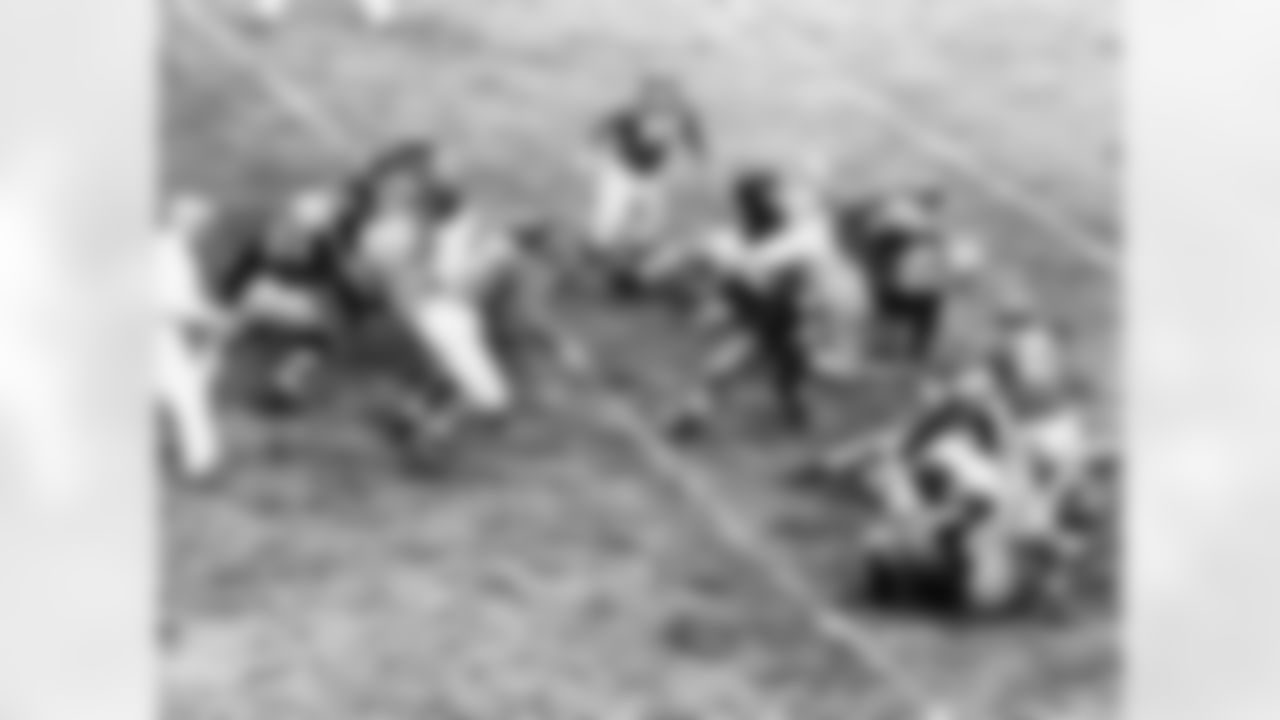
Andy Uram of the Green Bay Packers cracks through a hole in the center of the line to run smack into Mel Hein (7) New York Giants center, in the first quarter of a National Professional Football League game in New York City, Nov. 17, 1940. Uram made just one yard on the play. The Giants won, 7-3. Identifiable players: Packers Pete Tinsley (21) guard Bill Lee (40) tackle and George Svendsen (66) center; Giants Jim Poole (23) end. (AP Photo)
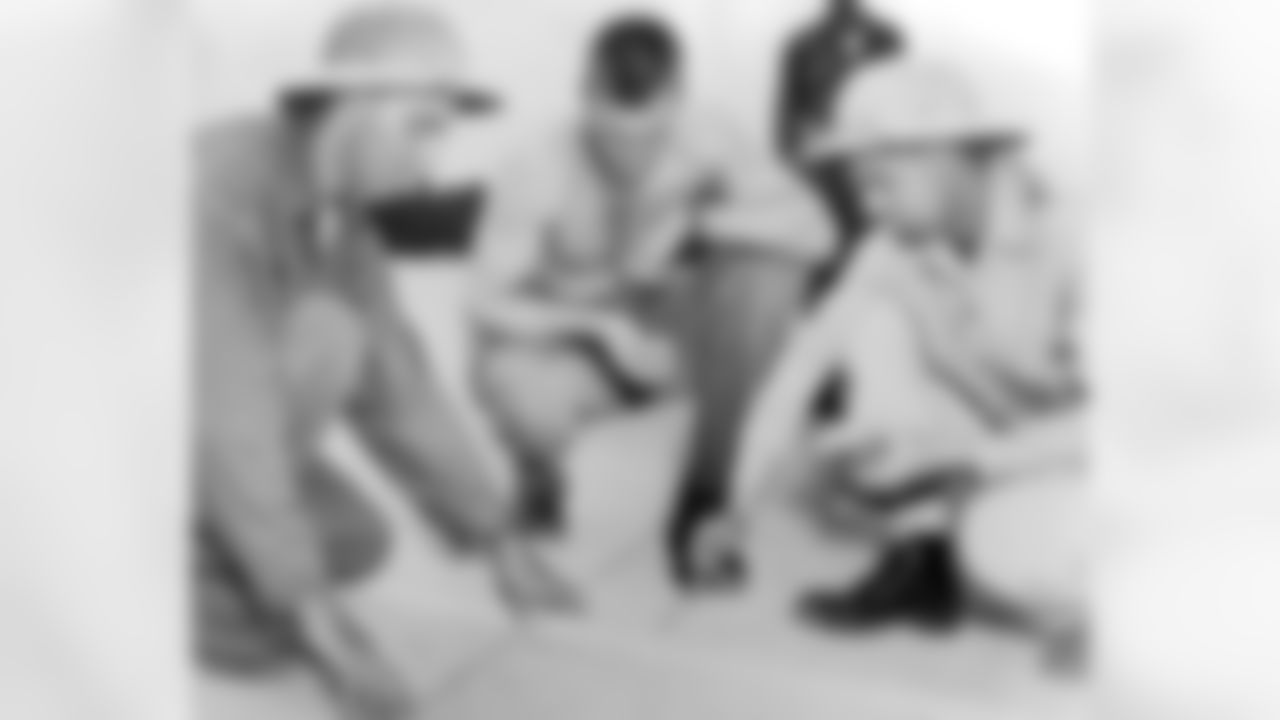
Al Blozis, center, during his military service in World War II. Blozis was drafted in the fifth round of the 1942 NFL Draft and played offensive tackle for the New York Giants of the National Football League. He played for the Giants in 1942 and 1943 before entering the military. He was also able to play three games in 1944 while on furlough. (Pro Football Hall of Fame via AP Images)
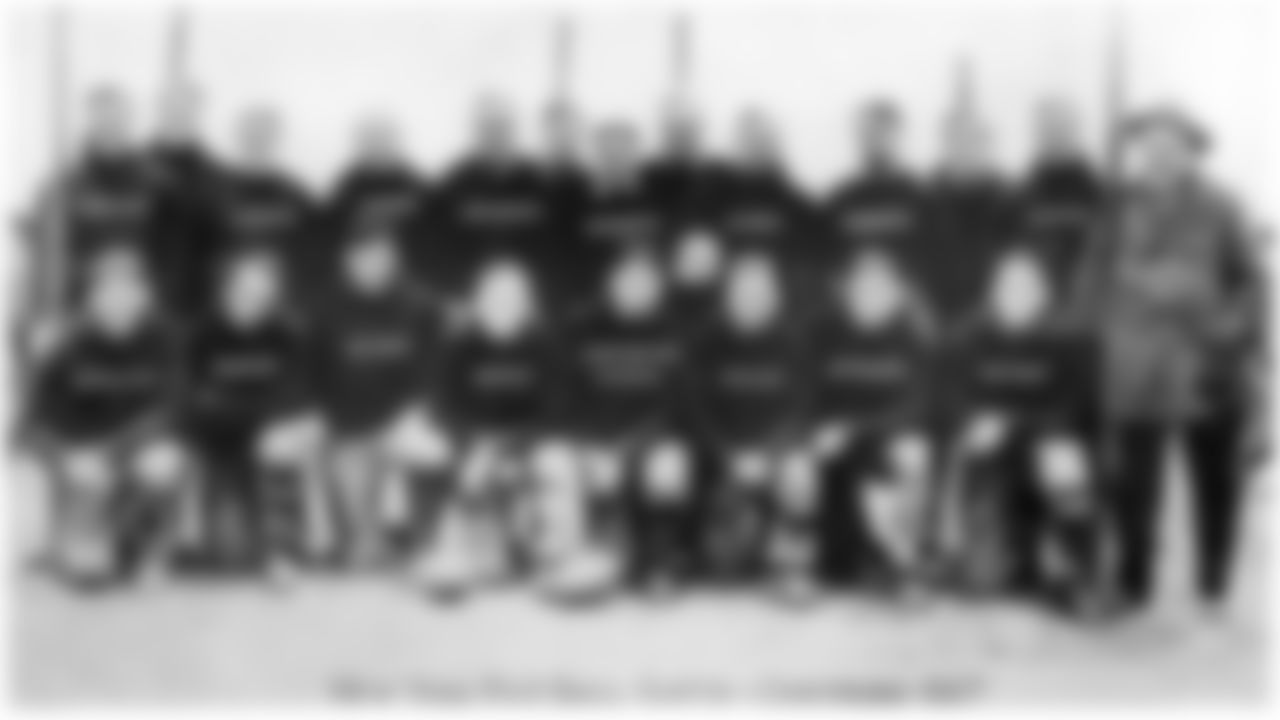
1927 New York Giants team photo, undated. (Pro Football Hall of Fame via AP Images)
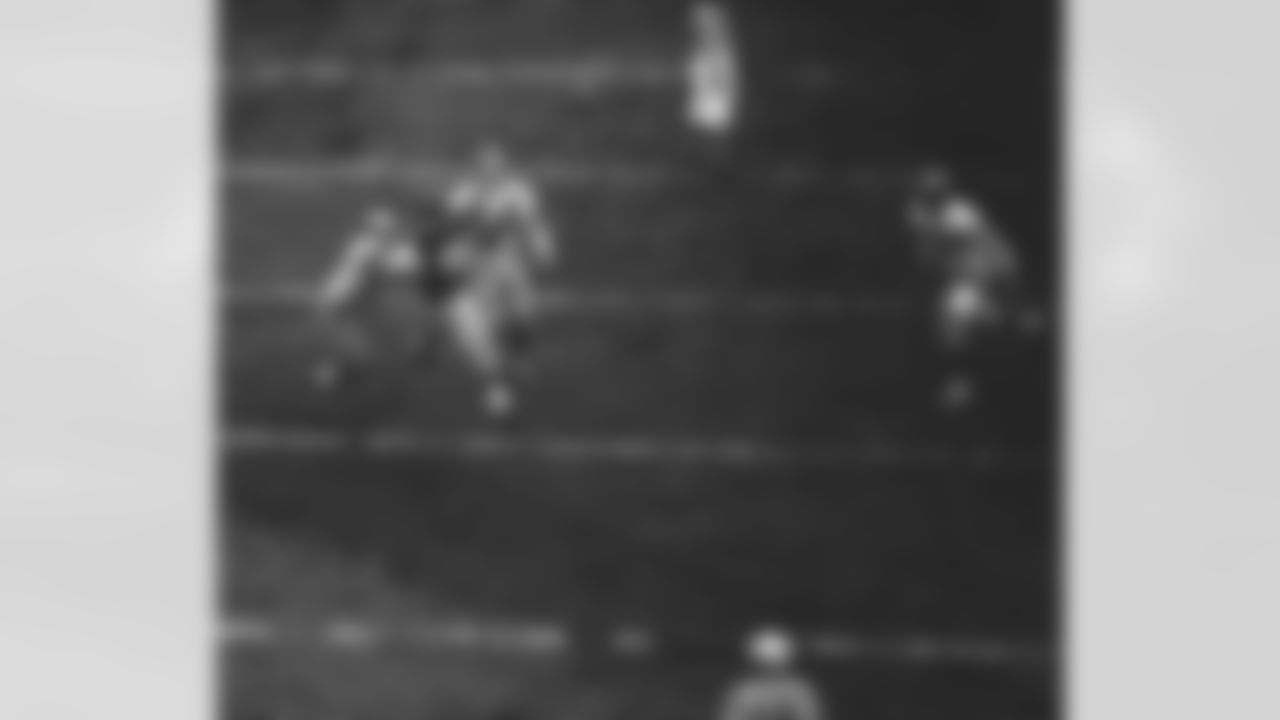
New York Giants halfback Kyle Rote catches a 22 yard pass from Charley Conerly, not shown, and carries Philadelphia Eagles Eddie Bell (81) into the end zone with him, to score the last Giants touchdown in the third period of their game Nov. 20, 1955 at the Polo Grounds in New York City. Other Eagles defenders are Linebacker Wayne Robinson (52) and Bob Hudson (42). The Giants won 31-7. (AP Photo/Harry Harris)
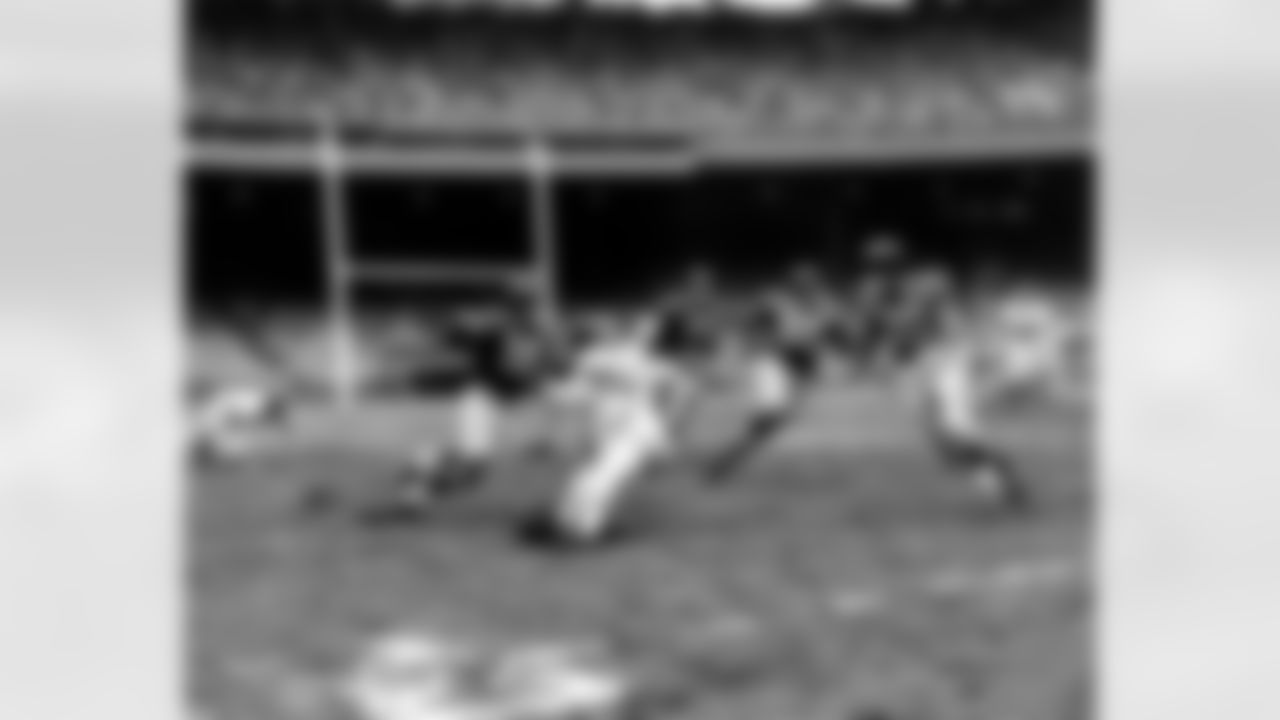
New York Giants halfback Frank Gifford (16), cuts past Baltimore Colts Jesse Thomas (40) for a 45-yard run at the Polo Grounds in New York, Nov. 13, 1955. Blocking for Gifford are Giants Bill Austin (60), Ray Wietecha (55) and Alex Webster (29). The Giants defeated the Colts 17-7. (AP Photo/ John J. Lent)

Emlen Tunnell of the New York Giants poses for a photo at the Polo Grounds in New York on Oct. 14, 1952. (AP Photo)
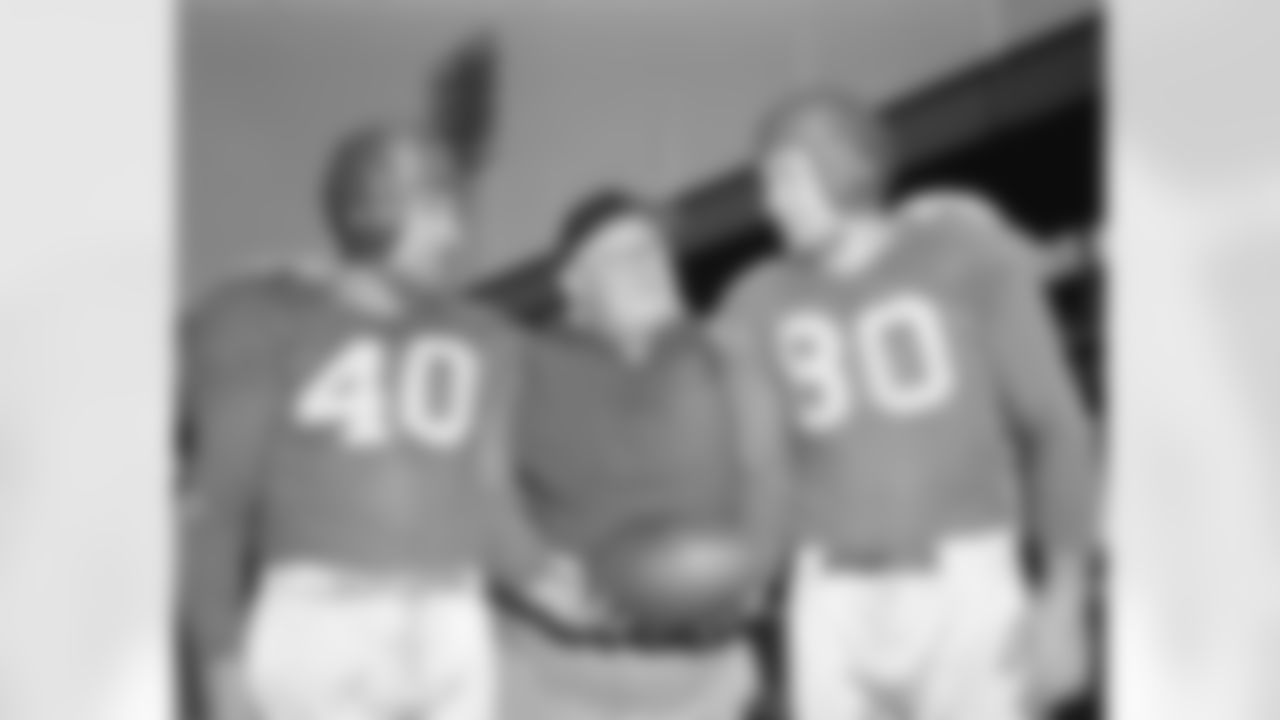
Coach Steve Owen, center, of the New York Giants, discusses the championship game with Chicago Bears quarterback Frank Filchock, left, and end Jim Poole during a workout at the Polo Grounds in New York, on December 11, 1946. (AP Photo)
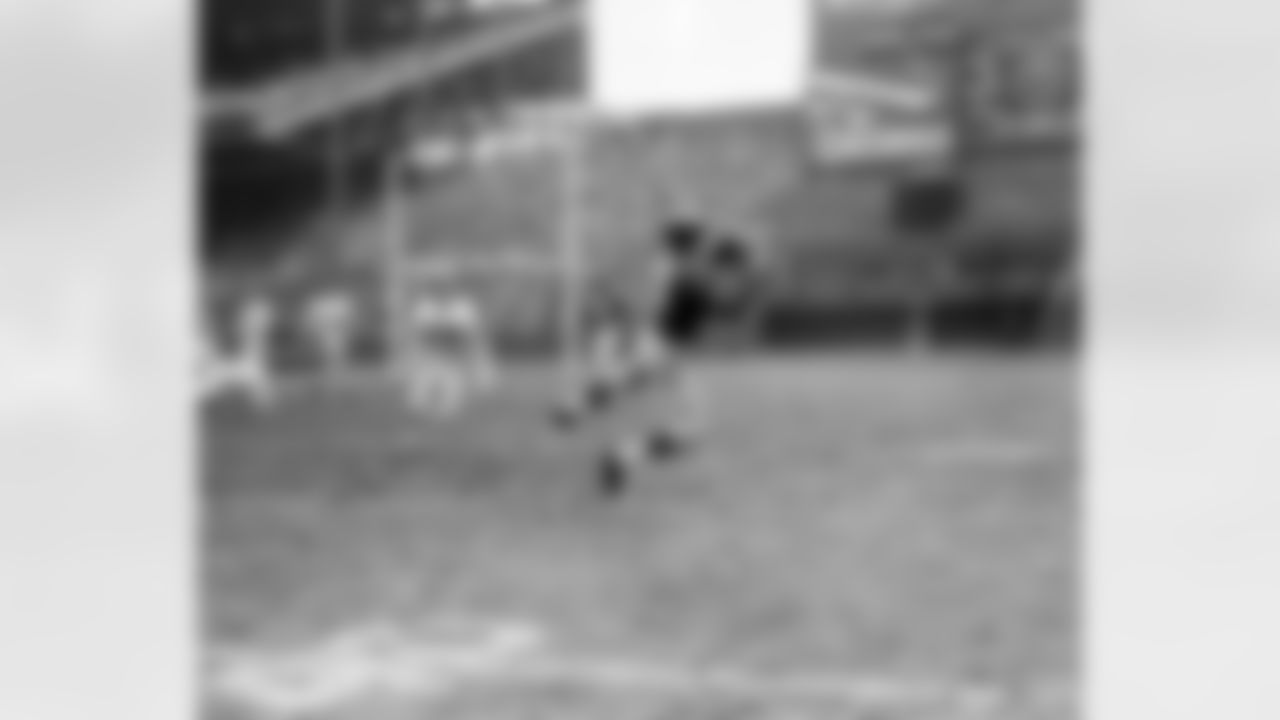
New York Giants' half back Frank Gifford hangs on to a pass from quarterback Don Henrich during game with the Baltimore Colts at the Polo Grounds, Nov. 13, 1955. Other players are Colts' Doug Eggers (67) and Giants' Mel Triplett (33). (AP Photo/John Lent)
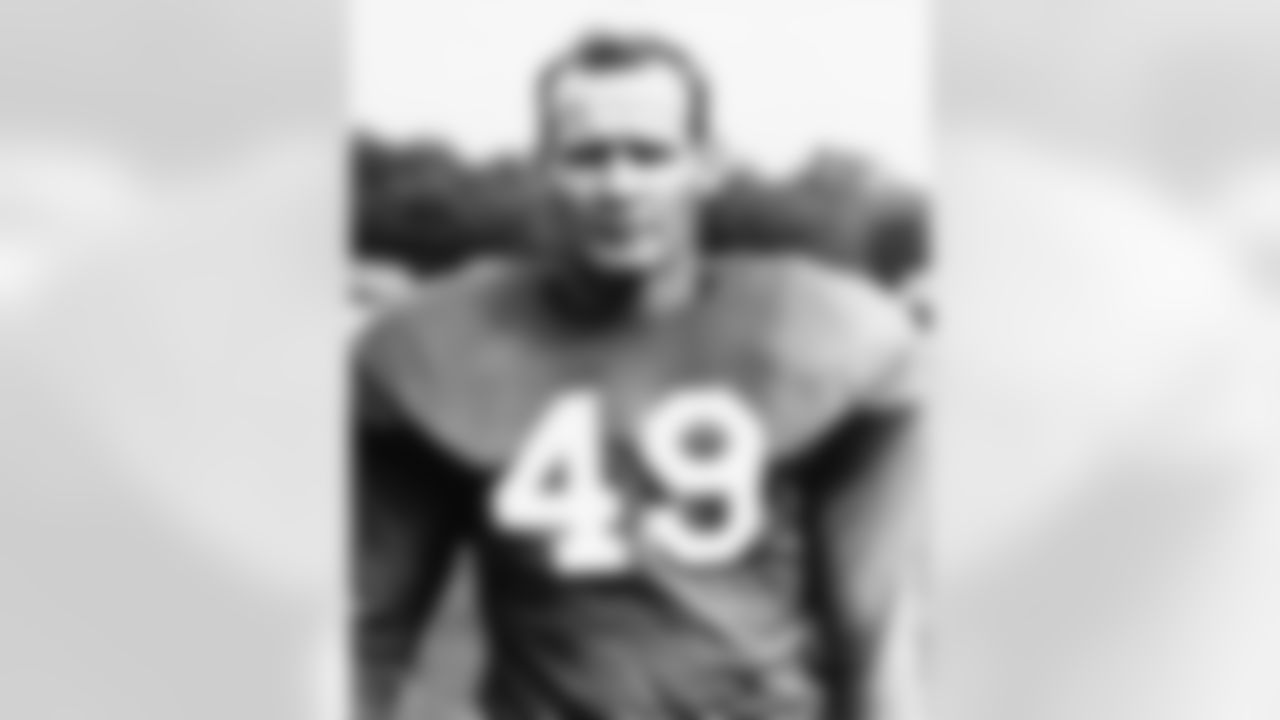
This picture of Tom Landry in December, 1954, when he played in the defensive backfield of the Giants. (AP Photo)
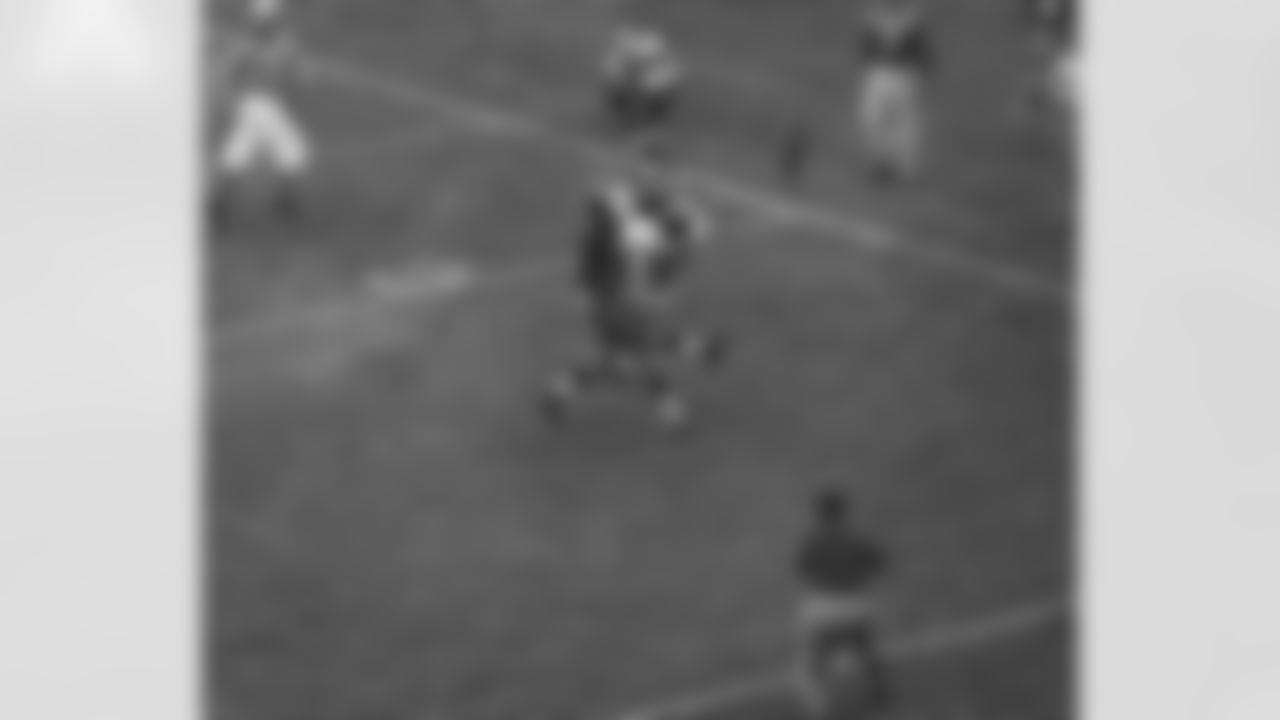
New York Giants end Bob Schnelker, (85), catches a pass in the end zone for a touchdown despite close guarding by Washington Redskins' safety man George Rosso, (20) in second quarter of game Oct. 24, 1954 at the Polo Grounds in New York City. Giant quarterback Charley Conerly fired the scoring pass from four-yard line. Giants won 24-7. (AP Photo/Harry Harris)
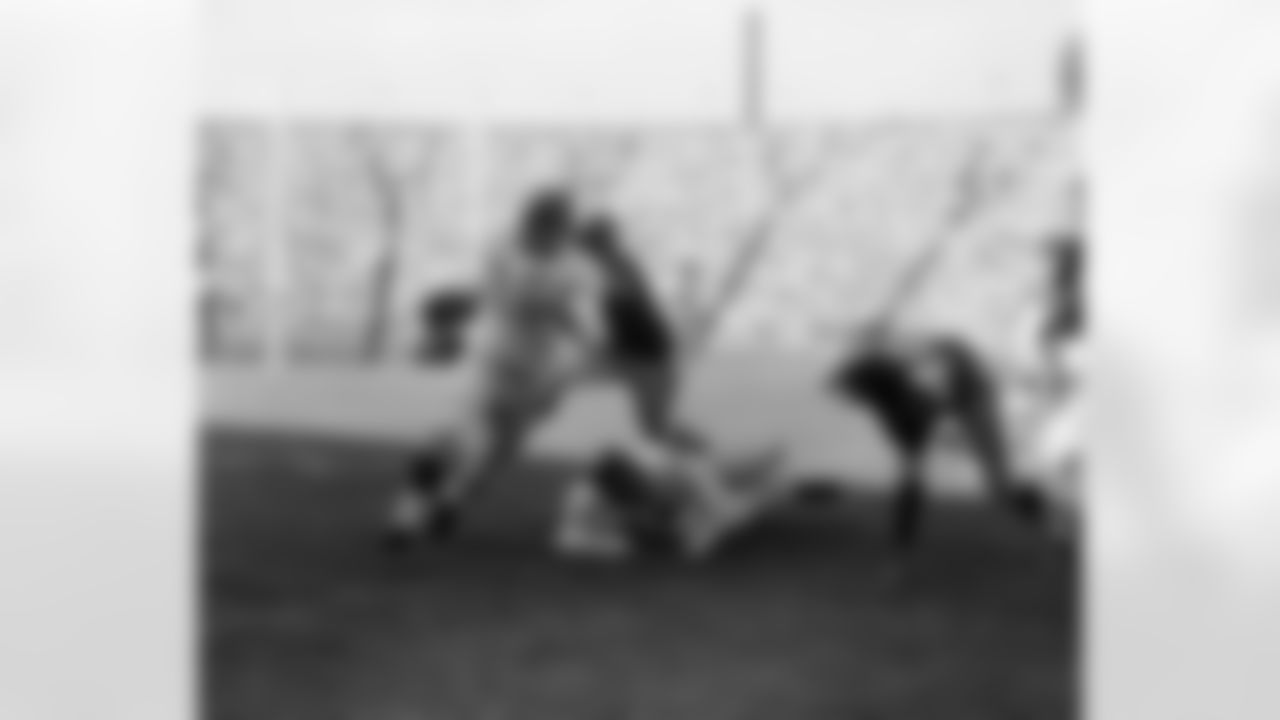
New York Giants' half back Frank Gifford carries the ball during pro exhibition game with the San Francisco 49ers, Aug. 20, 1955. Others are New York's Jack Stroud (66), on ground, and 49er George Maderos (40). (AP Photo)
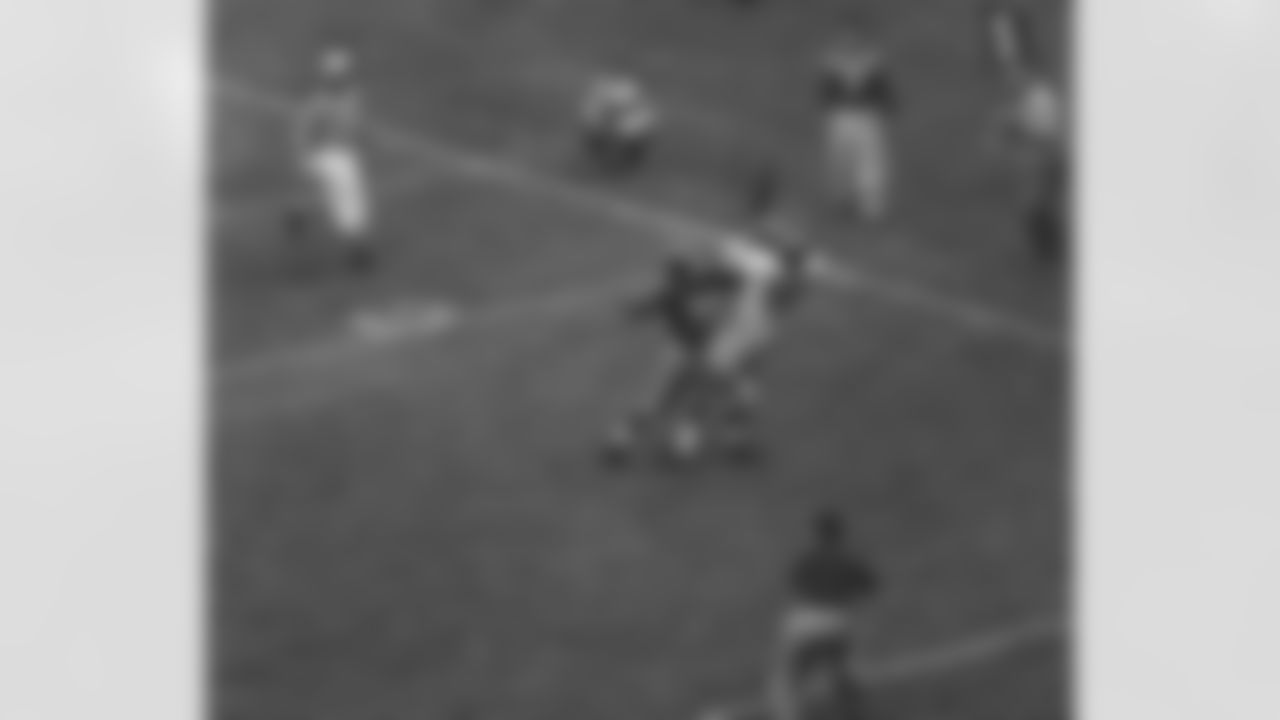
New York Giants end Bob Schnelker, (85), catches a pass in the end zone for a touchdown despite close guarding by Washington Redskins' safety man George Rosso, (20) in second quarter of game Oct. 24, 1954 at the Polo Grounds in New York City. Giant quarterback Charley Conerly fired the scoring pass from four-yard line. Giants won 24-7. (AP Photo/Harry Harris)

Ray Poole expresses admiration to New York Giant Coach Steve Owen for the shoe with which he kicked three field goals Dec. 9, 1951 in Philadelphia, Pa., against Philadelphia to break a Giant record. Back of Poole is Eddie Price who boosted his season yardage gained to 833, another club record. At the rear of Owen is Kelly Mote who tallied one of the Giants' touchdown. Poole also kicked two extra points as the Giants won, 23-7. (AP Photo)
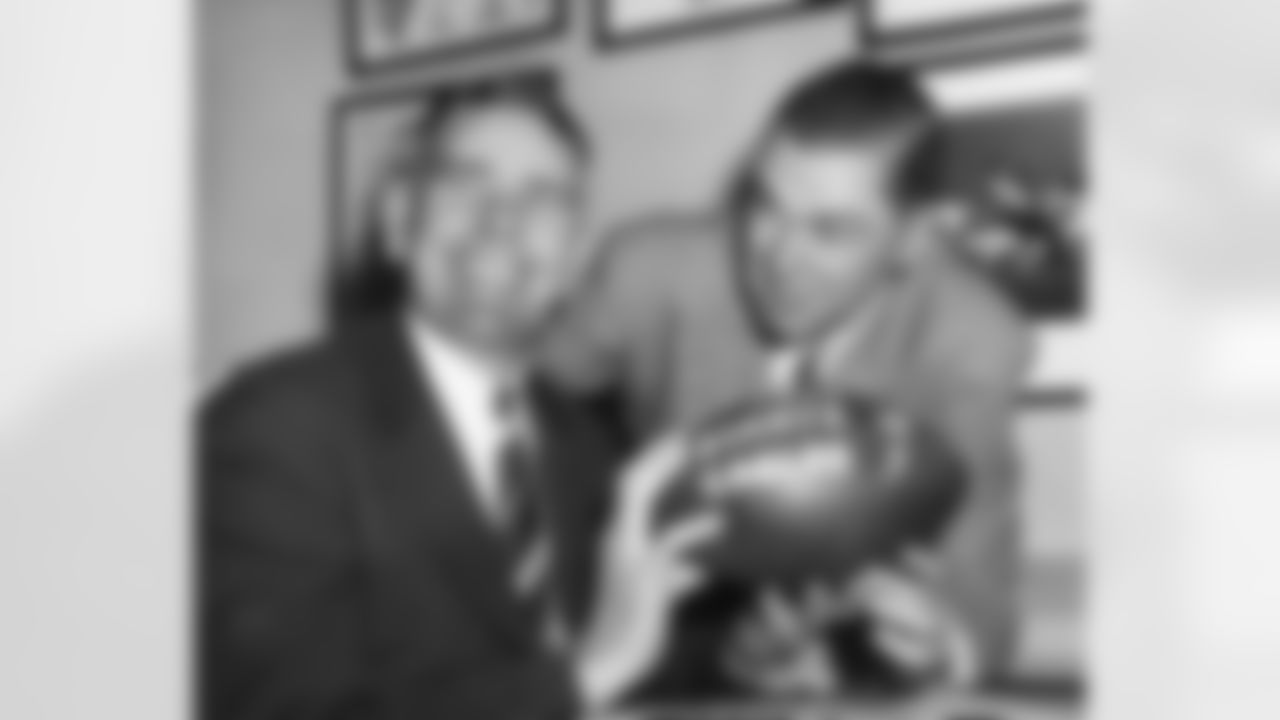
Jim Lee Howell, left, former star end, and assistant coach for the New York Football Giants, wears a big grin after being named team's head coach Dec. 15, 1953 in New York City. With Howell in club offices is John V. Mara, president of the football Giants, who signed Howell to a two-year contract for 1954 and 1955. (AP Photo)
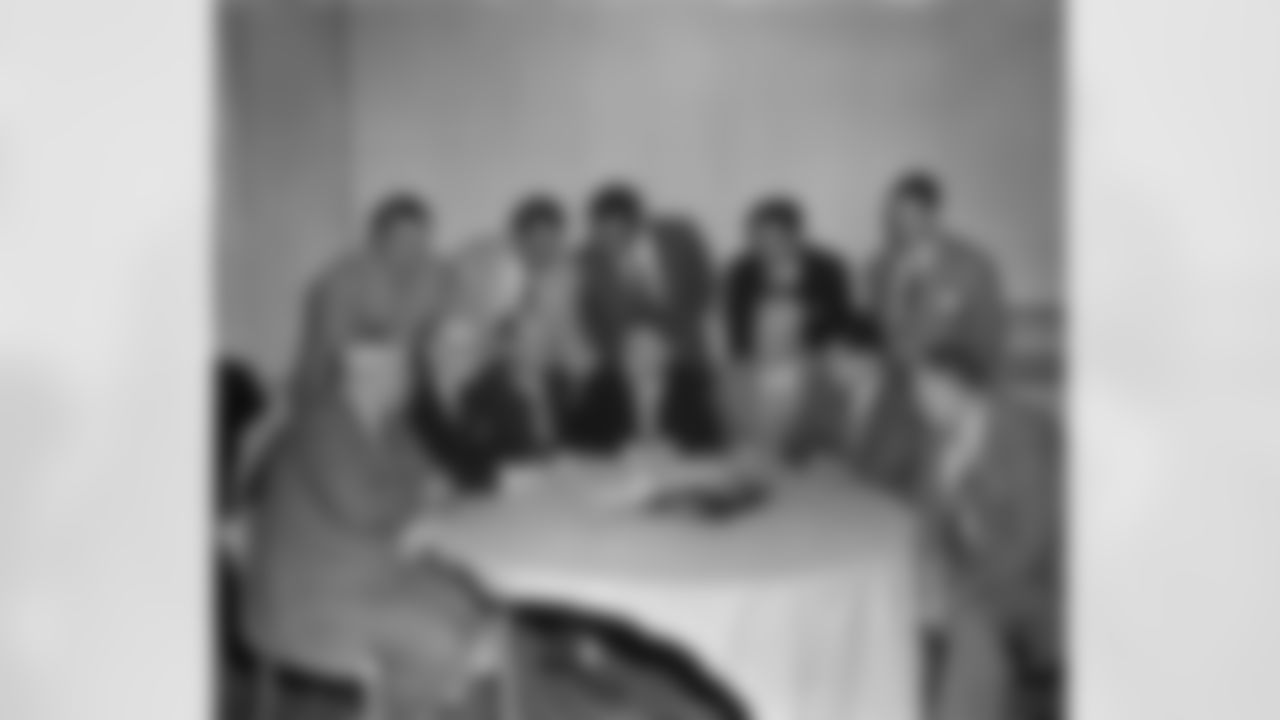
In roundtable session for the annual bonus draw, representatives of the NFL teams meet, Jan. 22, 1953 in Philadelphia, with commissioner Bert Bell, center, seated. Seated, from left: coach Steve Owens, New York Giants; George Halas, Chicago Bears; Paul Brown, Cleveland Browns; Bell; Lawrence "Buck" Shaw, San Francisco 49ers; Gene Ronzani, Green Bay Packers; Walter Kiesling, Pittsburgh Steelers; Buddy Parker, Detroit, Lions; Hampton Pool, Los Angeles Rams; James Trimble, Philadelphia Eagles; Joseph Kuharich, Chicago Cardinals; Don Kellett, president and general manager of Baltimore Colts. (AP Photo/Sam Myers)
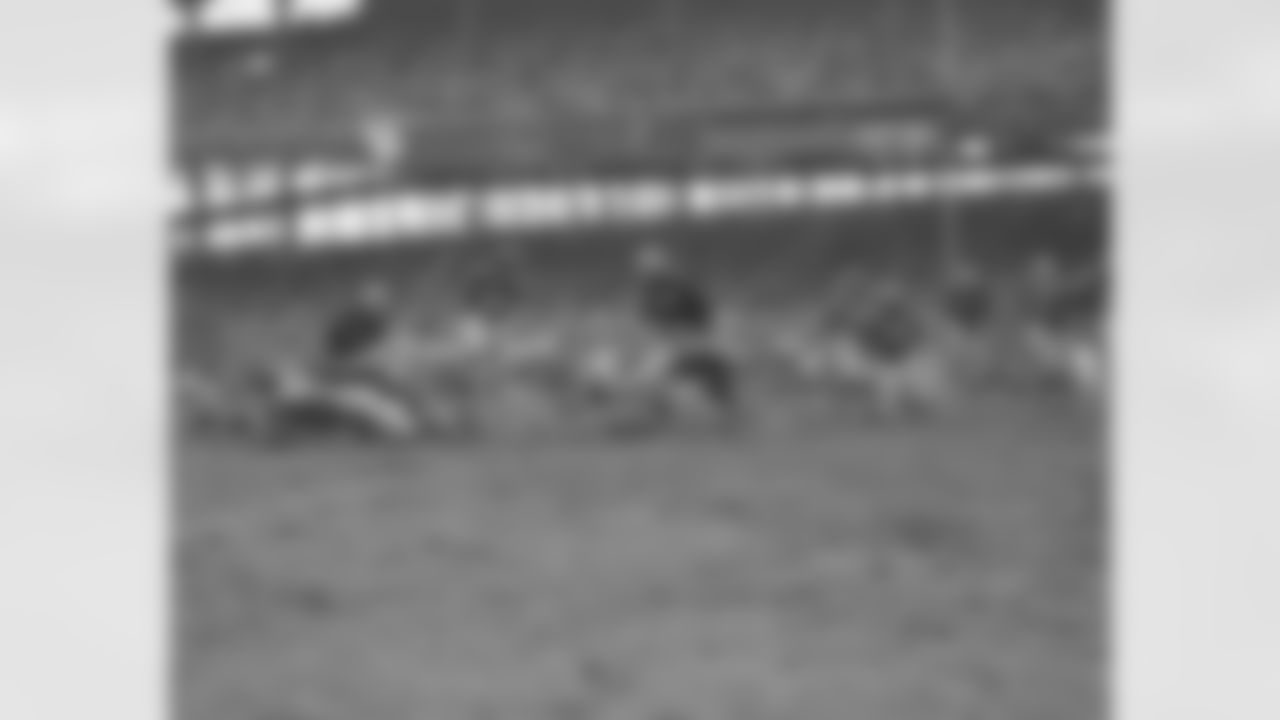
New York Giants halfback Bosh Pritchard (35) is aided by effective blocking as he goes through an opening for a 6 yard gain in first quarter of National Football League game with Pittsburgh Steelers at Polo Grounds in New York City, Dec. 2, 1951. Giant guard Duke Maronic (67) takes out a Steeler at left. Other identifiable player is Giant quarterback Chuck Conerly (42). (AP Photo/Harry Harris)

New York Giants running back Tom Landry is shown in practice at the Polo Grounds in New York, Oct. 14, 1952. (AP Photo/Ray Howard)

Kyle Rote, right, Southern Methodist University's great back, signs a one-year contract to play professional football with the New York Giants in Dallas, Texas, March 8, 1951. Wellington Mara, secretary to the National Football League Club, watches the signing. (AP Photo)

N.Y. Giants back Tom Landry shows off his form as team coach Steve Owens watches, Sept. 15, 1951. (AP Photo/Murray Becker)
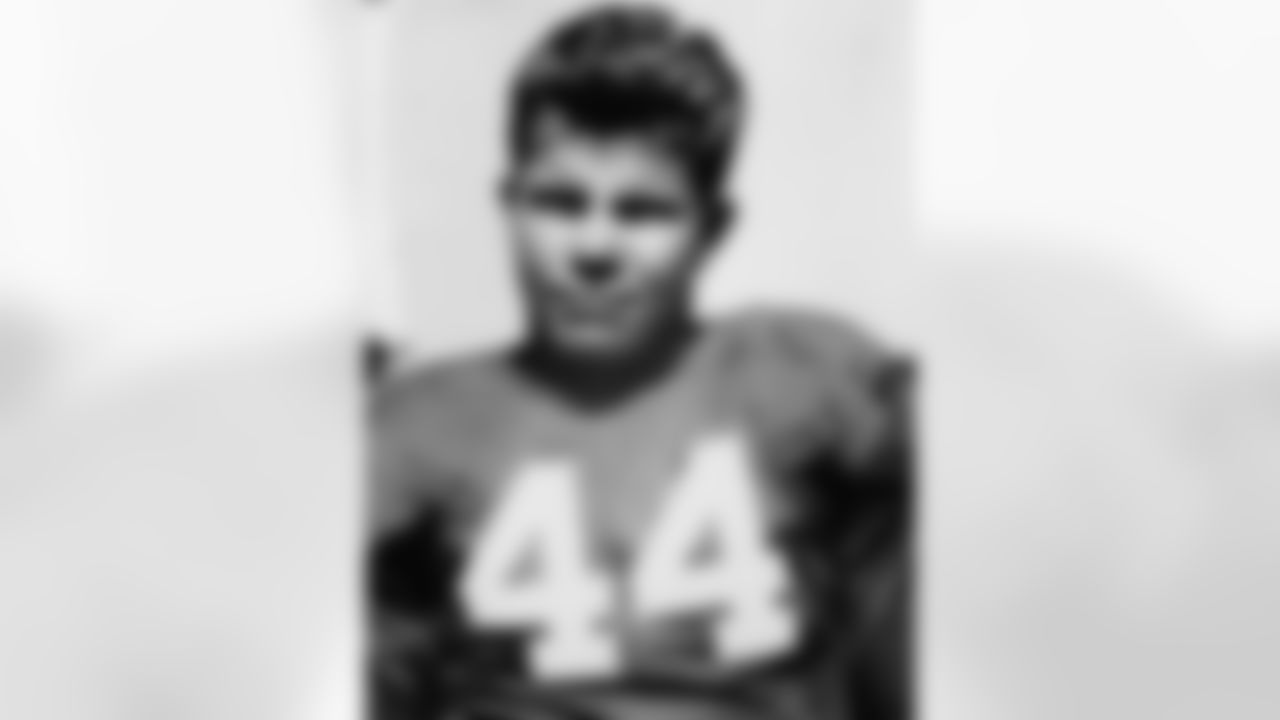
Kyle Rote, halfback for the New York Giants Sept 19, 1951. (AP Photo)
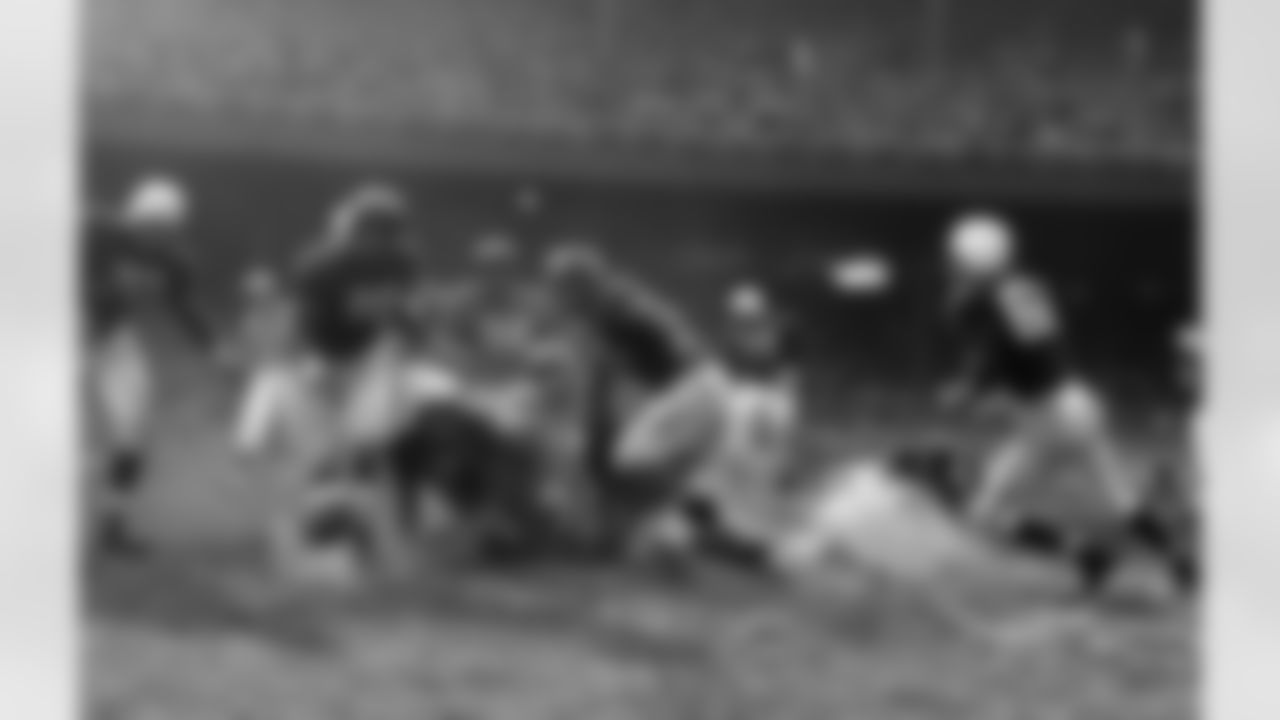
Elmer Angsman (7), Chicago Cardinal back hits the ground after fumbling the ball but teammate Knox Ramsey (70) recovered for a 10-yard gain in second period of National Football League game with the New York Giants in Polo grounds, New York City, Nov. 12, 1950. Other identifiable players are Jon Baker (60), guard; John Mastrangelo (66), guard; Harmon Rowe (22), back; and Bill Milner (61), guard, of the Giants and Bill Fischer (72), Cardinal Tackle. Giants won, 51 to 21. (AP Photo/HH)

Place kicking specialist of the New York Giants, Ken Strong kicks ball at New York's Polo Grounds. Teammate Hank Soar, who is holding the ball, January 3, 1947. (AP Photo)
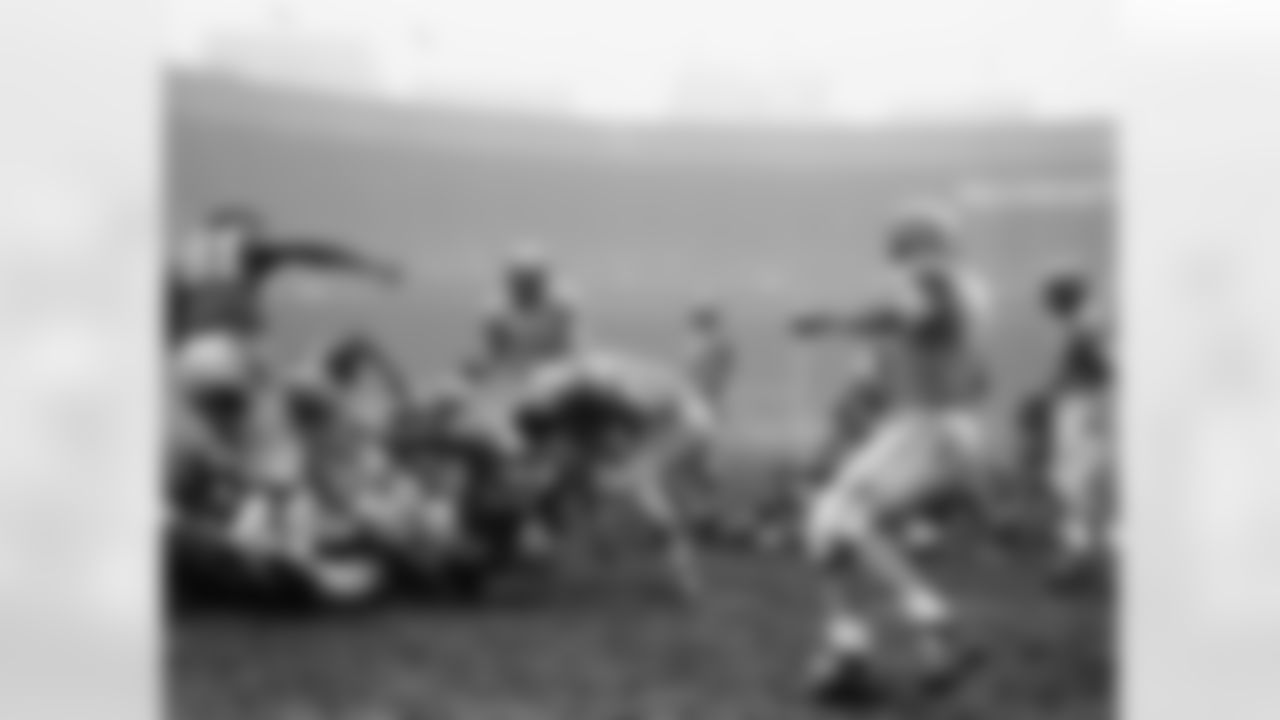
Eddie Price (31), New York Giants full back, twists over the goal line to rack up six point for the Giants in the first quarter of their game in the Polo Grounds in New York against the New York Yanks on Dec. 3, 1950. Joe Golding (10), Yanks back, brings him down, but too late to prevent the score. At left is Giants end Bill Swiacki (81). Looking on is Joe Domnanovich (34), Yanks center. Others unidentified. (AP Photo/HH)

Howard Hickey (53), Los Angeles Rams end cups his arms to catch pass thrown by teammate Jim Hardy for a touchdown in the first quarter of the New York giants-Rams game at the Polo Grounds, New York, on Nov. 14, 1948. Tony Minisi (38). Giants back, leaps high in and attempt to knock down the ball. (AP Photo/HH)
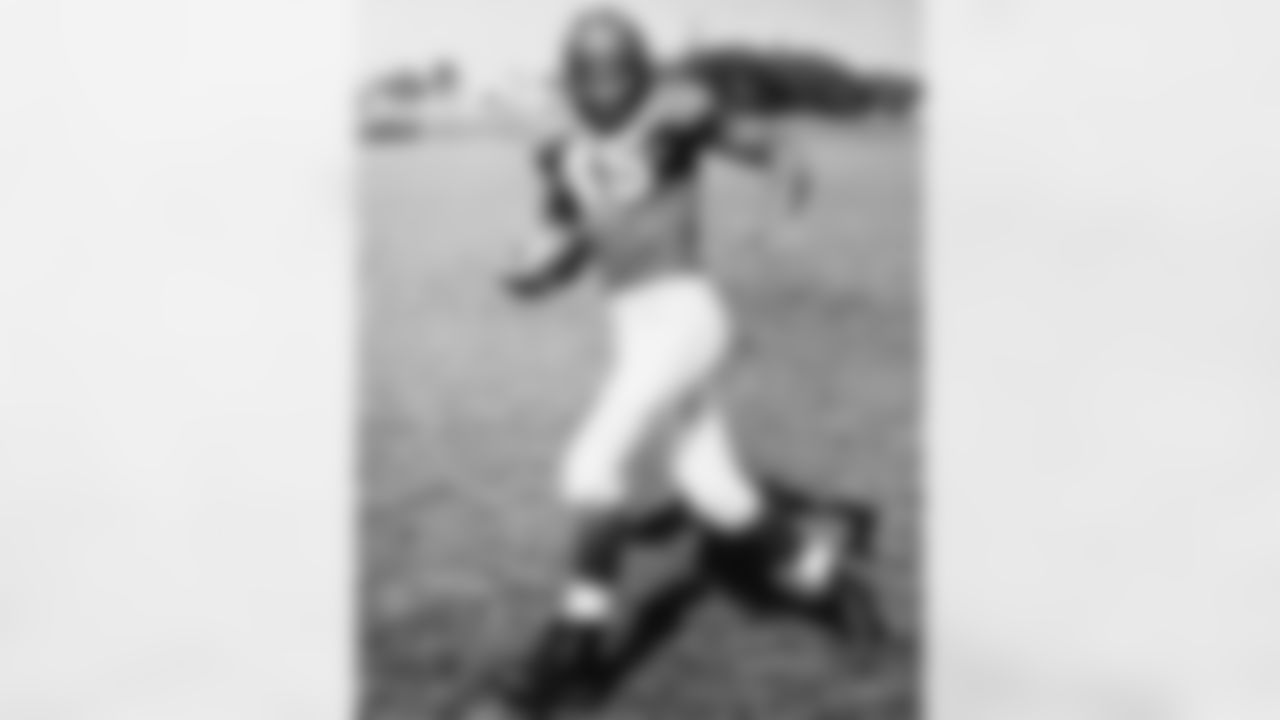
New York Giants' Emlen Tunnell, April 2, 1949. (AP Photo)
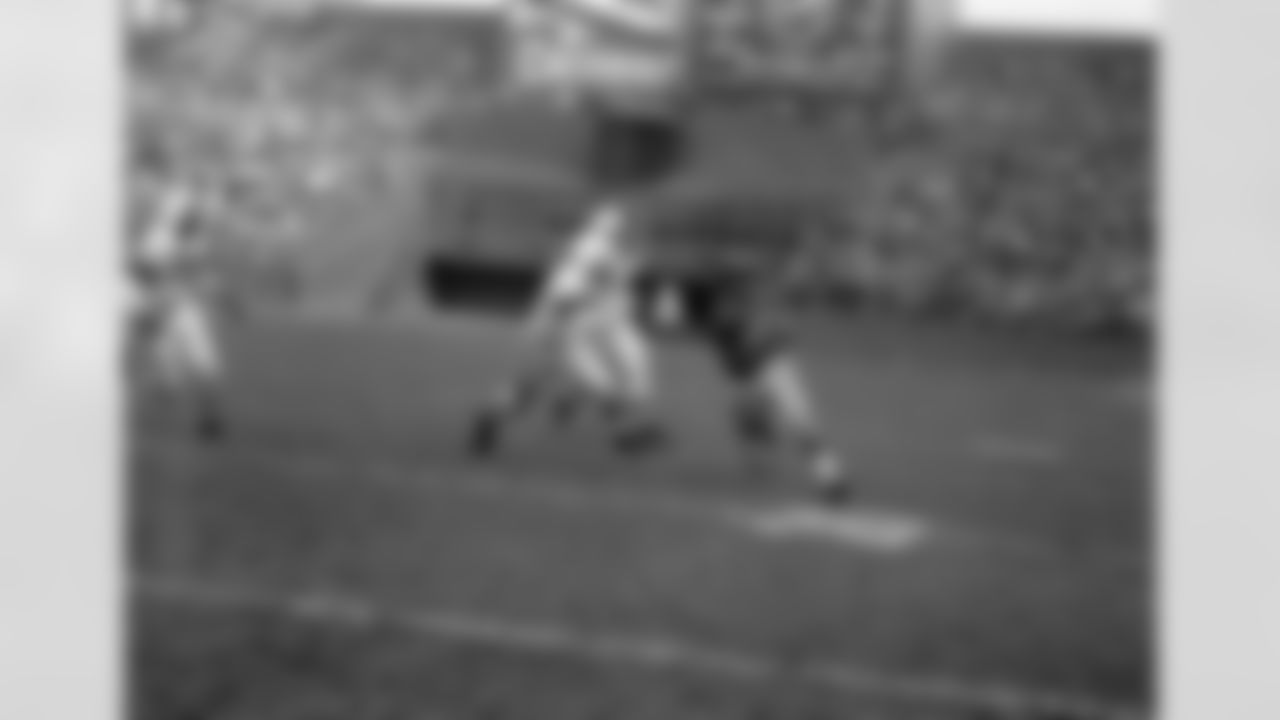
Giant halfback Emlen Tunnell (45) eyes two prospective tacklers while making short gain in the second quarter of a game with the Cleveland Browns at the Polo Grounds in New York on Oct. 22, 1950. Ken Gorgal (left), a back, and Jim Martin, an end, move in for the tackle during the Giants 17 to 13 upset over the Browns. (AP Photo)

Steve Owen, center, watches a New York Giants professional football team workout with Giants left halfback Charley Conerly, left, and Bill Swiacki at the Polo Grounds in New York on Oct. 27, 1948. Conerly, former Mississippi footballer, set up and scored what proved to be the winning touchdown against the Pittsburgh Steelers, when he elected to to run on a pass play when he could not locate a receiver. (AP Photo/John Lindsay)

Charley Conerly gets a lift from teammates, Kyle Rote, left, and Andy Robustelli in New York on Feb. 21, 1948 after announcing his retirement as quarterback for the New York football Giants. Conerly, who called signals on the field for the Giants for 14 seasons, will now scout for the team. The former Mississippi University star holds the National Football League record for having completed 36 passes, the most ever in one game, against Pittsburgh in December, 1948. (AP Photo)
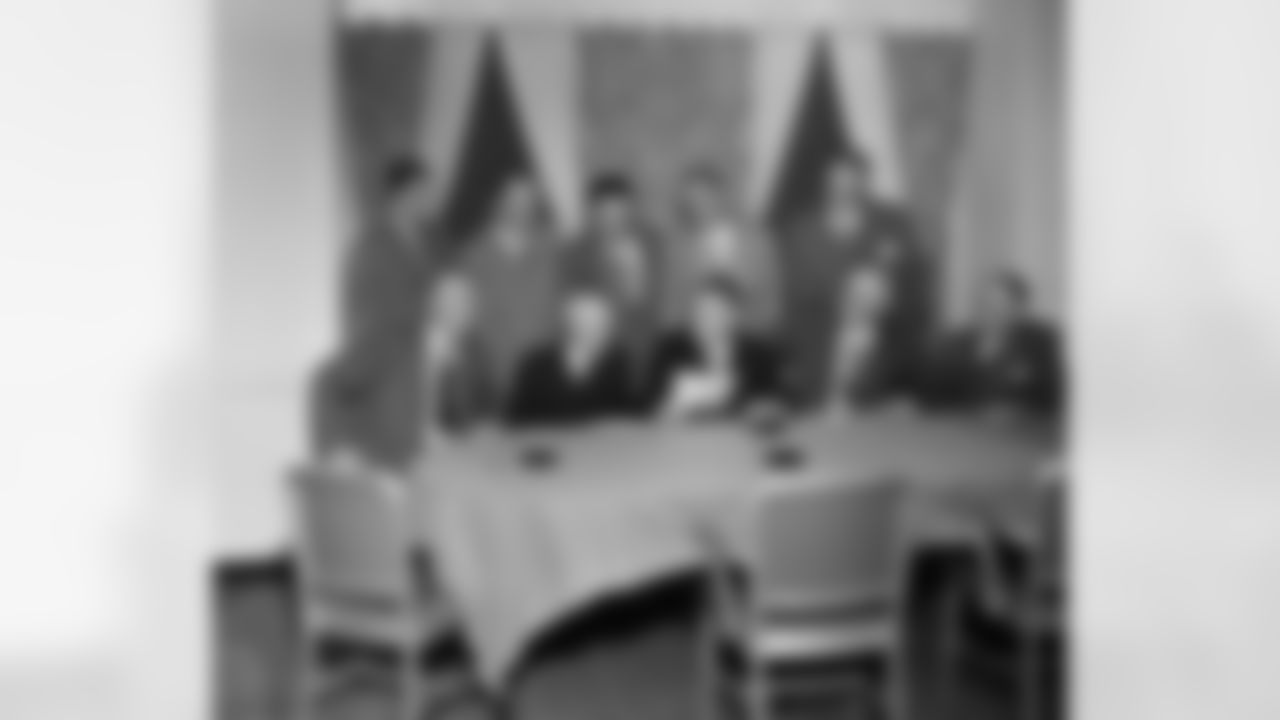
Members of the NFL rule committee gather, Jan. 14, 1948 at the Hotel Commodore in New York for a series of winter meetings. From left to right, seated: Earle "Greasy" Neale, Philadelphia Eagles coach; Hugh Ray, technical advisor on rules; Bert Bell, league commissioner; Steve Owen, New York Giants coach; and Emil Fisher, Green Bay Packers representative. Standing: Mike Micka, Boston Yanks; Joe Bach, Detroit Lions; Philip Handler, Chicago Cardinals; Curly Lambeau, Green Bay coach; and Mike Johnson, Chicago Bears. (AP Photo/Marty Lederhandler)

Ray Poole New York Giant end, takes a pass from Jimmy Blumenstock for a 15 yard gain in the third period of New York vs. Boston Yank game in New York City, Oct. 20, 1947. Giants lost 14 to 0. Yank defenders are Mike Micka, behind Poole, Frank Mannicki and Frank Seno, right. (AP Photo/Harry Harris)
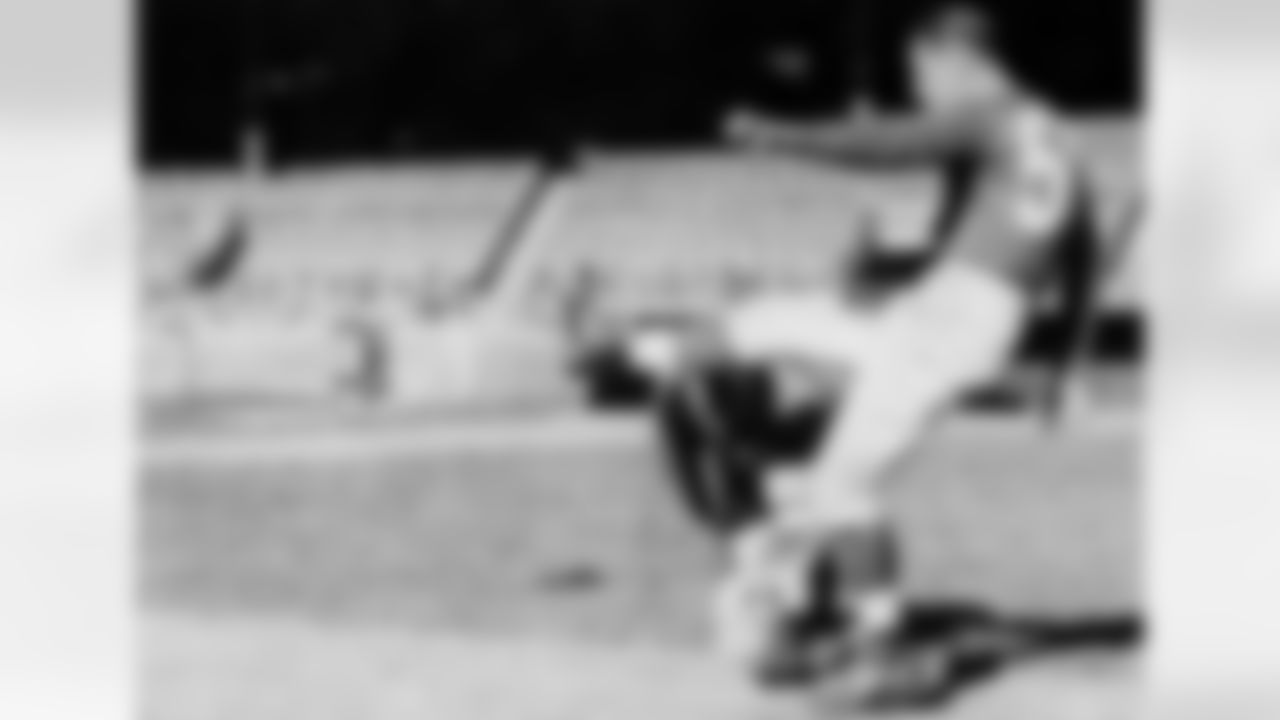
Place kicking specialist of the New York Giants, Ken Strong kicks ball at New York's Polo Grounds. Teammate Hank Soar, who is holding the ball, January 3, 1947. (AP Photo)

The 1947 New York Giants pose Oct. 14, 1947 - 1st team, left to right: (82) Ray Poole; (77) Jim White; (60) Len Younce; (51) Chester Gladchuck; (67) Bob Dublestein; 79 DeWitt Coulter; (21) Joe Sulaitis; Backs, left to right: (37) George Franck; (57) Lou Palazzi ; (33) Gordon Paschka; (44) Francis Regan and coach Steve Owen. (AP Photo).

Members of the New York Giants gather around coach Steve Owen as he explains a play during a practice session at the Polo Grounds in New York on Oct. 14, 1947. (AP Photo/Anthony Camerano)
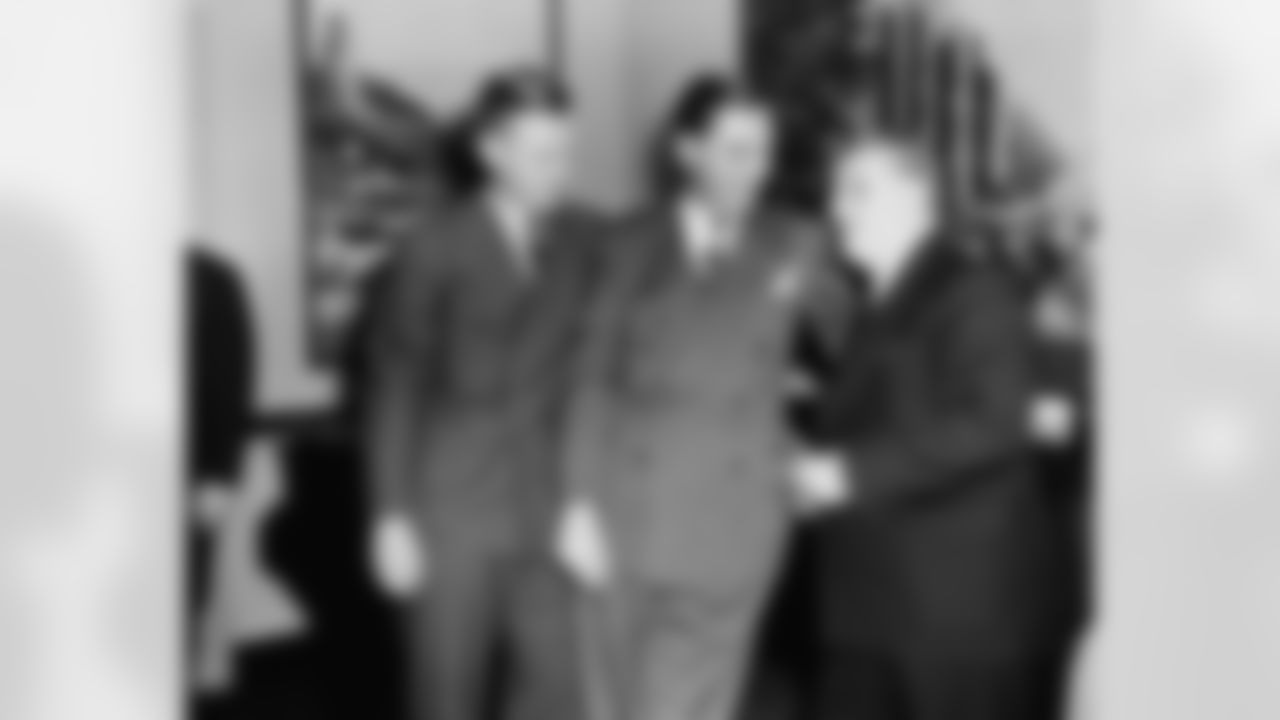
Bert Bell, right, NFL commissioner, talks to Wellington Mara, left, secretary of the New York Giants, and his brother, Jack V. Mara, center, president of the Giants, during a recess of the executive session of the NFL in New York City, Dec. 16, 1946. (AP Photo/Joe Caneva)

National Professional Football League club officials gather around commissioner Bert Bell, to whom they gave a new contract, at an executive session in New York City, Dec. 16, 1946. Seated from left are, Fred Mandel, Detroit Lions; Lee Joannes, Green Bay Packers; Bell; Harry Thayer, Philadelphia Eagles; Charles Bidwell, Chicago Cardinals. Standing from left are, George Halas, Chicago Bears; Arthur Sampson, Boston Yankees; George Marshall, Washington Redskins; Jack V. Mara, New York Giants; Art Rooney, Pittsburgh Steelers; and Charles Walsh, Los Angeles Rams. (AP Photo)
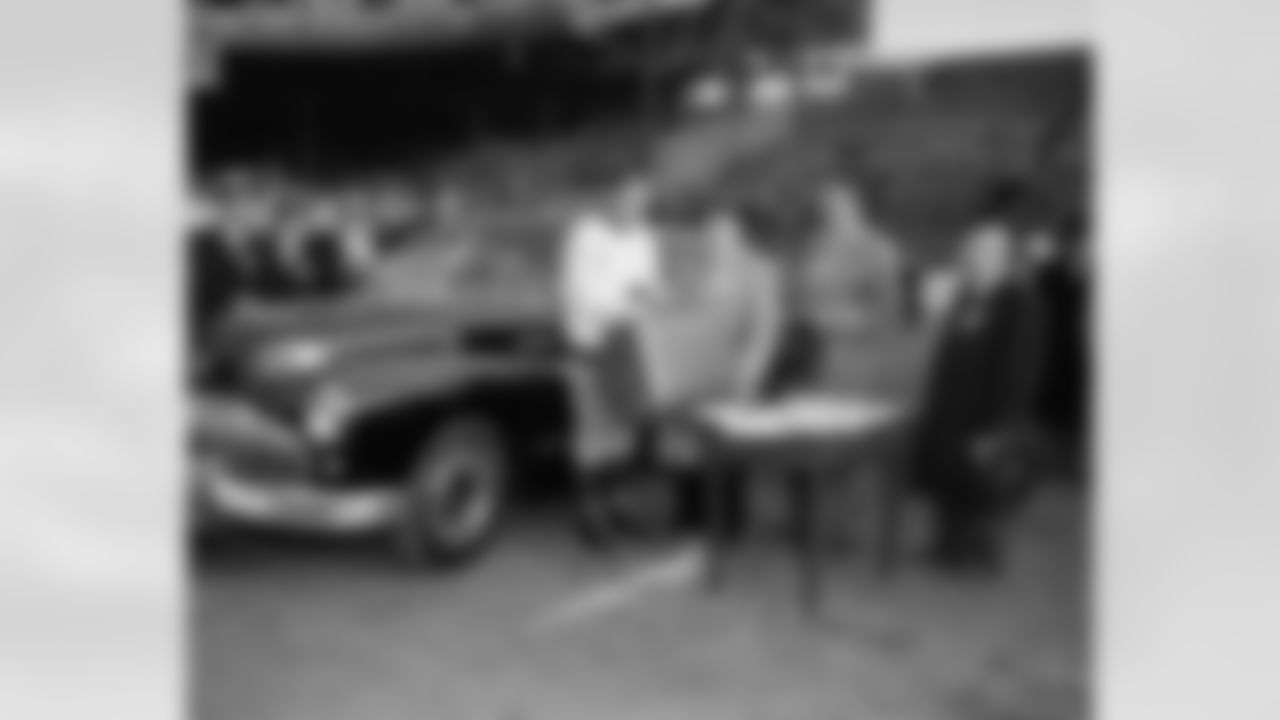
Ken Strong, left, New York Giants football team back, receives two suitcases from Bert Bell, National Football League Commissioner, during ceremonices celebrating "Ken Strong Day" at the Polo Grounds in New York, November 24, 1946. In addition to the suitcases, Strong received from fans behind him several thousand dollar bonds and other assorted gifts.Standing left to right, are; Ken Strong, Bert Bell, Herman J. Bergasse, chairman of the Ken Strong Fans Committee; and Irving Cohen, vice chairman. The Giants defeated the Pittssurch Steelers, 7-0. (AP Photo)
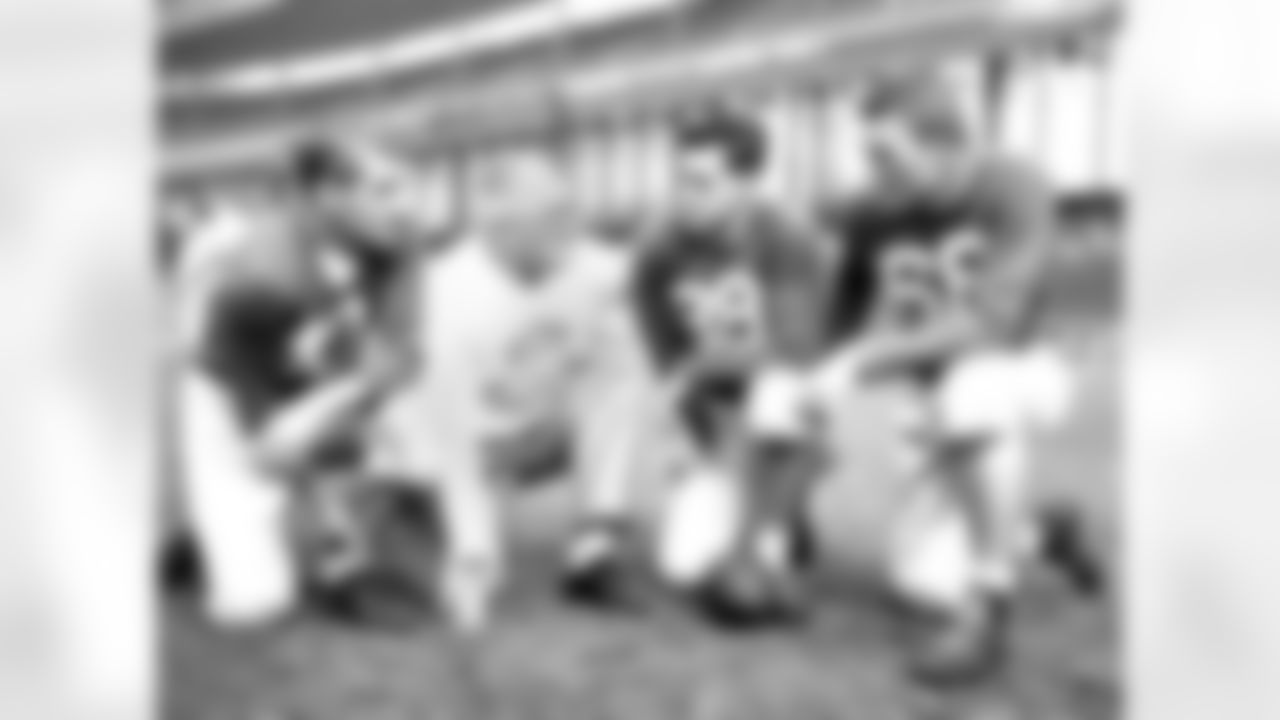
New York Giants coach Steve Owen charts strategy with quarterback Frank Filchock, left, guard Bill Edwards, right, and end Frank Liebel during a practice session at the Polo Grounds in New York on Oct. 30, 1946. (AP Photo/Anthony Camerano)

New York Giants back Steve Filipowicz is pinned to his own goal post by Philadelphia Eagles back Gil Steinke after he intercepted a pass intended for Steinke in the third quarter of the Philadelphia Eagles vs. New York Giants football game at the Polo Grounds in New York City Nov. 10, 1946. (AP Photo/Harry Harris)

Frank Filchock, Giants quarterback and passer, and Coach Steve Owen watch fourth quarter action in the Giants-Chicago Bears Championship playoff game in New York on Dec. 15, 1946. The Bears broke the 14-14 tie in the last period to win 24-14. (AP Photo)
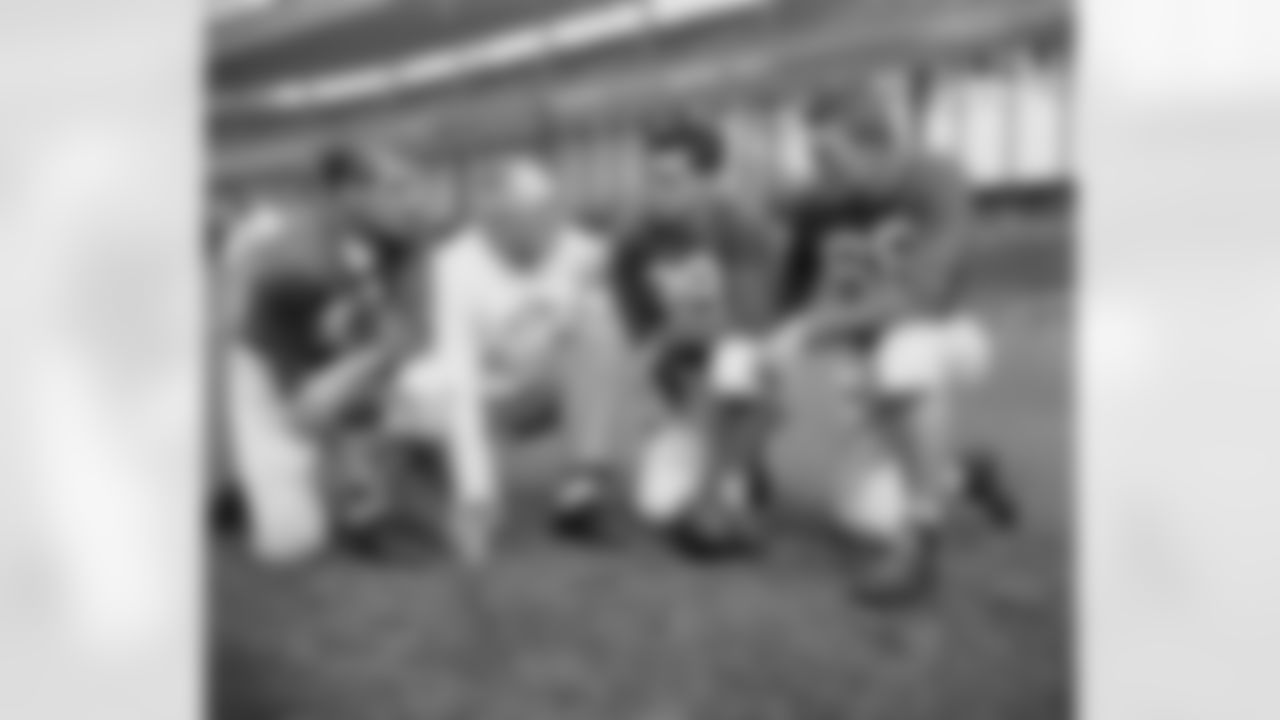
Coach Steve Owen of the New York Giants charts strategy at a Polo Grounds, New York, practice session on Oct. 30, 1946 with quarterback Frank Filchock (left), guard Bill Edwards (right), and end Frank Liebel. (AP Photo/Anthony Camerano)
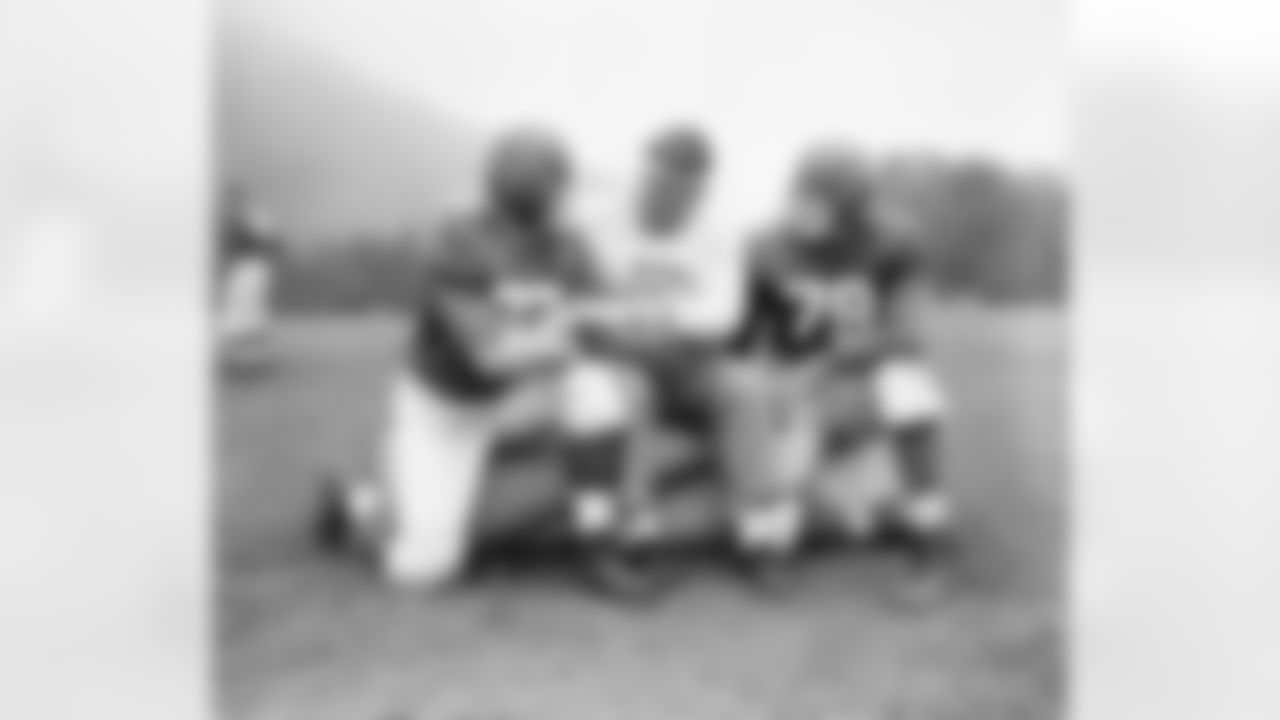
Head coach of the Giants football team Steve Owen, center, confers with Jim White, left, and DeWitt Coulter during practice session at Bear Mountain, New York, September 9, 1946. (AP Photo)

New York Giants' Mel Hein is seen at practice at the Polo Grounds, New York, Oct. 11, 1945. (AP Photo/John Lindsay)
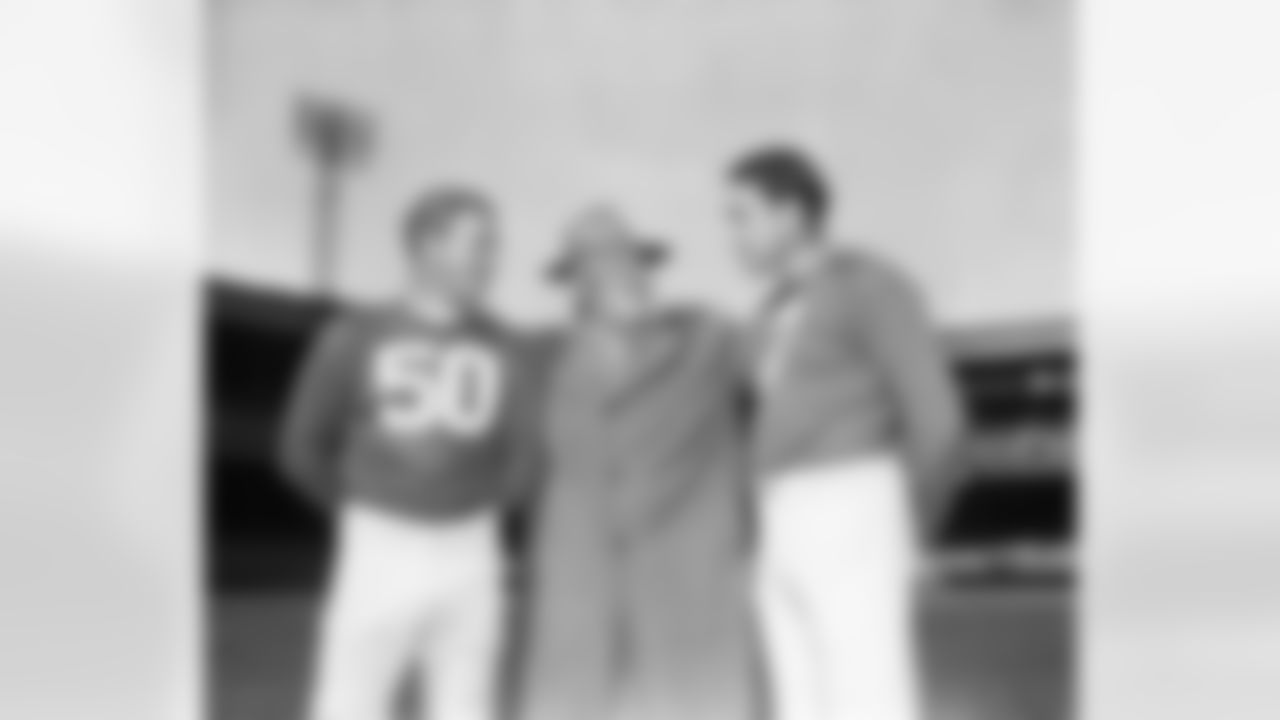
Coach Steve Owen (center), of the New York Giants football team, talks with two of the Giant's veterans, Ken Strong (left) and Mel Hein, during a practice session Oct. 11, 1945 in New York City, for their opening game of the season against the Boston Tigers in Yankee Stadium, Oct 14. (AP Photo/John Lindsay)
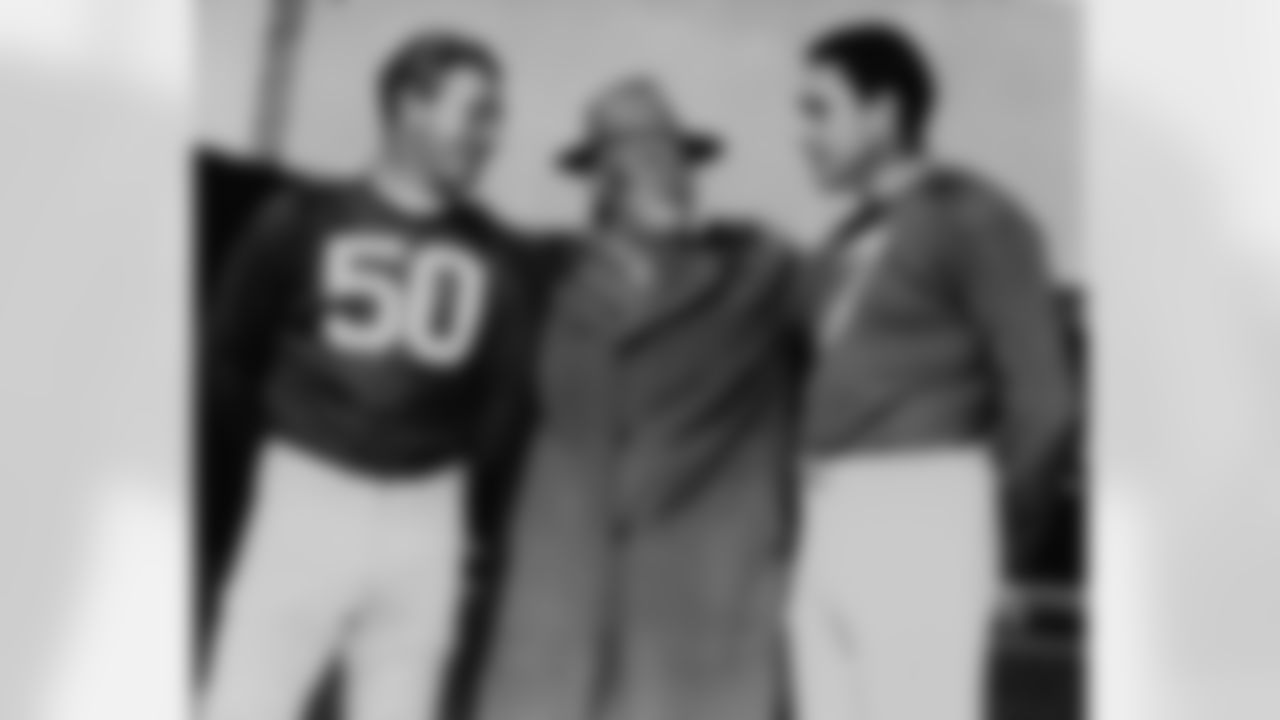
Coach Steve Owen, center, of the New York Giants football team, talks with Ken Strong, left and Mel Hein, right, during a practice session in New York City Oct. 11, 1945 for their opening game of the season Oct. 14 against the Boston Tigers at Yankee Stadium. (AP Photo).
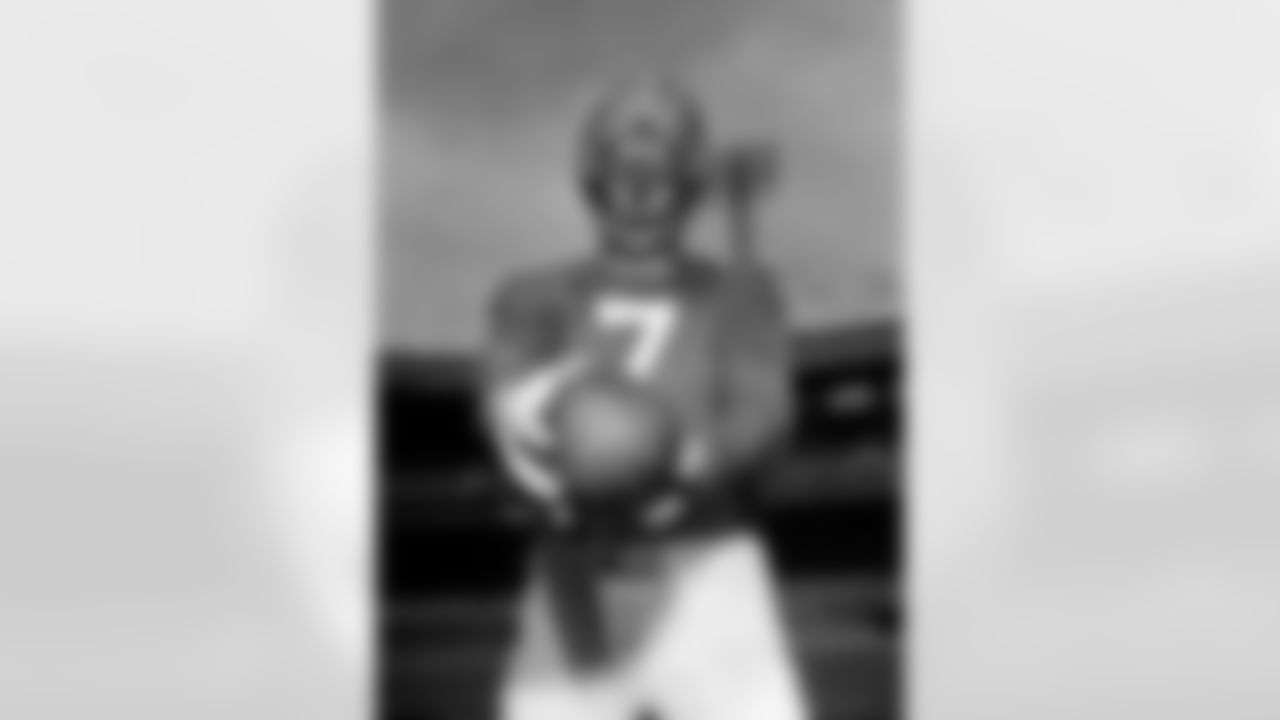
New York Giants' center Mel Hein is seen Oct. 11, 1945, in New York. (AP Photo/John Lindsay)
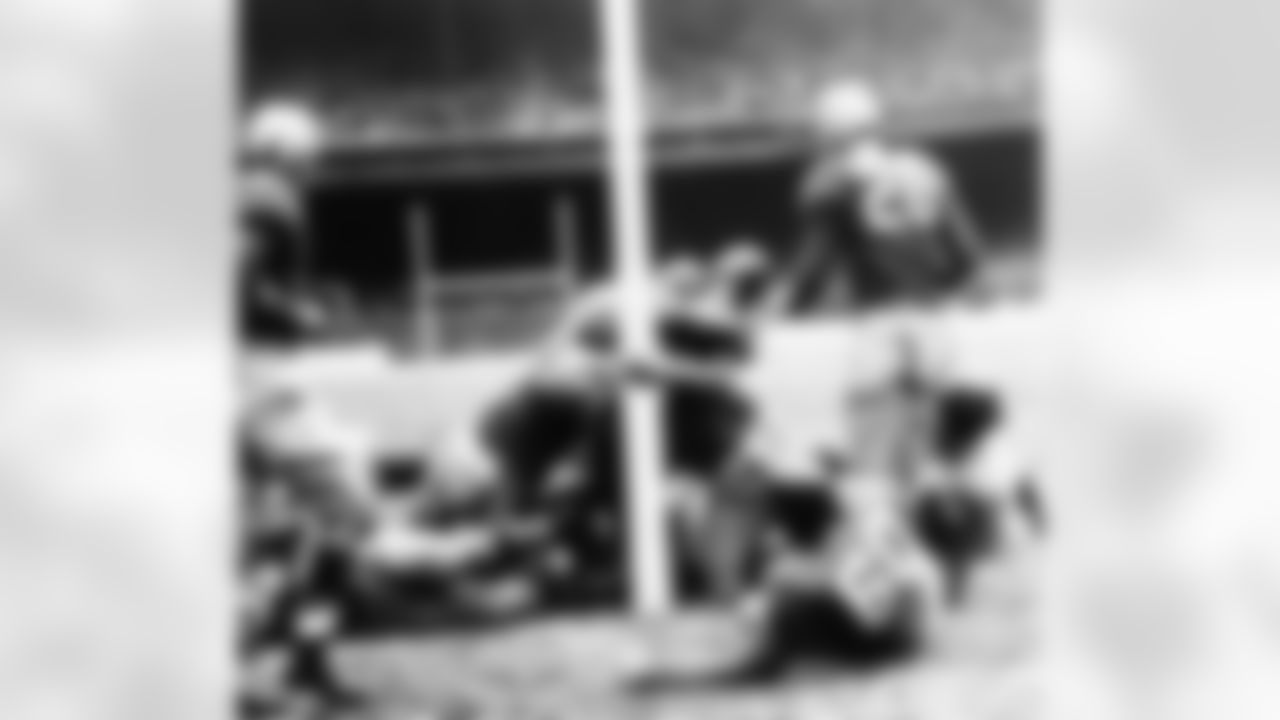
Footballers pile up as Bill Paschal of the Giants carries the ball to Boston?s 8 inch line and with a hand on the local post tries to haul himself the rest of the way. On the next play, his teammate Len Calligaro scored the first touchdown who overwhelmed the visitors on the Polo grounds on Nov. 5, 1944. 31-0. (AP Photo)
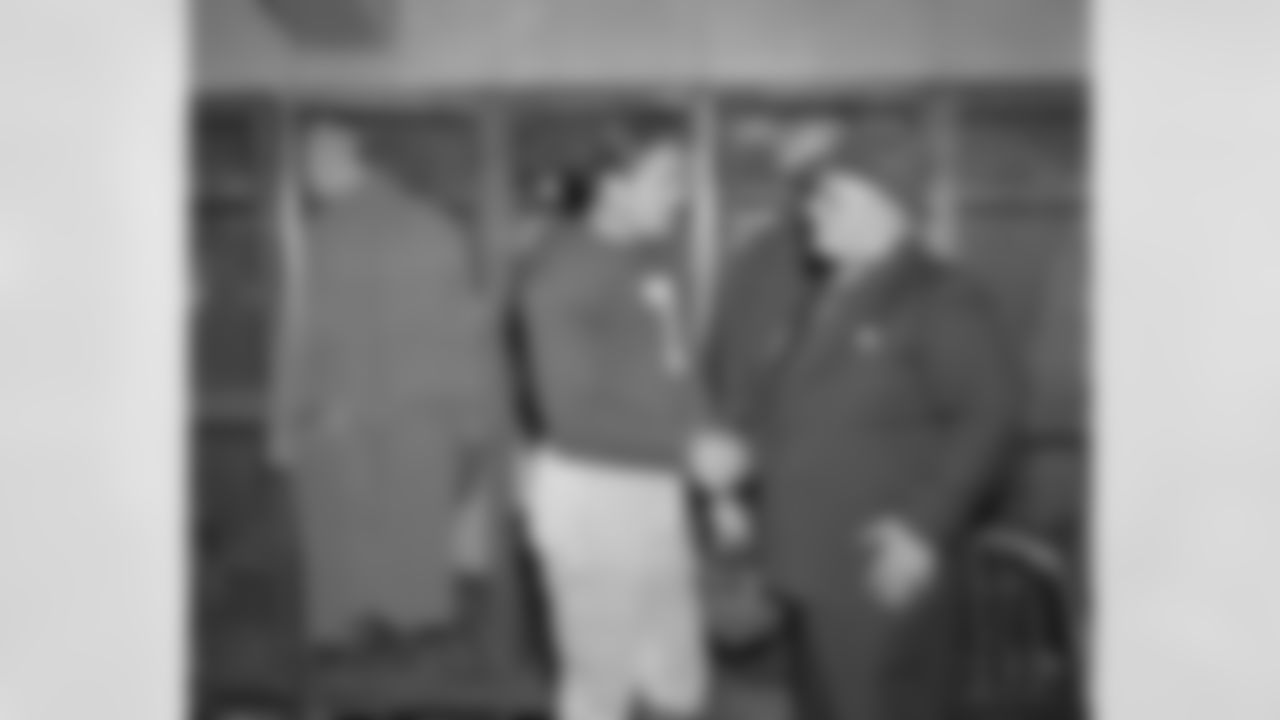
Captain Mel Hein, left, says goodbye to coach Steve Owen Dec. 6, 1942 in New York, after the New York Giants' center helped his teammates defeat the Brooklyn Dodgers 10-0. Hein will go on to coach at Union College. (AP Photo/John Rooney)
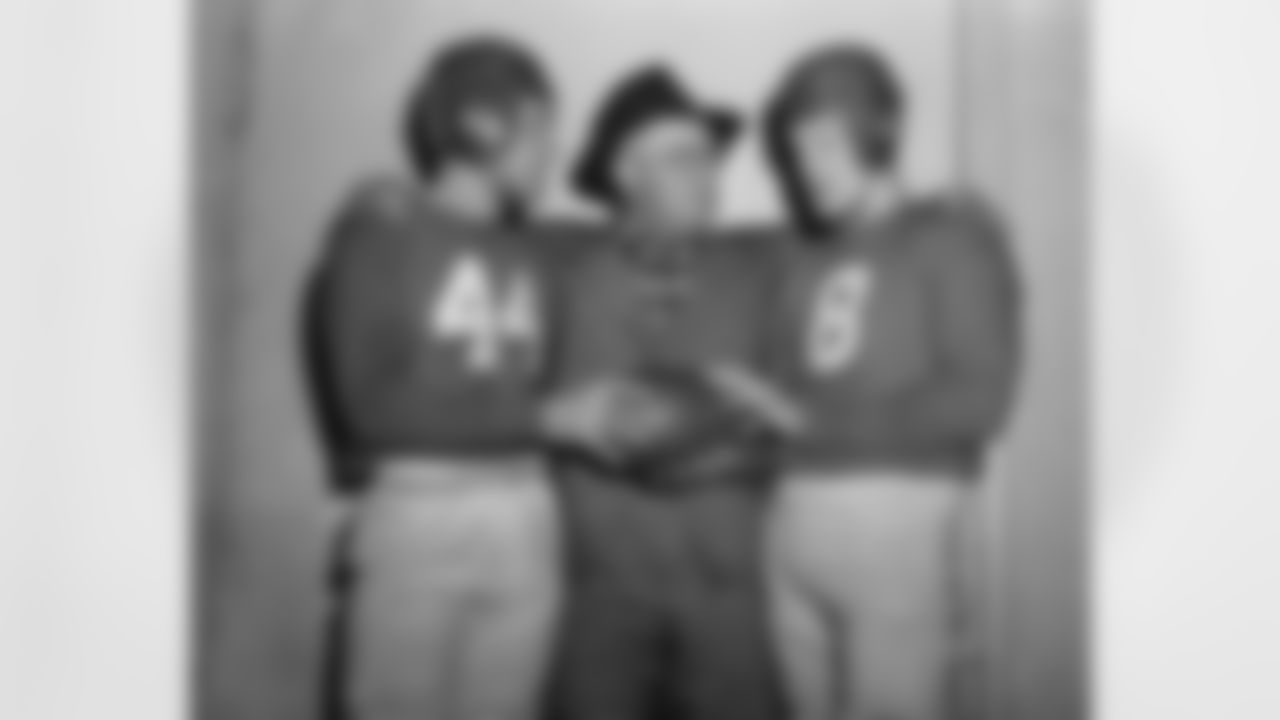
Coach Steve Owen, of the New York Giants, talks with his rookie stars, Emery Nix, left, and Bill Paschal, after a practice session Dec. 16, 1943 at the Polo Grounds in New York City. (AP Photo/Murray Becker)
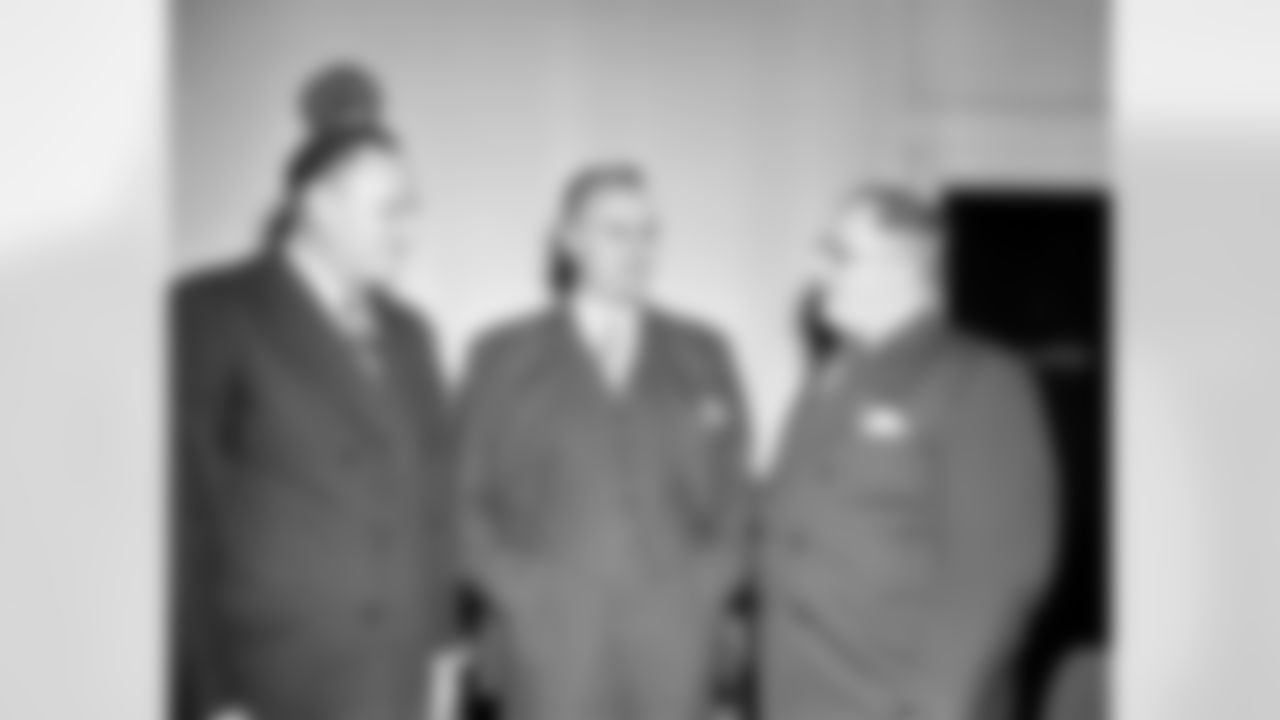
Three National Football League coaches, from left, Walter Kiesling, of Pittsburgh Steelers; Luke Johnson, co-owner of the Chicago Bears; and Steve Owen, of New York Giants; discuss 1943 prospects at the spring professional grid meeting in Chicago, Ill., on April 6, 1943. (AP Photo)
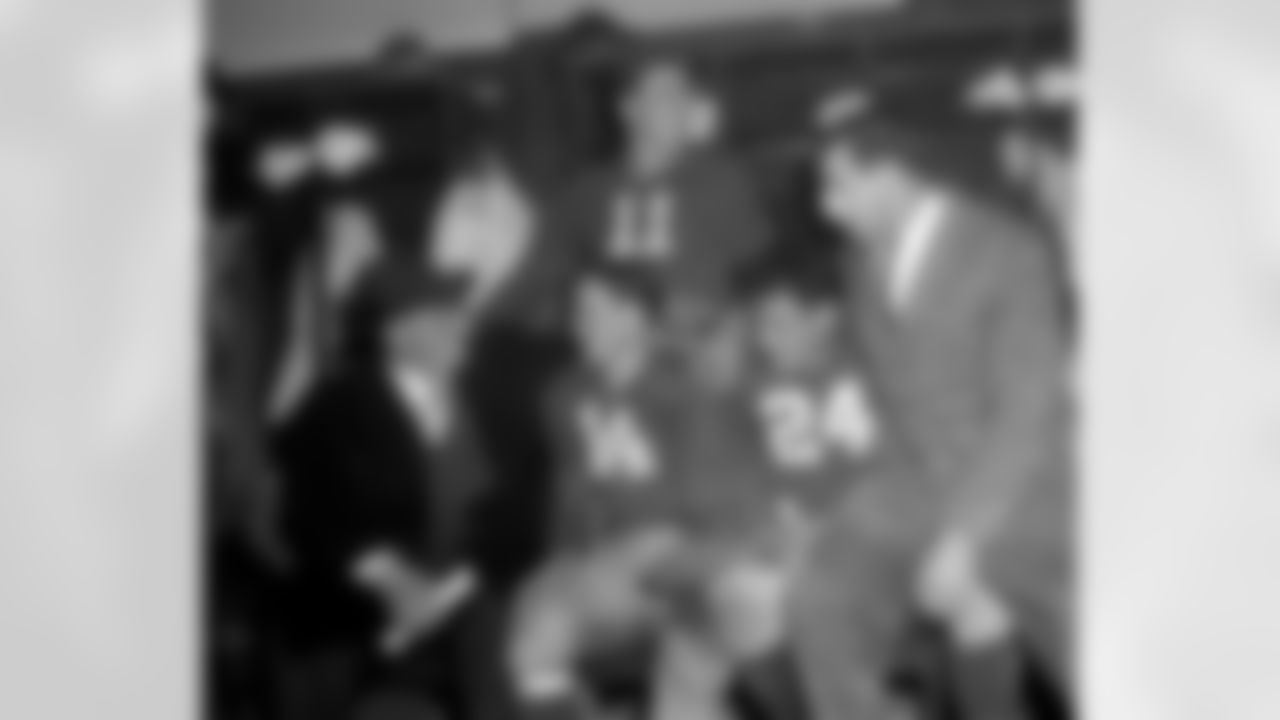
New York Giants coach Steve Owen, left, has a happy word for some of his players in the dressing room after their 31-7 victory over the Washington Redskins in Washington on Dec.12, 1943. The Giants' victory ties them in the Eastern division with the Redskins and a play off next week. From left to right are Owen, Ward Cuff (14), Will Walls (24), Frank Libel and Steve Pritko (11). (AP Photo)

Mel Hein examines the official game guide with "Solid" Steve Owen, coach of the Giants, and Tuffy Leemans, sparkplug and signal-caller of the team, during a practice session in New York Oct. 26, 1941.Hein is known throughout the proranks as an expert on the football rules reciting them from memory and frequently bringing about a decision in favor of his team on disputed interpretations Umpires get out the book when Mel protests their rulings. (AP Photo).
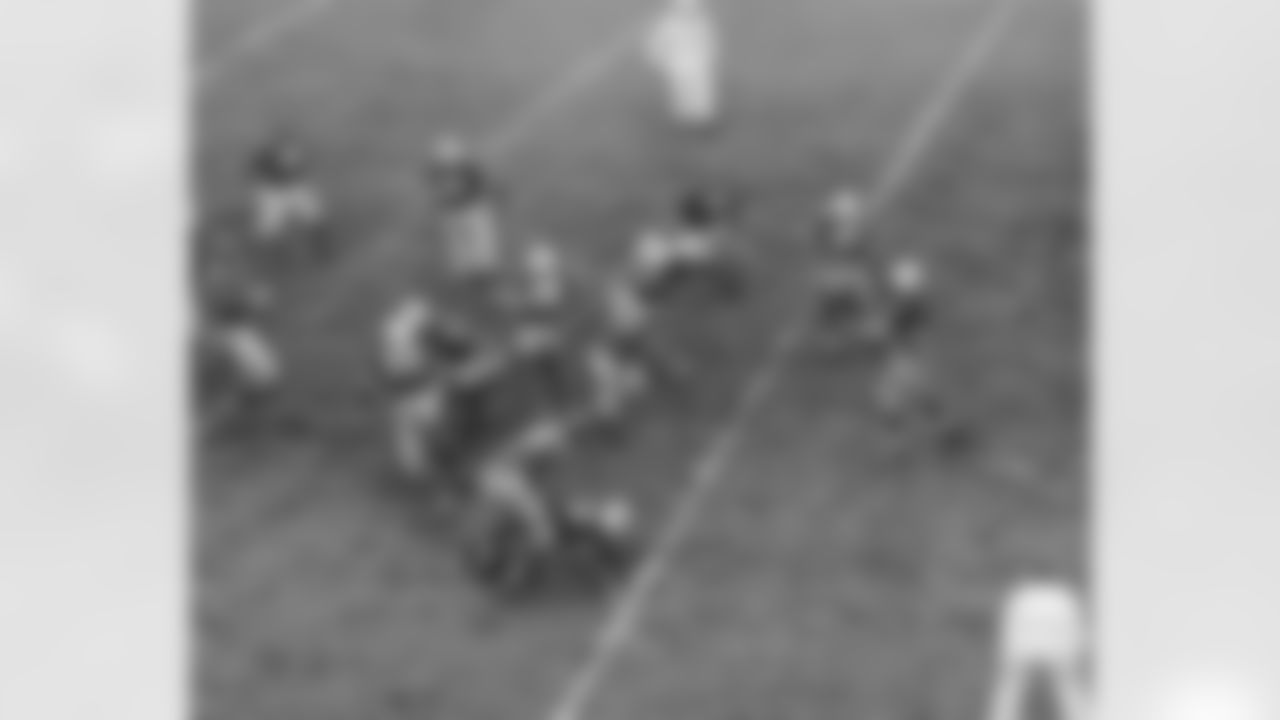
Ace Parker (7) of the Brooklyn Dodgers football team, getting away a pass in the 1st quarter of game with New York Giants at the Polo Grounds in New York City, Dec. 1, 1940. Parker is shown just before he was hit by Mellus 33. In the foreground a Dodger player is blocking Howell while Sivell 28 (partly hidden by Mellus) is taking care of Widseth 50. Other players whose numbers can be seen are Manders 9 (behind ball). Svendsen 18, Kinard 25 and McFadden 26 of the Dodgers, in addition to Poole 23 and Falaschi 28 of the Giants. Dodgers won 14 to 6. (AP Photo)
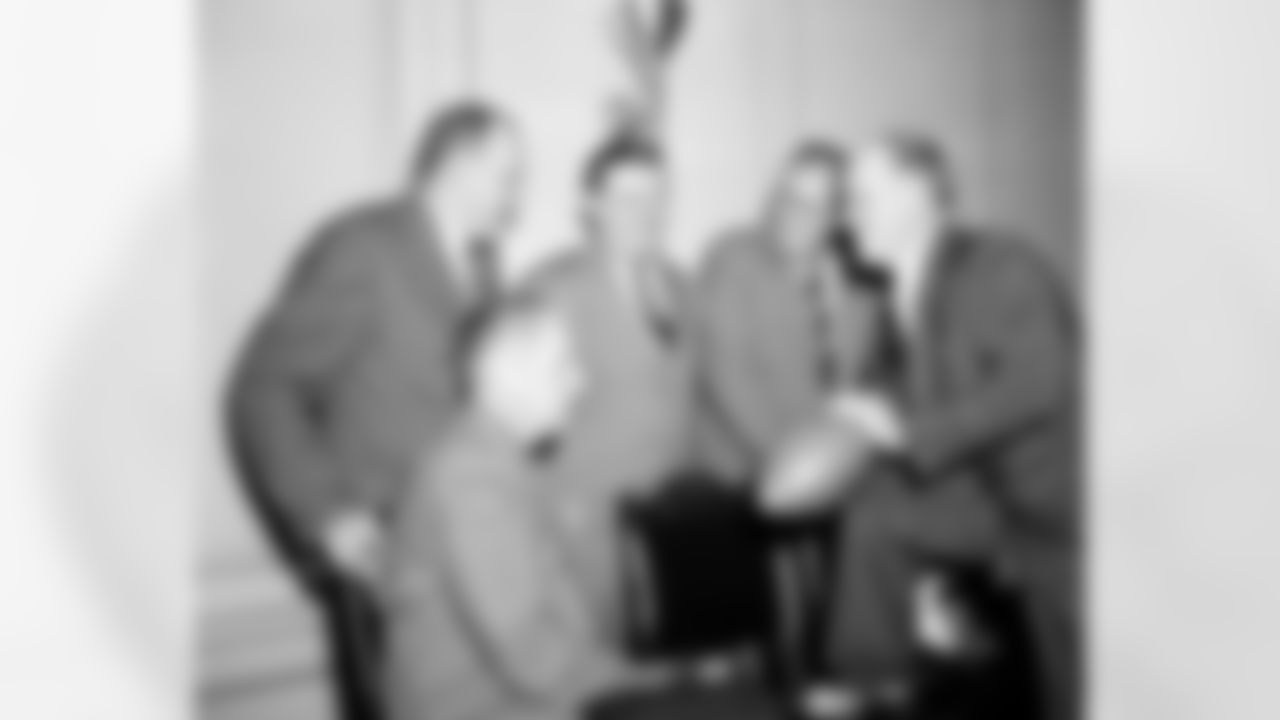
Among the executives attending the annual National Professional Football League meeting are, from left, Charles Bidwell, owner of the Chicago Cardinals; George Halas, owner-coach of the Chicago Bears; Bert Bell, owner-coach of the Philadelphia Eagles; Steve Owen, coach of the New York Giants; and Hartley Anderson, line coach of the Detroit Lions. The meeting is held in Pittsburgh, Pa., on July 22, 1941. (AP Photo)

New York Giants' Mel Heins in seen in New York, Sept. 25, 1941. (AP Photo)
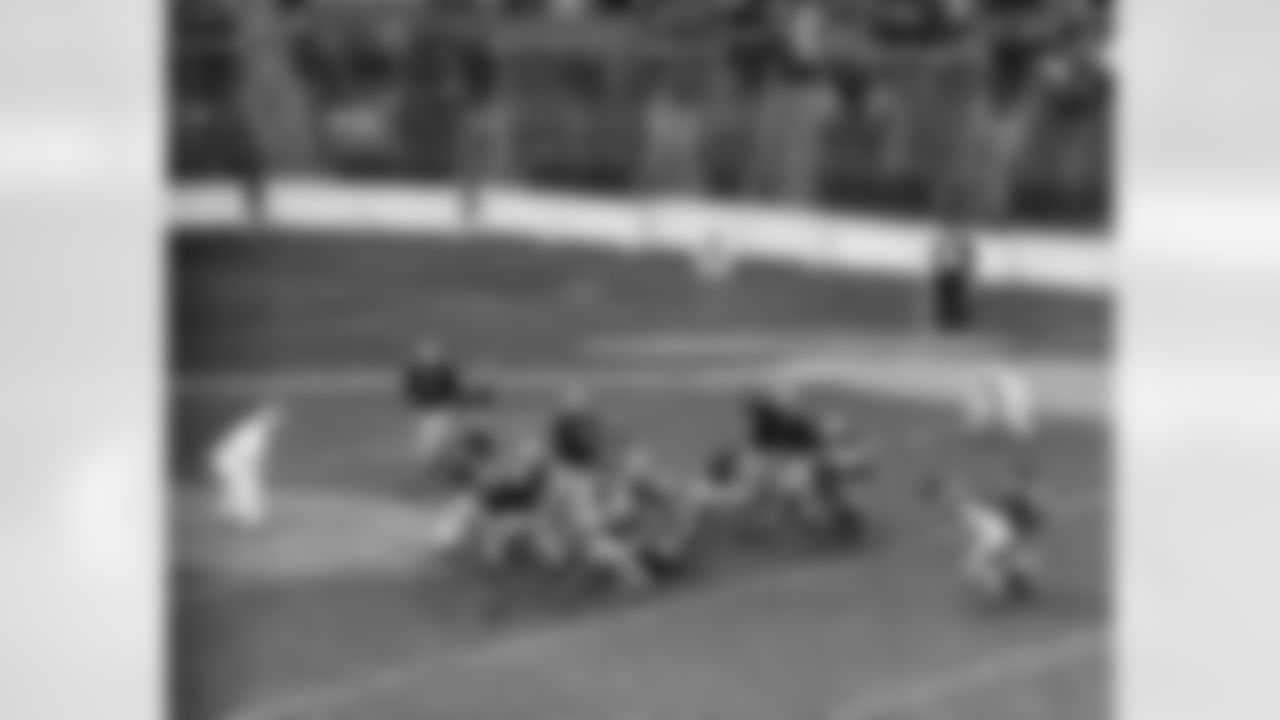
Ward Cuff (14) of the New York Giants kicking a 23-yard field goal in the 2nd quarter of game with the Pittsburgh Steelers at the Polo Grounds in New York City, Oct. 20, 1940. Giant Players are Tuffy Leemans (4) holding ball; Doug Older Shaw (39); Leland Shaffer (20) and John McLaughry (17). Steelers are: Everett Fisher (8); John Woudenberg (36), Frank Sullivan (18), and John Noppenberg (50). Giants beat Steelers 12 to 0. (AP Photo)
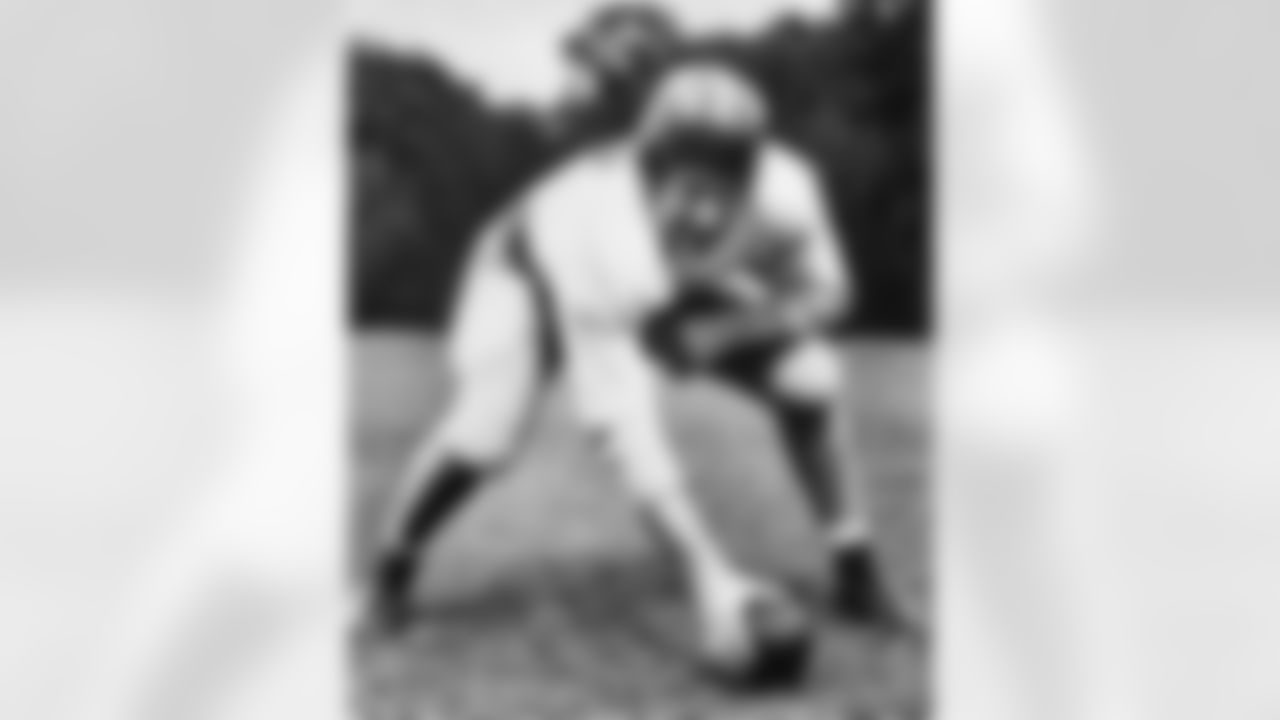
Football player Mel Hein of the New York Giants, November 20, 1940. (AP Photo)
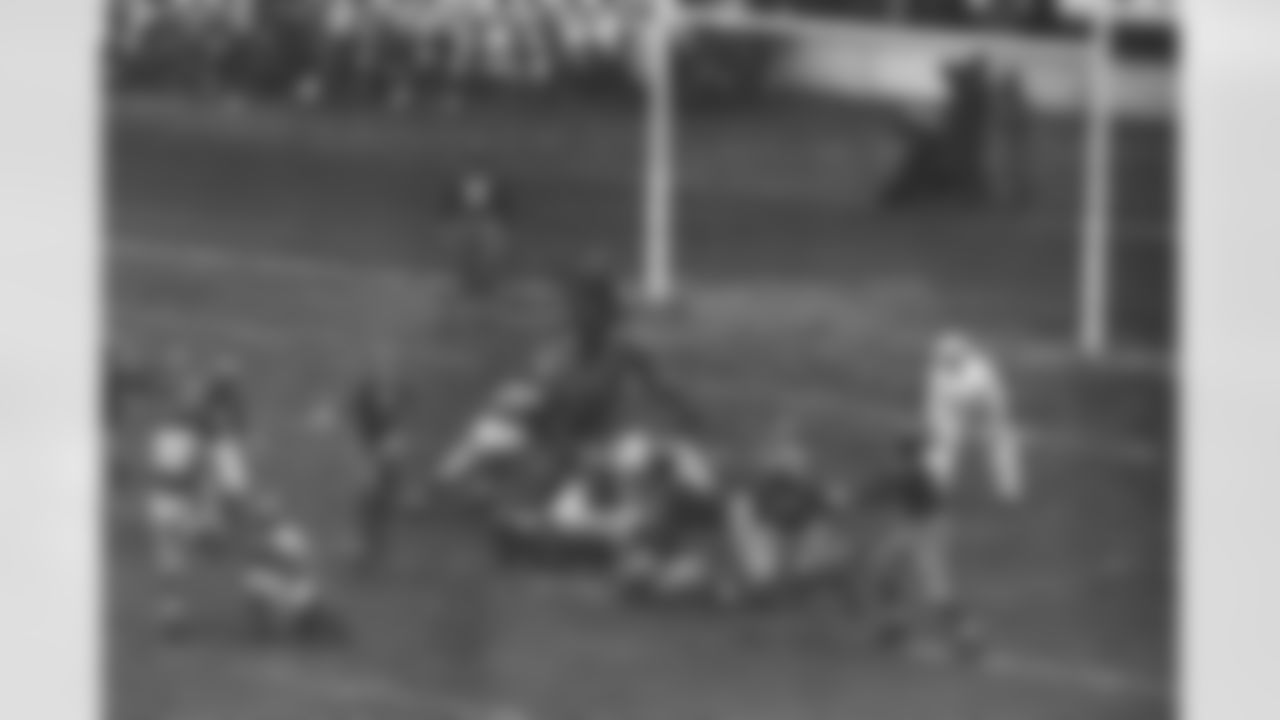
Ken Strong (30), kicking the 2nd of 3 field goals which scored for the New York Giants in their game against the Washington Redskins at the Polo Grounds in New York City, Dec. 3, 1939. The Giants Won 9-7. The ball is in the air just above Frank Filchock (30) of Redskins. The victory gave the Giants the Eastern Division Championship of the National Football League for the 2nd consecutive year. Redskins shown are Jim Barber (15) and Steve Slivinski (16). Giants are Tuffy Leemans (4), John "Bull" Karcis (11); Ed Widseth (50) and Nello "Flash" Falaschi (28). (AP Photo)

Quarterback Cecil Isbell of the Green Bay Packers is stopped by New York Giants' Frank Cope after a two- yard gain in NFL title game at the State Fair Grounds in Milwaukee, Wisc., Dec. 11, 1939. The Packers won, 27-0, before a crowd of 32, 000 for the National Football League championship. (AP Photo)

Steve Owen, left, coach of the New York Giants Football team, along with Tim Mara, owner of the Giants, after saying goodbye to the players Dec. 11, 1939, location unknown. (AP Photo)
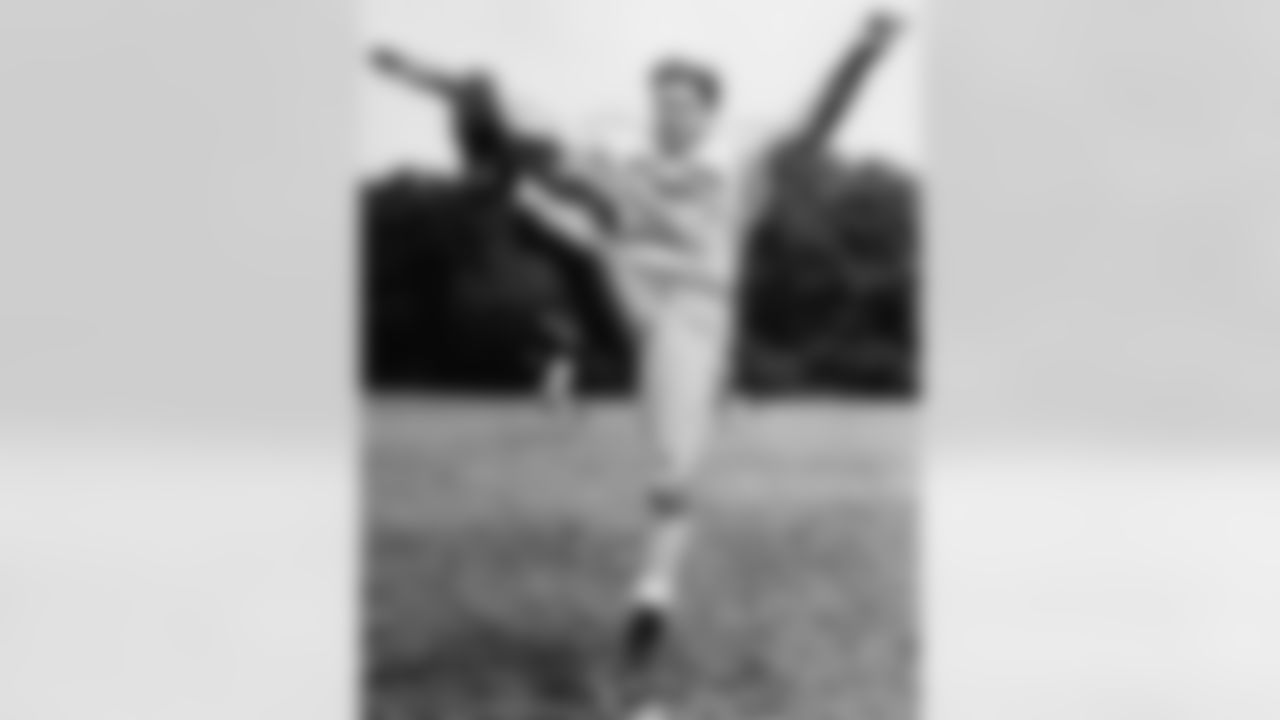
New York Giants' Ken Strong during a practice kick, Sept.13, 1939 . (AP Photo)

Washington Redskins running back Cliff Battles (20) against the New York Giants on Dec. 5, 1937 at the Polo Grounds. (AP Photo)

The New York Giants play the Washington Redskins in a football game at the Polo Grounds in New York City, Dec. 4, 1938. A crowd of 57,461 saw the Giants defeat the Redskins, 36-0, to gain the Eastern Division title. (AP Photo)
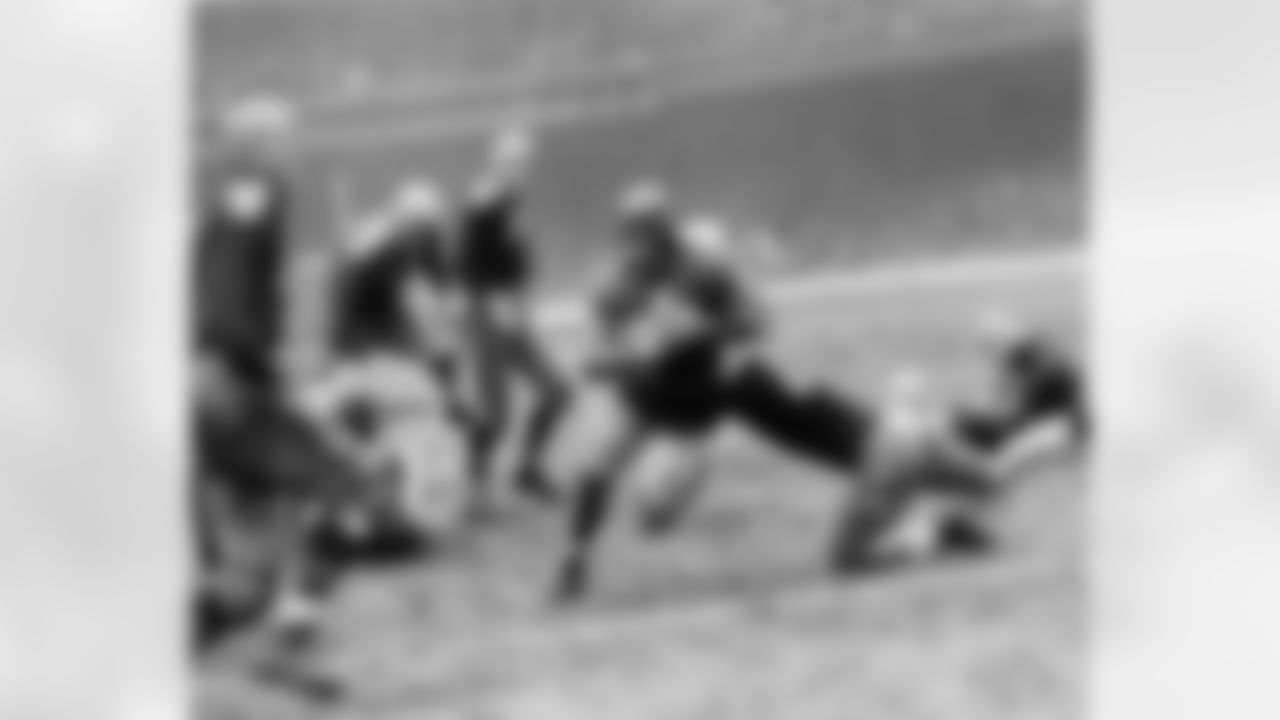
New York Giants Hall of Fame fullback Alphonse "Tuffy" Leemans (4) scores the first touchdown, on a 6 yard carry, in a 17 to 23 victory over the Green Bay Packers in the 1938 NFL Championship played on Dec.11, 1938 at the Polo Grounds in New York.(Pro Football Hall of Fame via AP Images)
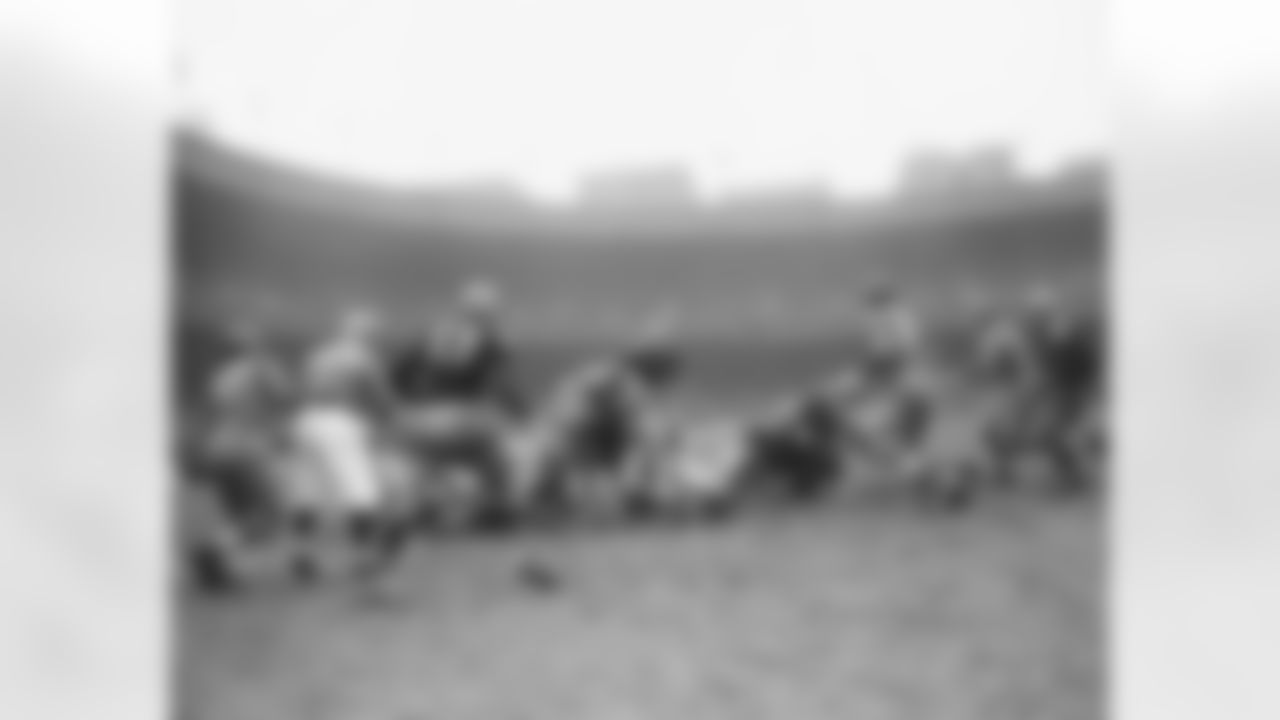
Only two feet short of a touchdown, Green Bay Packers Clarke Hinkle is shown as he was halted by the New York Giants in the second period of their championship game with the Packers, Dec. 11, 1938 in New York. The Giants won, 23 to 17. Other Packers players shown include Bud Svendsen (53); Cecil Isbell (17); and Bill Lee (40). (AP Photo)
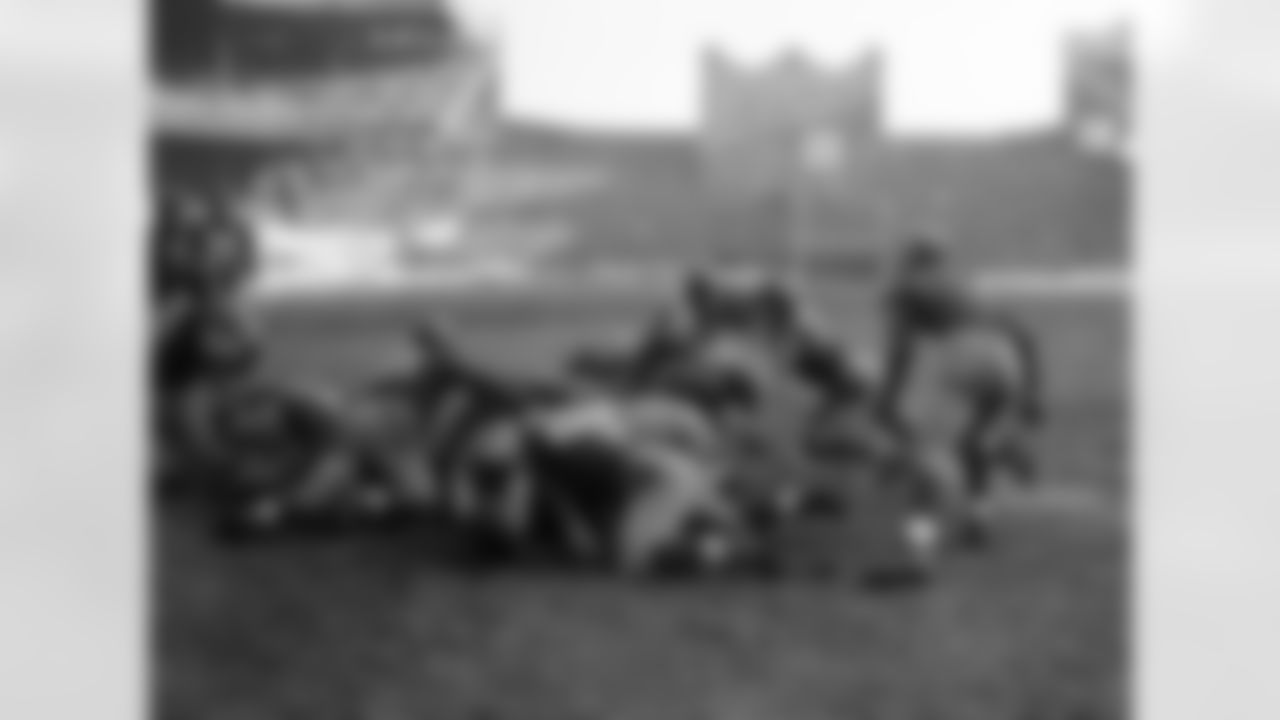
New York Giants fullback John Karcis plunges to score from the one foot line against the Washington Redskins at the Polo Grounds in New York City, Dec. 4, 1938. A crowd of 57,461 saw the Giants win, 36-0, to take the Eastern Division title. (AP Photo)

New York Giants' captain Mel Hein gets a watch from Joseph Carr, president of the National Pro Football League, Dec. 11, 1938, as a token of Hein's being chosen as Most Valuable Player at the Polo Grounds in New York. (AP Photo)

Cecil Isbell (17), Green Bay halfback, hits the line for a ten-yard gain in the first quarter at the Polo Grounds as the New York Giants defeated the Green Bay Packers in their National Professional Football game in New York, Nov. 20, 1938. (AP Photo)
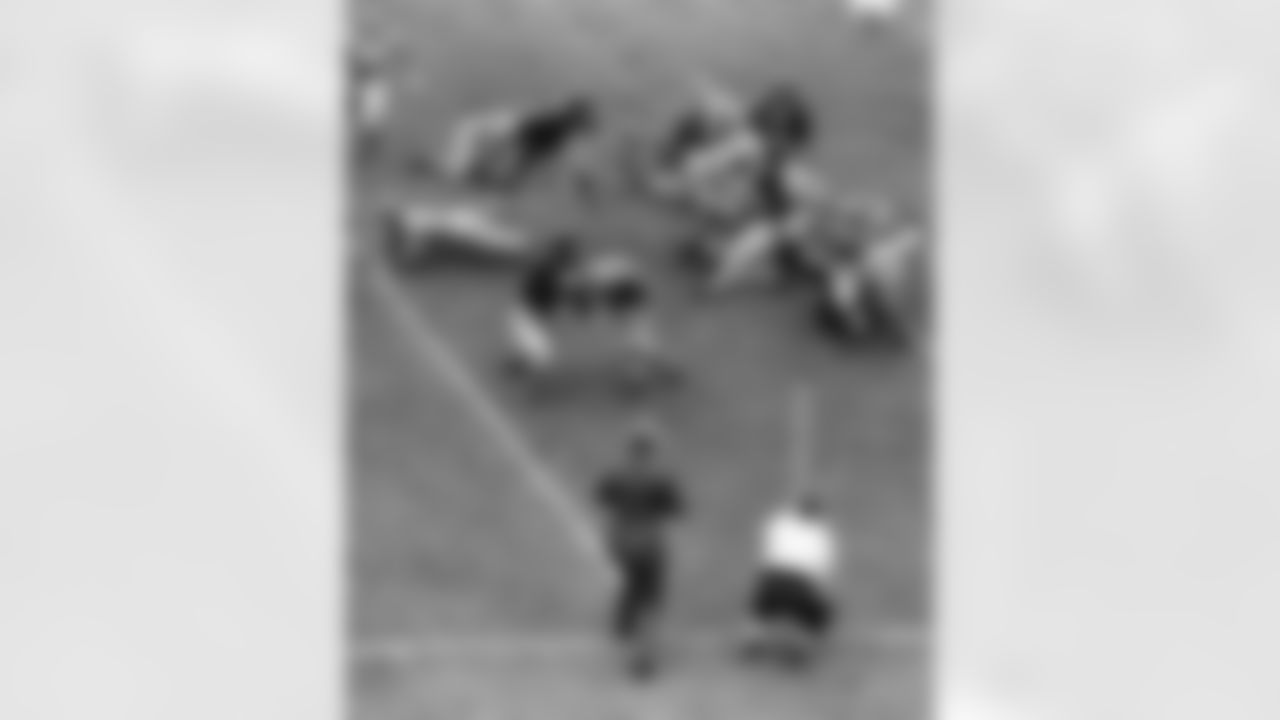
Kink Richards (13), New York Giants back, cuts over end for a 25-yard gain against the Cleveland Rams in the 2nd quarter of a National Football League game on Nov. 13, 1938 at the Polo Grounds in New York. Ward Cuff (14) is taking out an opposing backer-up. Others identified are Giants Tuffy Leemans (4); Gildea (17) and Cope (36); Rams are Ted Livingston (31), and Benton (26). Giants won 28-0. (AP Photo)
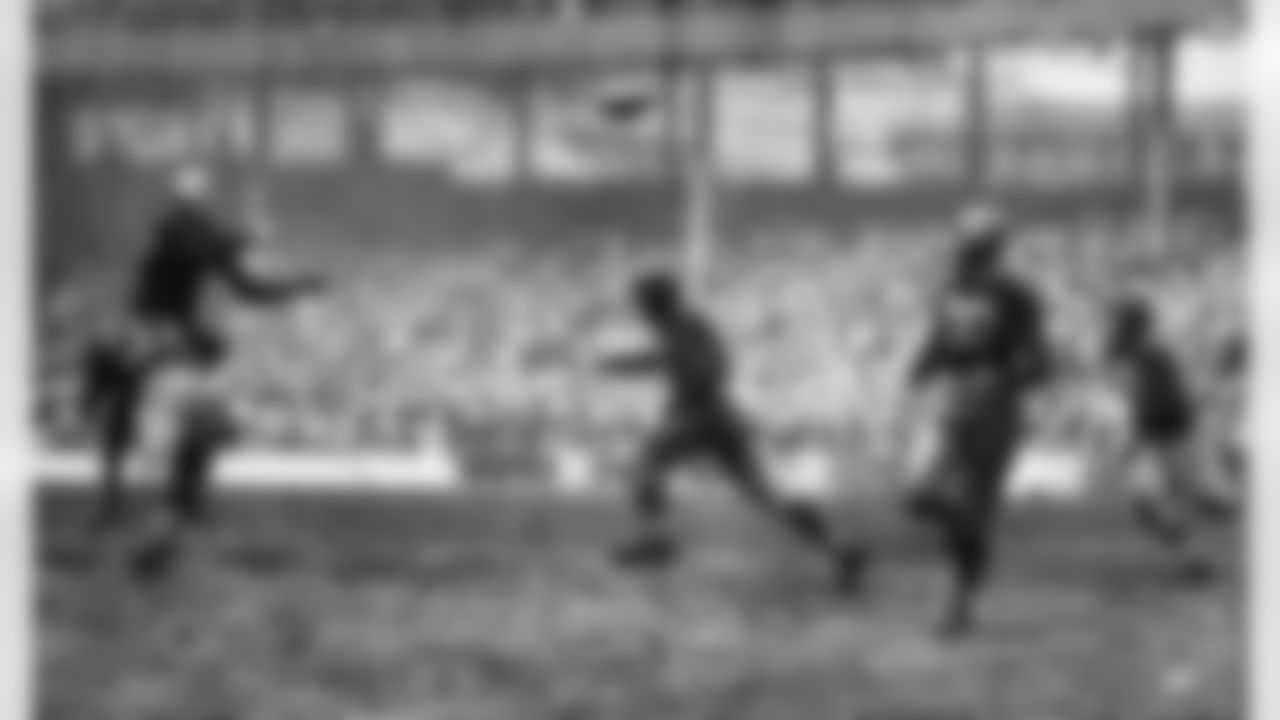
Sam Baugh, passing star of the Washington Redskins, against the New York Giants on Dec. 6, 1937 in New York. Baugh, being tackled by Ray Hanken (37) of the Giants a moment after getting the ball away. (AP Photo)
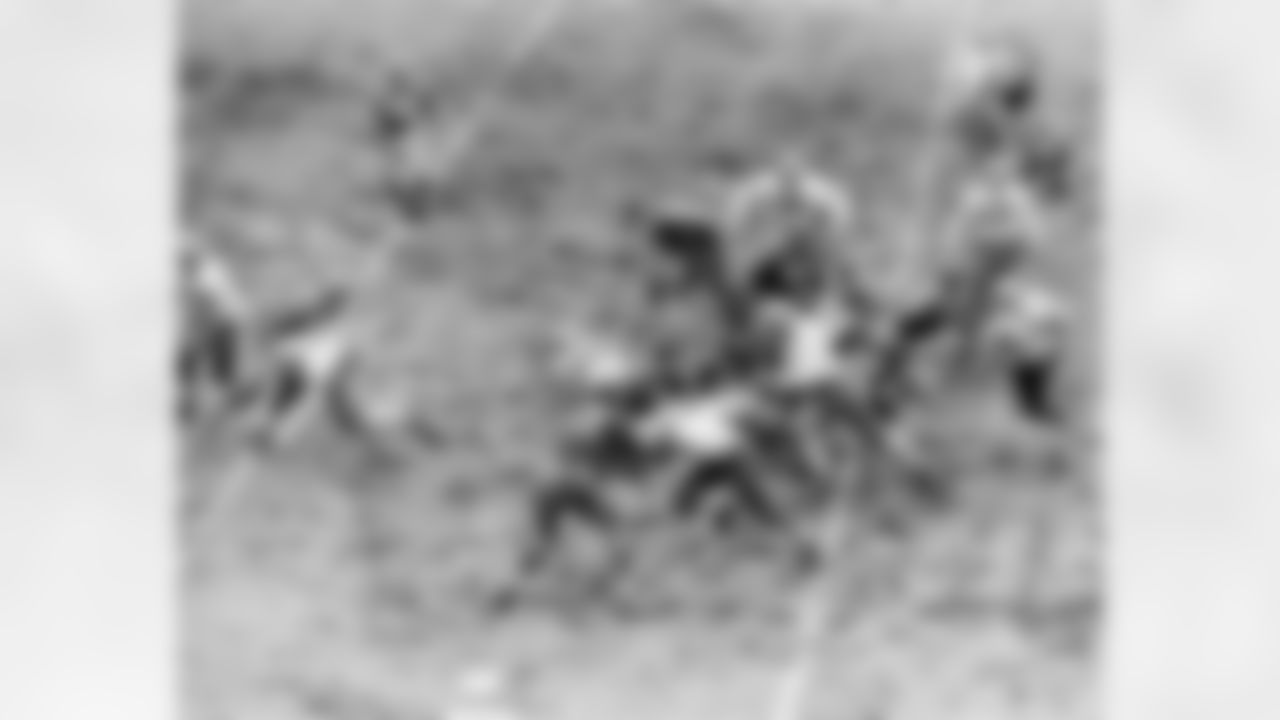
The New York Giants defeated the Green Bay Packers, 15-3, in a muddy NFL game at the Polo Grounds in New York, Nov. 20, 1938. Ed Jankowski (7), of the Packers, gains 4 yards on a reverse play in the 1st quarter after his teammate Cecil Isbell (17) gave him the handoff. Ken Lunday (5), Giants guard, is attempting to tackle Jankowski with Henry Bruder (5) running interference for his Green Bay teammate. The Giant player in foreground is Jim Lee Howell (21). (AP Photo)
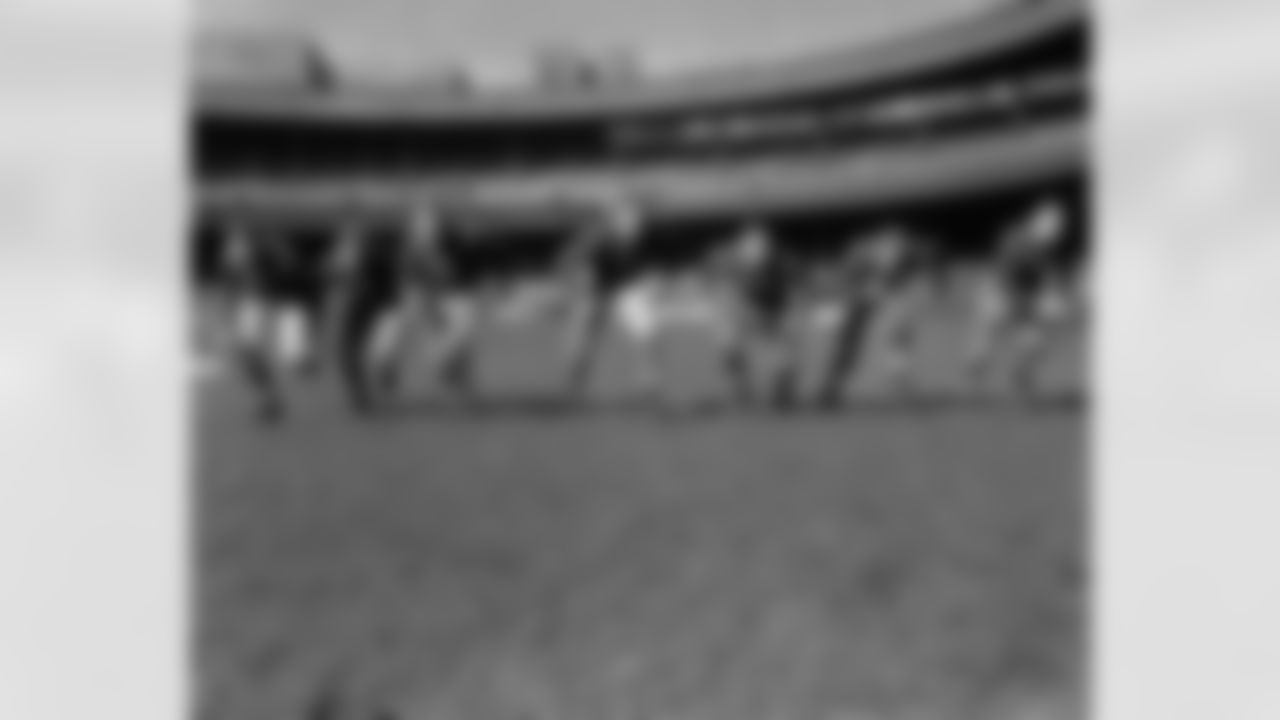
Lineman of the New York Giants football team as they work out at the Polo Grounds in New York City Nov. 9, 1938, in preparation for their game with the Cleveland Rams. Left to right are; Jim Howell, Jack Haden, John Dellisola, Mel Hien, Orville Tuttle, Ed Widseth and J. M. Poole. (AP Photo/Charles Kenneth Lucas)

New York Giants halfback Tuffy Leemans (4) runs into some Chicago Bear tacklers as he returns a punt for 15 yards in a game before 50,000 at the Polo Grounds in New York City, Oct. 31, 1937. The Giants and Bears played to a 3-3 tie. (AP Photo)
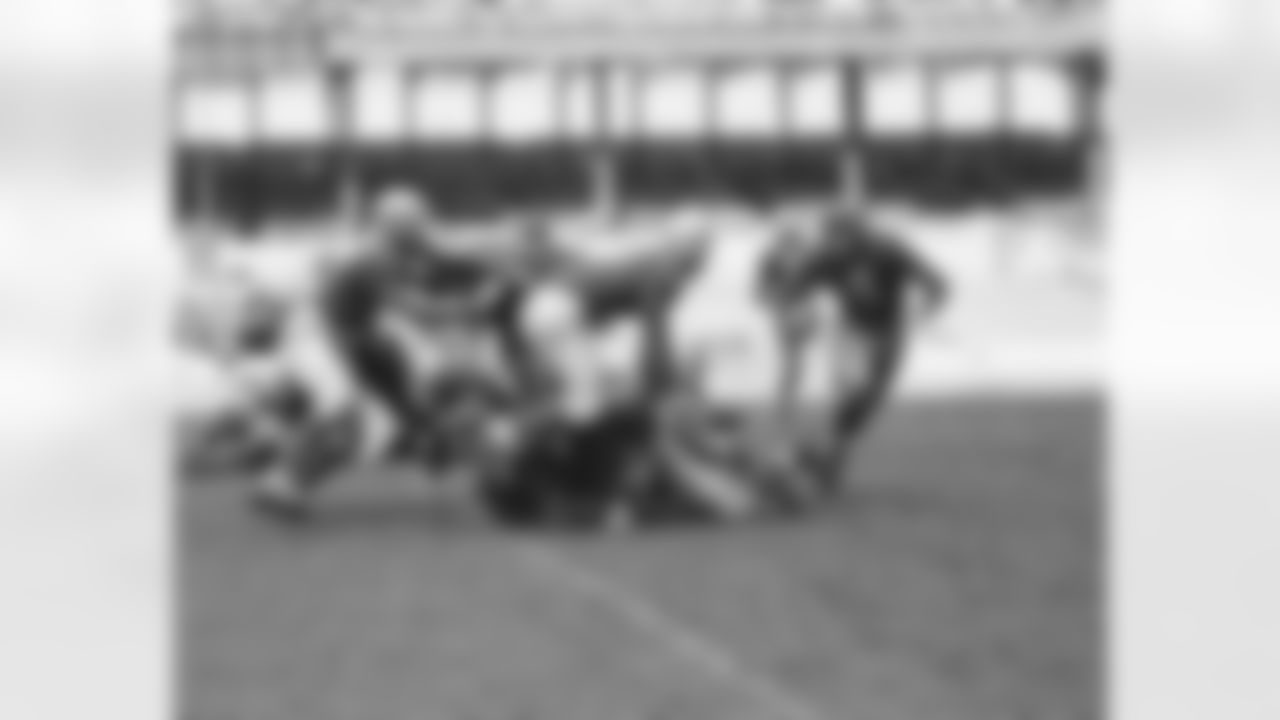
New York Giants halfback Tuffy Leemans breaks way for a four yard gain against the Brooklyn Dodgers football team in a game at the Polo Grounds in New York City Oct. 24, 1937. Giants won 21-0. (AP Photo)
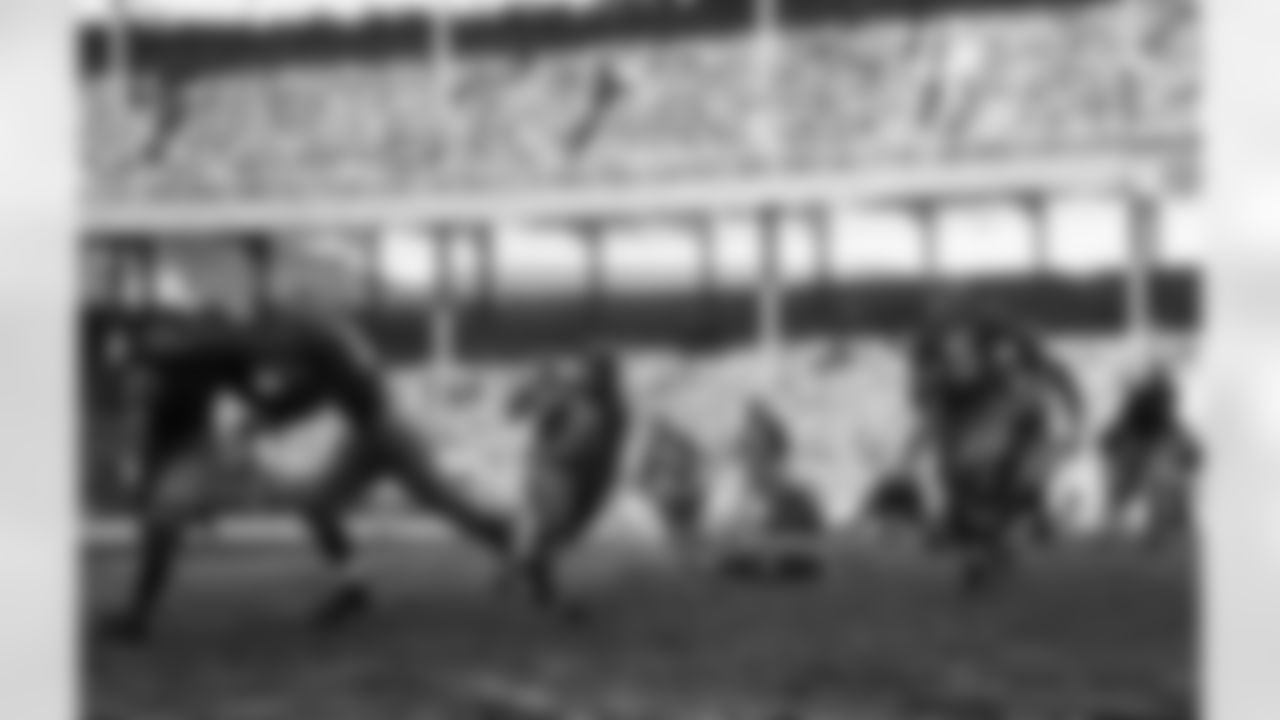
Chicago Bears back Beattie Feathers (48) is about to be tossed for loss by Giant Dale Burnett in game played on Oct. 31, 1937 at the Polo Grounds. Bears and Giants played to a 3-3 tie. (AP Photo)

Chicago Bears' Bernie Masterson (33) scores against the New York Giants in first period of their 1936 game at the Polo Grounds in New York , Nov. 8, 1936. Bears won, 25-7. (AP Photo)

Ward Cuff, New York Giants halfback, gets off a 42-yard goal against the Chicago Bears Oct. 31, 1937 at the Polo Grounds in New York City. The Bears and Giants played to a 3-3 tie. (AP Photo)
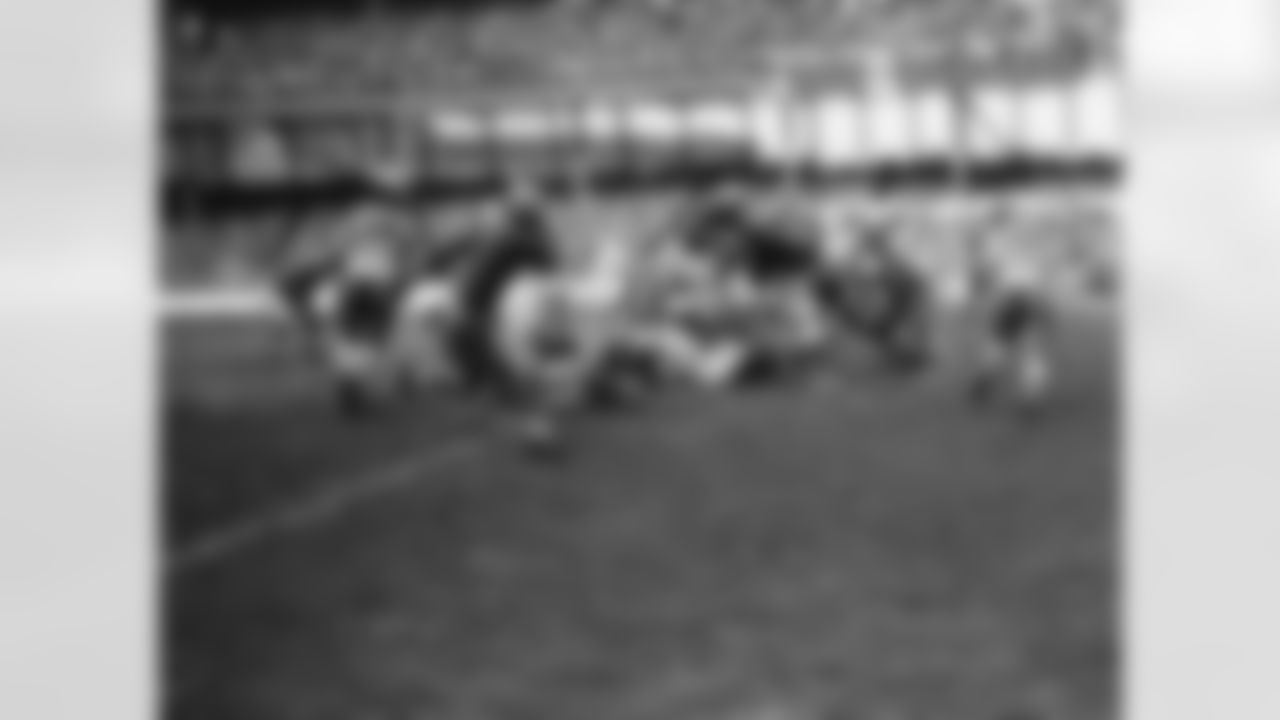
Detroit Lions fullback Ace Gutowsky hurdles over New York Giants line for 9 yard gain in game on Nov. 1, 1936 at the Polo Grounds. The Giants won, 14-7. (AP Photo)
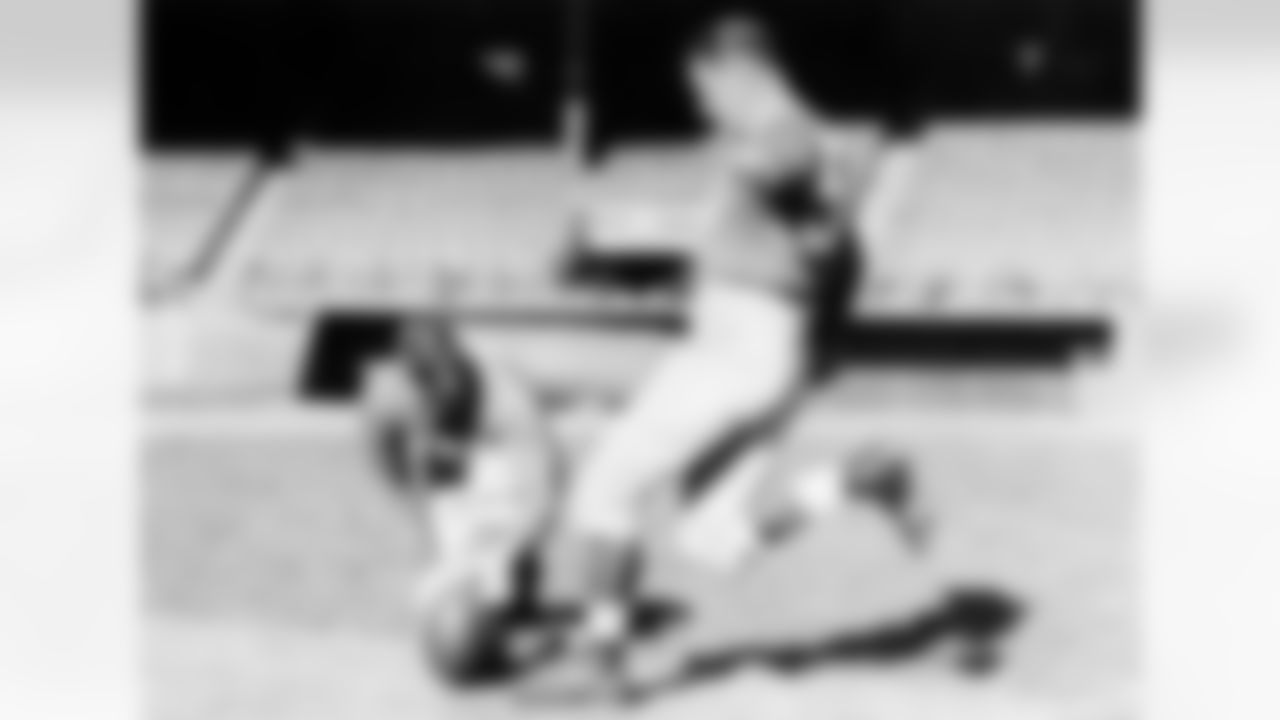
Ken Strong, star halfback of the New York Giants, punting at the Polo Grounds in New York, October 9, 1935. (AP Photo)

One of the nation's all-time top tackles, Arnie Weinmeister of the professional New York Giants, poses while waiting for an appointment in an office in Seattle, Jan. 22, 1954. (AP Photo/Ed Johnson)
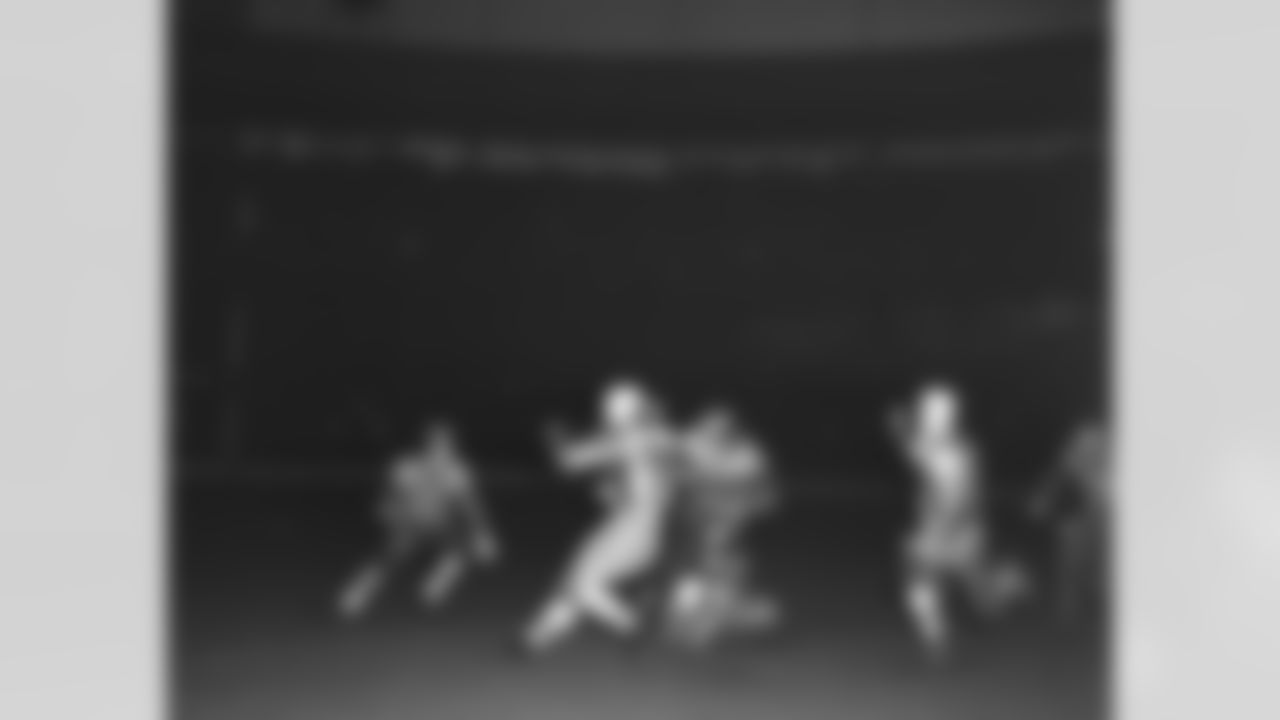
William Beattie "Big Chief" Feathers (48) of the Chicago Bears is off on an end run that resulted in no gain during a game against the New York Giants at the Polo Grounds in New York City Nov., 8, 1936. Number 3 of the Bears running interference is Bronislau "Bronko" Nagurski Bears. (AP Photo)

Benjamin Friedman of the New York Giants being stopped after making a ten yard gain against the Green Bay Packers Nov. 24, 1929 at the Polo Grounds in New York City. (AP Photo)
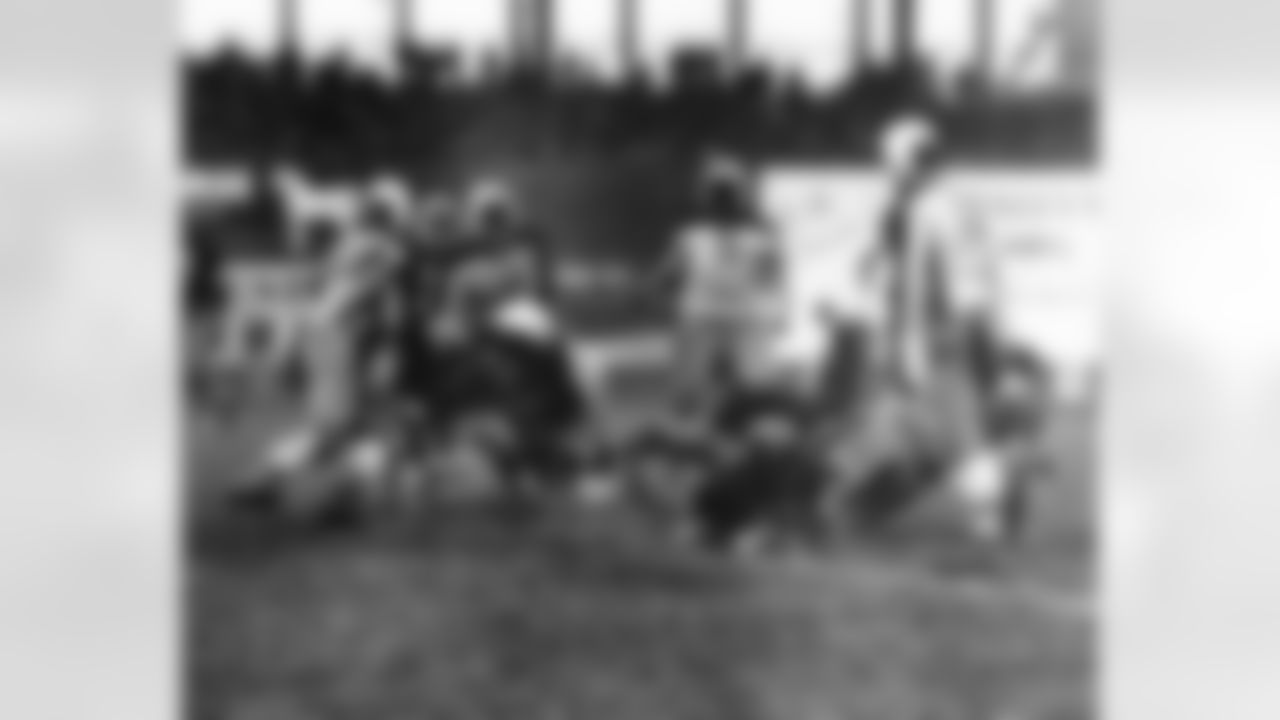
Ike Peterson, a back with the Chicago Cardinals who formerly played for Gonzaga, is shown carrying the ball through the line of the N.Y. Giants for a three-yard gain. The Chicago Pro team won, 14-13 on Oct. 27, 1935 in New York. When Ken Strong missed his first try-for-point in two years. On the above play, Peterson was stopped by Bernie Kaplan (55), formerly of Western Maryland, and Bill Owen (36), formerly of Oklahoma A & M. (AP Photo)

The Giants Foundation 5K & Kids Run
Bring your friends, family and neighbors out to run The Giants Foundation 5K Presented by Quest® on Sunday, October 26th and finish in the end zone at MetLife Stadium!














